BREXIT Impact on UK Recruitment Sector for Food Manufacturing/Production
VerifiedAdded on 2023/04/21
|65
|16700
|211
AI Summary
This study examines the impact of BREXIT on the recruitment sector in the UK, with a focus on the food manufacturing and production industry. It explores the factors influencing recruitment in the industry and aims to find ways to mitigate the negative impact. The research objectives include understanding the extent of the impact, identifying the reasons behind the impact, and gauging public opinion on the issue. The study follows a structured approach, including literature review, research methodology, data analysis, and conclusion with recommendations.
Contribute Materials
Your contribution can guide someone’s learning journey. Share your
documents today.
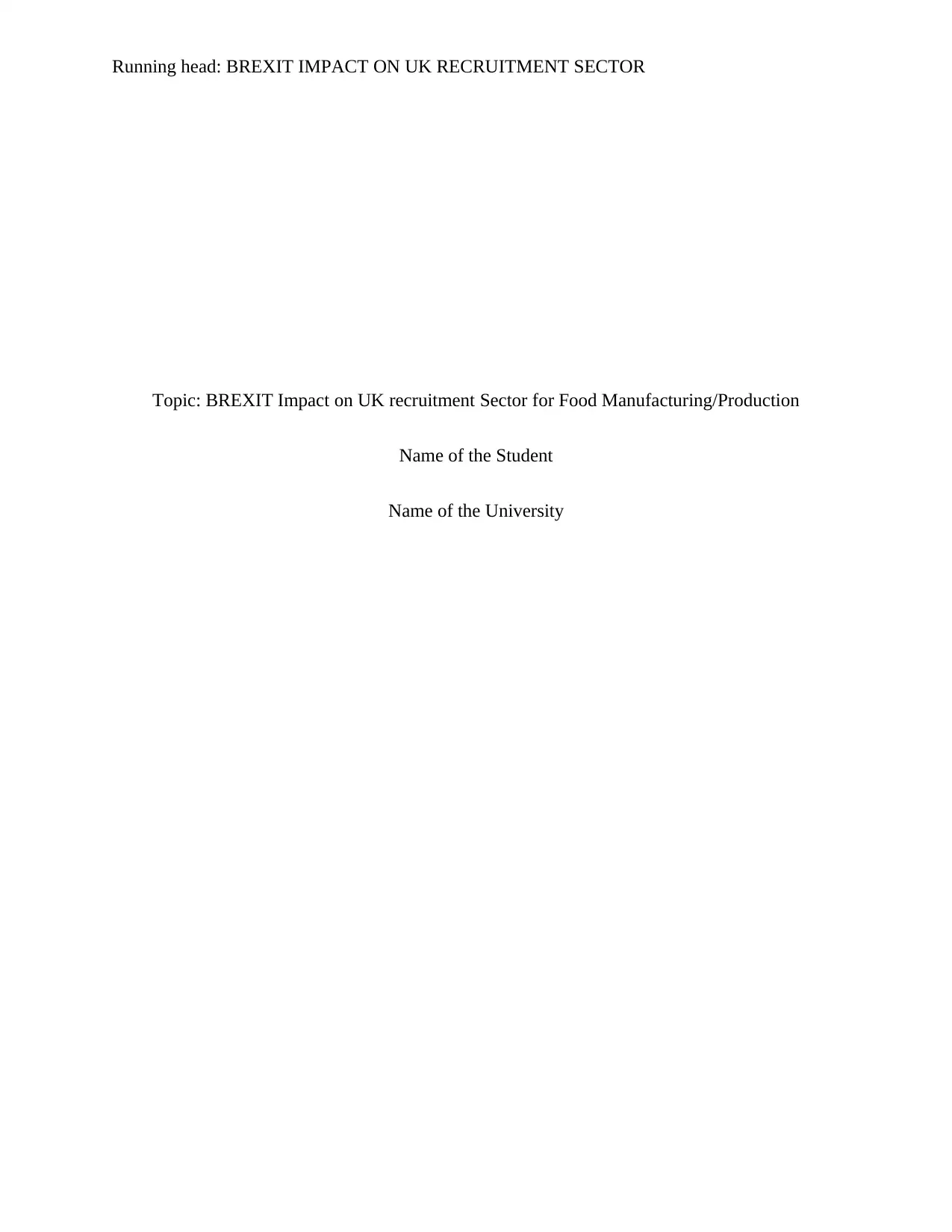
Running head: BREXIT IMPACT ON UK RECRUITMENT SECTOR
Topic: BREXIT Impact on UK recruitment Sector for Food Manufacturing/Production
Name of the Student
Name of the University
Topic: BREXIT Impact on UK recruitment Sector for Food Manufacturing/Production
Name of the Student
Name of the University
Secure Best Marks with AI Grader
Need help grading? Try our AI Grader for instant feedback on your assignments.
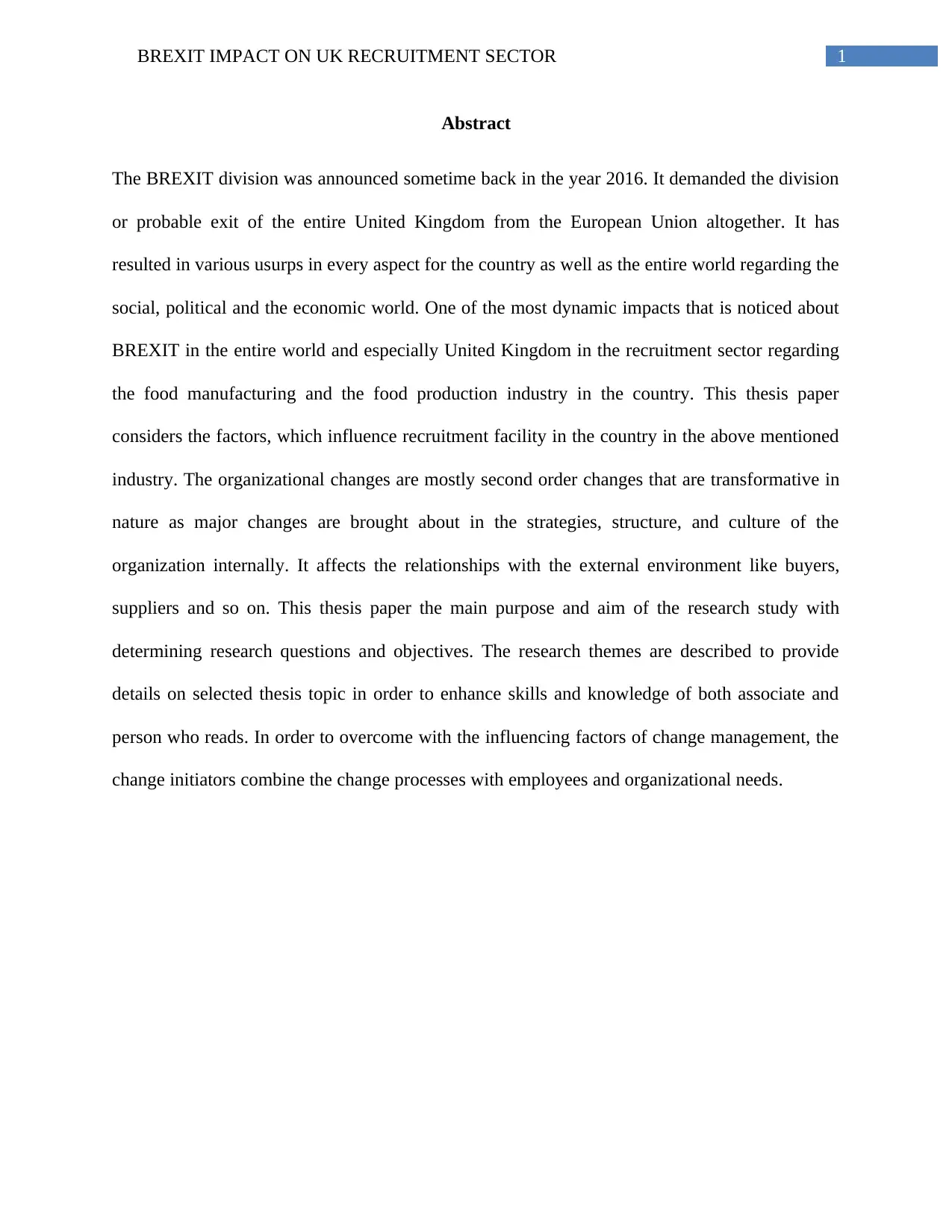
1BREXIT IMPACT ON UK RECRUITMENT SECTOR
Abstract
The BREXIT division was announced sometime back in the year 2016. It demanded the division
or probable exit of the entire United Kingdom from the European Union altogether. It has
resulted in various usurps in every aspect for the country as well as the entire world regarding the
social, political and the economic world. One of the most dynamic impacts that is noticed about
BREXIT in the entire world and especially United Kingdom in the recruitment sector regarding
the food manufacturing and the food production industry in the country. This thesis paper
considers the factors, which influence recruitment facility in the country in the above mentioned
industry. The organizational changes are mostly second order changes that are transformative in
nature as major changes are brought about in the strategies, structure, and culture of the
organization internally. It affects the relationships with the external environment like buyers,
suppliers and so on. This thesis paper the main purpose and aim of the research study with
determining research questions and objectives. The research themes are described to provide
details on selected thesis topic in order to enhance skills and knowledge of both associate and
person who reads. In order to overcome with the influencing factors of change management, the
change initiators combine the change processes with employees and organizational needs.
Abstract
The BREXIT division was announced sometime back in the year 2016. It demanded the division
or probable exit of the entire United Kingdom from the European Union altogether. It has
resulted in various usurps in every aspect for the country as well as the entire world regarding the
social, political and the economic world. One of the most dynamic impacts that is noticed about
BREXIT in the entire world and especially United Kingdom in the recruitment sector regarding
the food manufacturing and the food production industry in the country. This thesis paper
considers the factors, which influence recruitment facility in the country in the above mentioned
industry. The organizational changes are mostly second order changes that are transformative in
nature as major changes are brought about in the strategies, structure, and culture of the
organization internally. It affects the relationships with the external environment like buyers,
suppliers and so on. This thesis paper the main purpose and aim of the research study with
determining research questions and objectives. The research themes are described to provide
details on selected thesis topic in order to enhance skills and knowledge of both associate and
person who reads. In order to overcome with the influencing factors of change management, the
change initiators combine the change processes with employees and organizational needs.

BREXIT IMPACT ON UK RECRUITMENT SECTOR
Acknowledgement
Conducting this research has been one of the most enriching experiences of my life. The
contribution of this research to enhance my knowledge base and analytical skill has been
paramount. It gave me the opportunity to face challenges in the process and overcome them. This
would not have been possible without the valuable guidance of my professors, peers and all the
people who have contributed to this enriching experience. I would like to take this opportunity to
thank my supervisor _________________________ for the constant guidance and support
provided to me during the process of this research. It would not be justified if I did not thank my
academic guides for their important and valuable assistance and encouragement throughout the
research process. I would also like to thank my friends who had provided me with help and
encouragement for collecting primary data and valuable resources. The support of all these
people has been inspiring and enlightening throughout the process of research in the subject.
Heartfelt thanks and warmest wishes,
Yours Sincerely,
Acknowledgement
Conducting this research has been one of the most enriching experiences of my life. The
contribution of this research to enhance my knowledge base and analytical skill has been
paramount. It gave me the opportunity to face challenges in the process and overcome them. This
would not have been possible without the valuable guidance of my professors, peers and all the
people who have contributed to this enriching experience. I would like to take this opportunity to
thank my supervisor _________________________ for the constant guidance and support
provided to me during the process of this research. It would not be justified if I did not thank my
academic guides for their important and valuable assistance and encouragement throughout the
research process. I would also like to thank my friends who had provided me with help and
encouragement for collecting primary data and valuable resources. The support of all these
people has been inspiring and enlightening throughout the process of research in the subject.
Heartfelt thanks and warmest wishes,
Yours Sincerely,
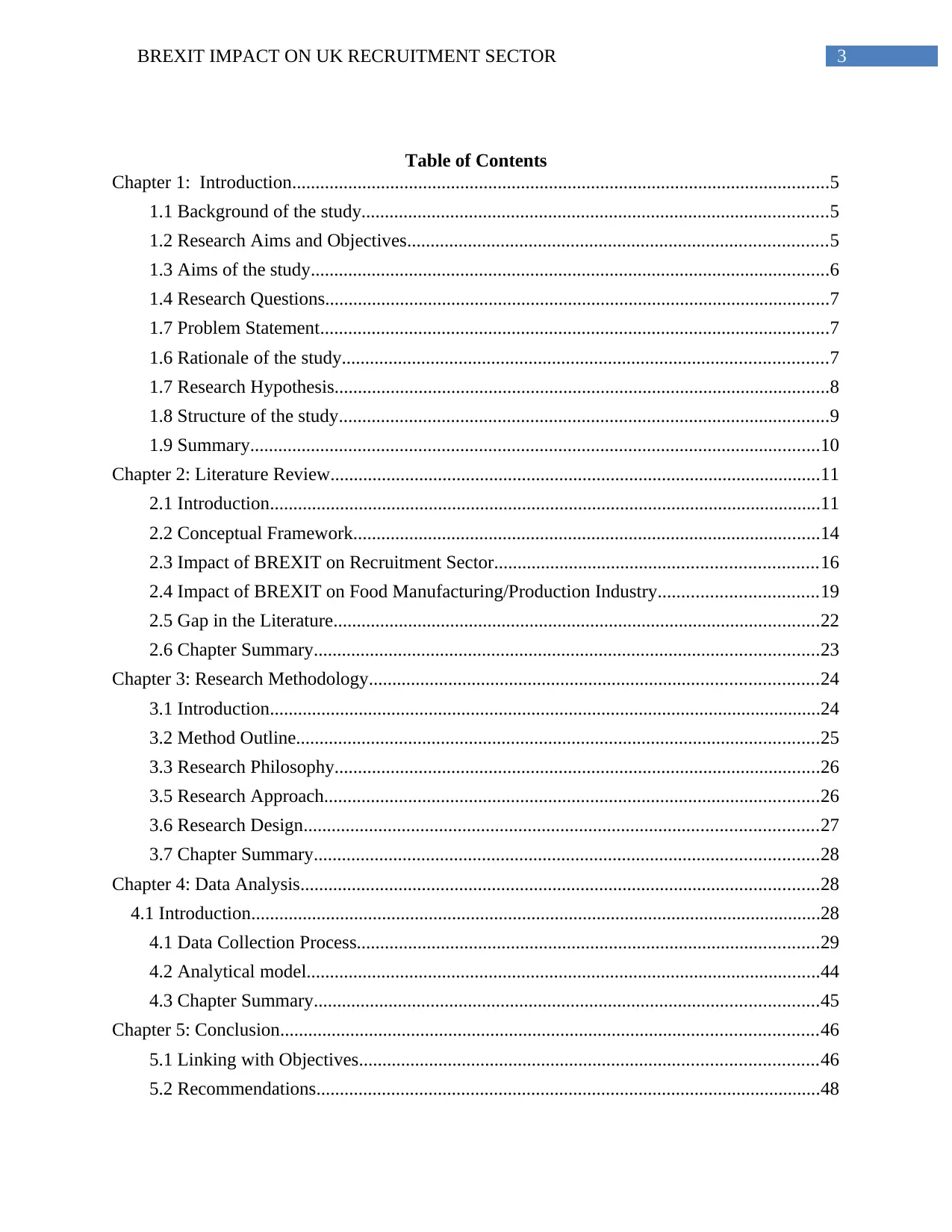
3BREXIT IMPACT ON UK RECRUITMENT SECTOR
Table of Contents
Chapter 1: Introduction...................................................................................................................5
1.1 Background of the study....................................................................................................5
1.2 Research Aims and Objectives..........................................................................................5
1.3 Aims of the study...............................................................................................................6
1.4 Research Questions............................................................................................................7
1.7 Problem Statement.............................................................................................................7
1.6 Rationale of the study........................................................................................................7
1.7 Research Hypothesis..........................................................................................................8
1.8 Structure of the study.........................................................................................................9
1.9 Summary..........................................................................................................................10
Chapter 2: Literature Review.........................................................................................................11
2.1 Introduction......................................................................................................................11
2.2 Conceptual Framework....................................................................................................14
2.3 Impact of BREXIT on Recruitment Sector.....................................................................16
2.4 Impact of BREXIT on Food Manufacturing/Production Industry..................................19
2.5 Gap in the Literature........................................................................................................22
2.6 Chapter Summary............................................................................................................23
Chapter 3: Research Methodology................................................................................................24
3.1 Introduction......................................................................................................................24
3.2 Method Outline................................................................................................................25
3.3 Research Philosophy........................................................................................................26
3.5 Research Approach..........................................................................................................26
3.6 Research Design..............................................................................................................27
3.7 Chapter Summary............................................................................................................28
Chapter 4: Data Analysis...............................................................................................................28
4.1 Introduction..........................................................................................................................28
4.1 Data Collection Process...................................................................................................29
4.2 Analytical model..............................................................................................................44
4.3 Chapter Summary............................................................................................................45
Chapter 5: Conclusion...................................................................................................................46
5.1 Linking with Objectives..................................................................................................46
5.2 Recommendations............................................................................................................48
Table of Contents
Chapter 1: Introduction...................................................................................................................5
1.1 Background of the study....................................................................................................5
1.2 Research Aims and Objectives..........................................................................................5
1.3 Aims of the study...............................................................................................................6
1.4 Research Questions............................................................................................................7
1.7 Problem Statement.............................................................................................................7
1.6 Rationale of the study........................................................................................................7
1.7 Research Hypothesis..........................................................................................................8
1.8 Structure of the study.........................................................................................................9
1.9 Summary..........................................................................................................................10
Chapter 2: Literature Review.........................................................................................................11
2.1 Introduction......................................................................................................................11
2.2 Conceptual Framework....................................................................................................14
2.3 Impact of BREXIT on Recruitment Sector.....................................................................16
2.4 Impact of BREXIT on Food Manufacturing/Production Industry..................................19
2.5 Gap in the Literature........................................................................................................22
2.6 Chapter Summary............................................................................................................23
Chapter 3: Research Methodology................................................................................................24
3.1 Introduction......................................................................................................................24
3.2 Method Outline................................................................................................................25
3.3 Research Philosophy........................................................................................................26
3.5 Research Approach..........................................................................................................26
3.6 Research Design..............................................................................................................27
3.7 Chapter Summary............................................................................................................28
Chapter 4: Data Analysis...............................................................................................................28
4.1 Introduction..........................................................................................................................28
4.1 Data Collection Process...................................................................................................29
4.2 Analytical model..............................................................................................................44
4.3 Chapter Summary............................................................................................................45
Chapter 5: Conclusion...................................................................................................................46
5.1 Linking with Objectives..................................................................................................46
5.2 Recommendations............................................................................................................48
Secure Best Marks with AI Grader
Need help grading? Try our AI Grader for instant feedback on your assignments.
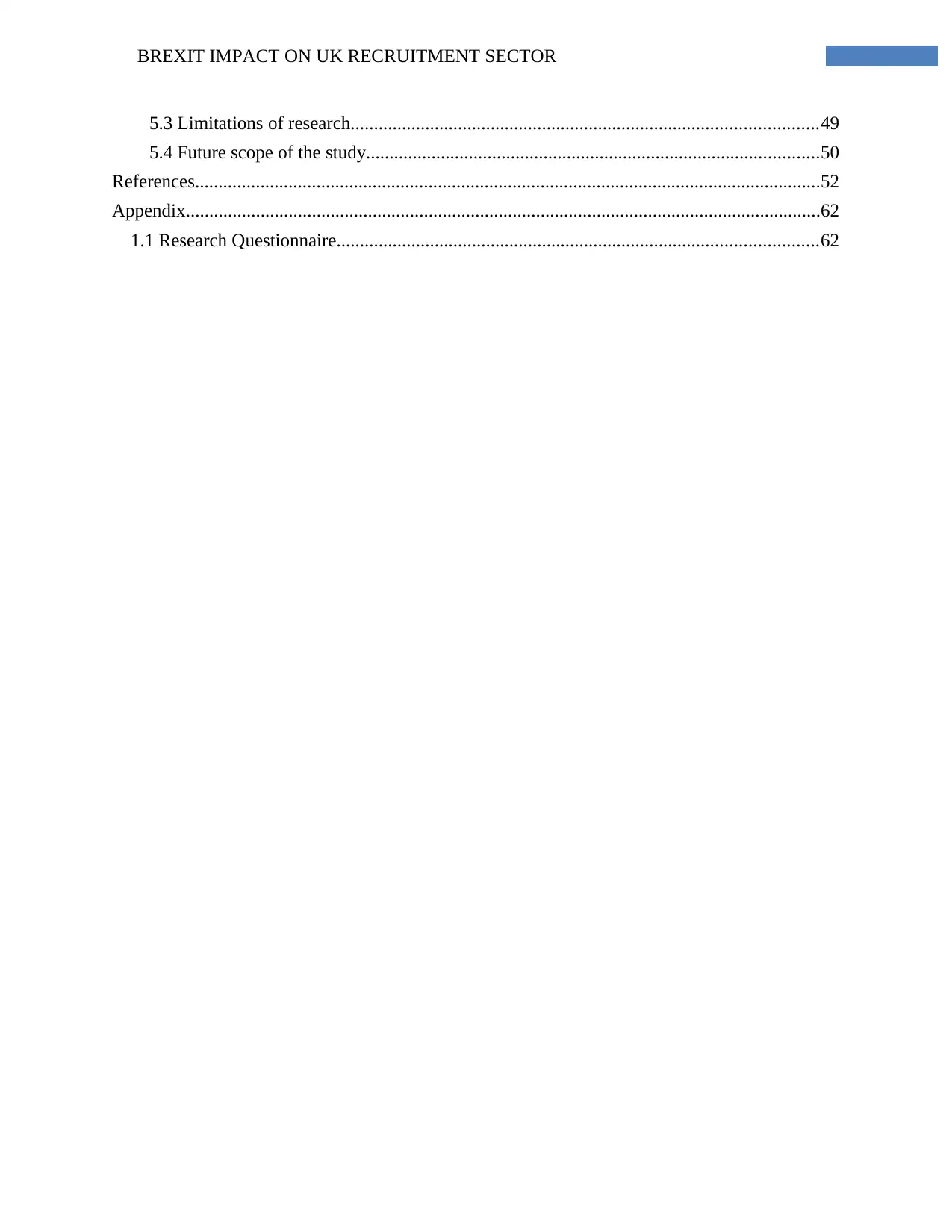
BREXIT IMPACT ON UK RECRUITMENT SECTOR
5.3 Limitations of research....................................................................................................49
5.4 Future scope of the study.................................................................................................50
References......................................................................................................................................52
Appendix........................................................................................................................................62
1.1 Research Questionnaire.......................................................................................................62
5.3 Limitations of research....................................................................................................49
5.4 Future scope of the study.................................................................................................50
References......................................................................................................................................52
Appendix........................................................................................................................................62
1.1 Research Questionnaire.......................................................................................................62
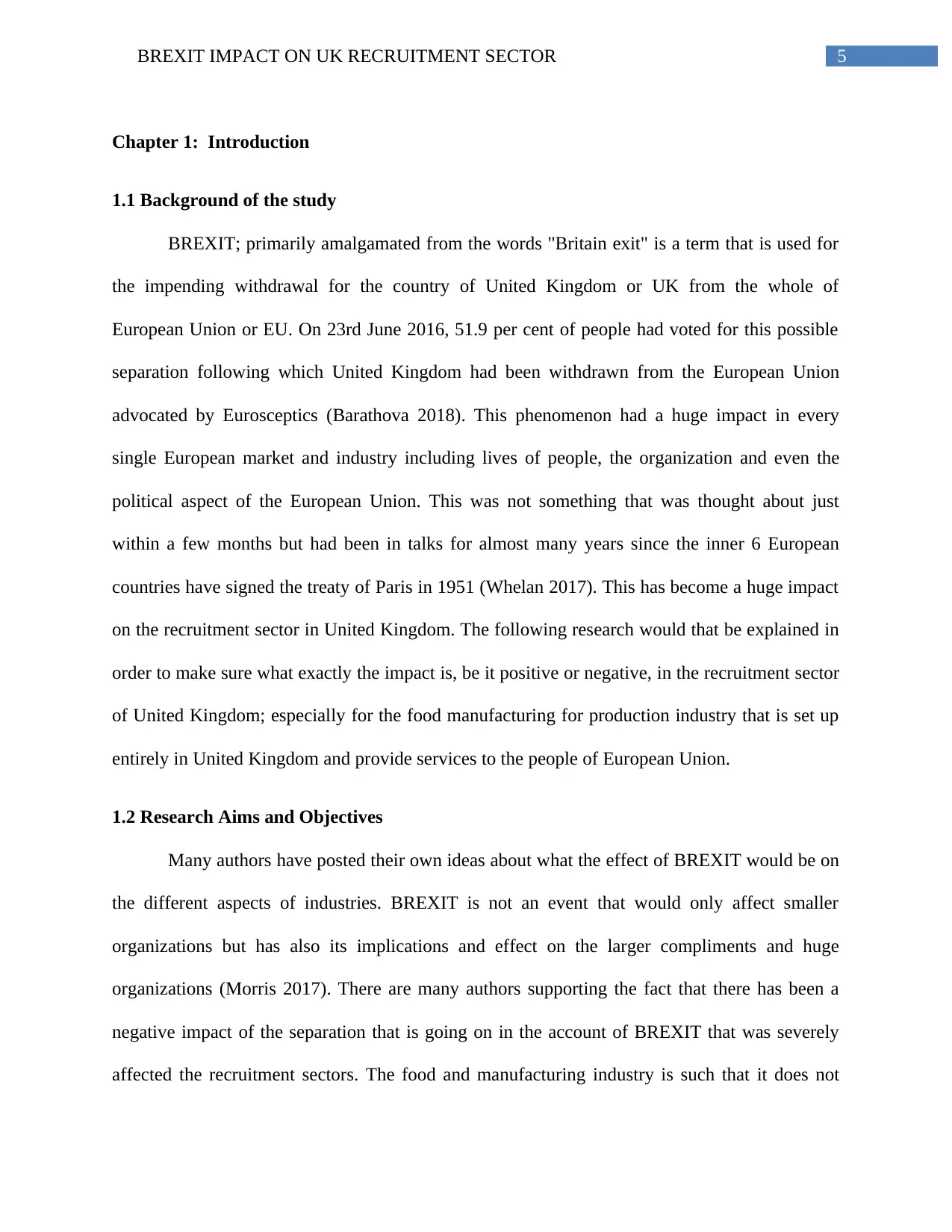
5BREXIT IMPACT ON UK RECRUITMENT SECTOR
Chapter 1: Introduction
1.1 Background of the study
BREXIT; primarily amalgamated from the words "Britain exit" is a term that is used for
the impending withdrawal for the country of United Kingdom or UK from the whole of
European Union or EU. On 23rd June 2016, 51.9 per cent of people had voted for this possible
separation following which United Kingdom had been withdrawn from the European Union
advocated by Eurosceptics (Barathova 2018). This phenomenon had a huge impact in every
single European market and industry including lives of people, the organization and even the
political aspect of the European Union. This was not something that was thought about just
within a few months but had been in talks for almost many years since the inner 6 European
countries have signed the treaty of Paris in 1951 (Whelan 2017). This has become a huge impact
on the recruitment sector in United Kingdom. The following research would that be explained in
order to make sure what exactly the impact is, be it positive or negative, in the recruitment sector
of United Kingdom; especially for the food manufacturing for production industry that is set up
entirely in United Kingdom and provide services to the people of European Union.
1.2 Research Aims and Objectives
Many authors have posted their own ideas about what the effect of BREXIT would be on
the different aspects of industries. BREXIT is not an event that would only affect smaller
organizations but has also its implications and effect on the larger compliments and huge
organizations (Morris 2017). There are many authors supporting the fact that there has been a
negative impact of the separation that is going on in the account of BREXIT that was severely
affected the recruitment sectors. The food and manufacturing industry is such that it does not
Chapter 1: Introduction
1.1 Background of the study
BREXIT; primarily amalgamated from the words "Britain exit" is a term that is used for
the impending withdrawal for the country of United Kingdom or UK from the whole of
European Union or EU. On 23rd June 2016, 51.9 per cent of people had voted for this possible
separation following which United Kingdom had been withdrawn from the European Union
advocated by Eurosceptics (Barathova 2018). This phenomenon had a huge impact in every
single European market and industry including lives of people, the organization and even the
political aspect of the European Union. This was not something that was thought about just
within a few months but had been in talks for almost many years since the inner 6 European
countries have signed the treaty of Paris in 1951 (Whelan 2017). This has become a huge impact
on the recruitment sector in United Kingdom. The following research would that be explained in
order to make sure what exactly the impact is, be it positive or negative, in the recruitment sector
of United Kingdom; especially for the food manufacturing for production industry that is set up
entirely in United Kingdom and provide services to the people of European Union.
1.2 Research Aims and Objectives
Many authors have posted their own ideas about what the effect of BREXIT would be on
the different aspects of industries. BREXIT is not an event that would only affect smaller
organizations but has also its implications and effect on the larger compliments and huge
organizations (Morris 2017). There are many authors supporting the fact that there has been a
negative impact of the separation that is going on in the account of BREXIT that was severely
affected the recruitment sectors. The food and manufacturing industry is such that it does not
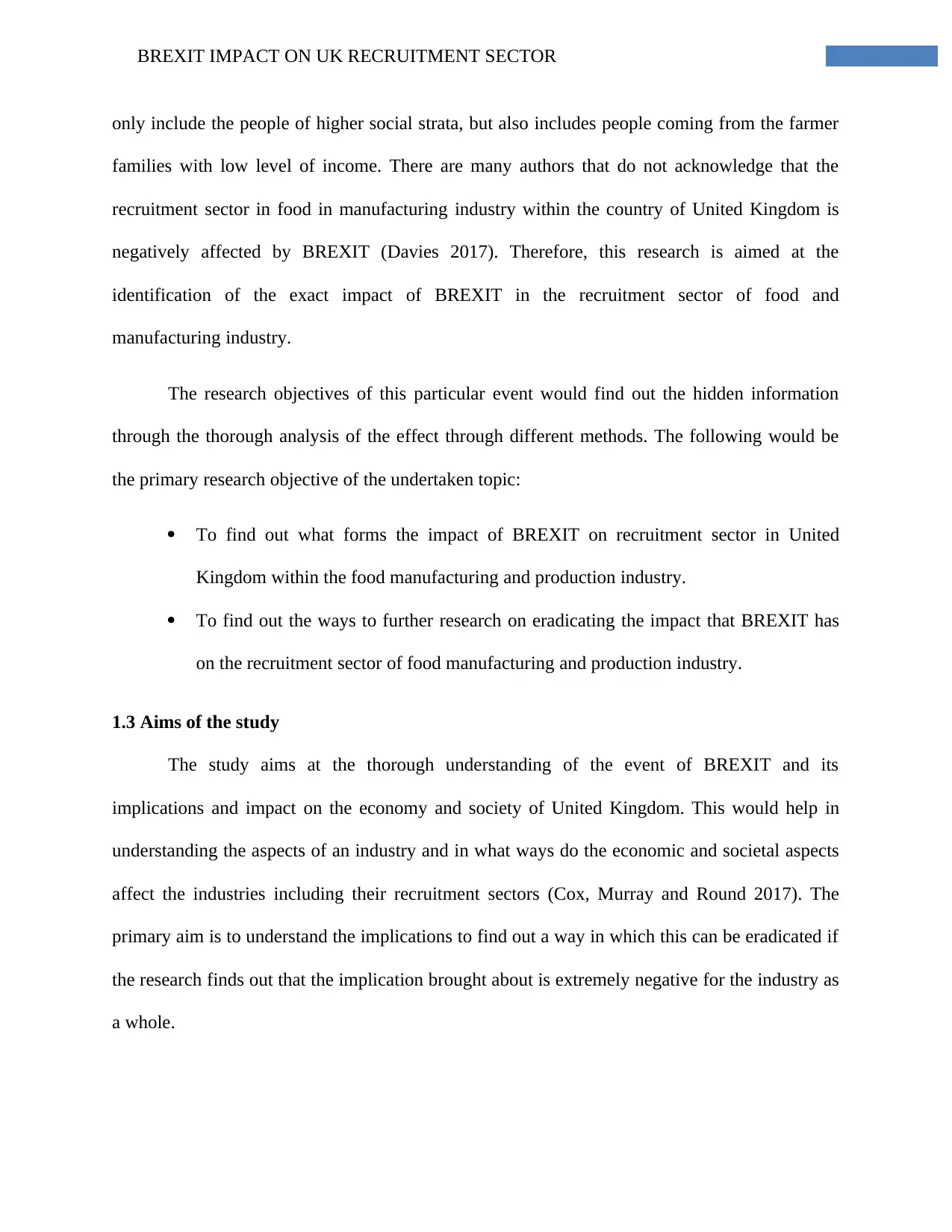
BREXIT IMPACT ON UK RECRUITMENT SECTOR
only include the people of higher social strata, but also includes people coming from the farmer
families with low level of income. There are many authors that do not acknowledge that the
recruitment sector in food in manufacturing industry within the country of United Kingdom is
negatively affected by BREXIT (Davies 2017). Therefore, this research is aimed at the
identification of the exact impact of BREXIT in the recruitment sector of food and
manufacturing industry.
The research objectives of this particular event would find out the hidden information
through the thorough analysis of the effect through different methods. The following would be
the primary research objective of the undertaken topic:
To find out what forms the impact of BREXIT on recruitment sector in United
Kingdom within the food manufacturing and production industry.
To find out the ways to further research on eradicating the impact that BREXIT has
on the recruitment sector of food manufacturing and production industry.
1.3 Aims of the study
The study aims at the thorough understanding of the event of BREXIT and its
implications and impact on the economy and society of United Kingdom. This would help in
understanding the aspects of an industry and in what ways do the economic and societal aspects
affect the industries including their recruitment sectors (Cox, Murray and Round 2017). The
primary aim is to understand the implications to find out a way in which this can be eradicated if
the research finds out that the implication brought about is extremely negative for the industry as
a whole.
only include the people of higher social strata, but also includes people coming from the farmer
families with low level of income. There are many authors that do not acknowledge that the
recruitment sector in food in manufacturing industry within the country of United Kingdom is
negatively affected by BREXIT (Davies 2017). Therefore, this research is aimed at the
identification of the exact impact of BREXIT in the recruitment sector of food and
manufacturing industry.
The research objectives of this particular event would find out the hidden information
through the thorough analysis of the effect through different methods. The following would be
the primary research objective of the undertaken topic:
To find out what forms the impact of BREXIT on recruitment sector in United
Kingdom within the food manufacturing and production industry.
To find out the ways to further research on eradicating the impact that BREXIT has
on the recruitment sector of food manufacturing and production industry.
1.3 Aims of the study
The study aims at the thorough understanding of the event of BREXIT and its
implications and impact on the economy and society of United Kingdom. This would help in
understanding the aspects of an industry and in what ways do the economic and societal aspects
affect the industries including their recruitment sectors (Cox, Murray and Round 2017). The
primary aim is to understand the implications to find out a way in which this can be eradicated if
the research finds out that the implication brought about is extremely negative for the industry as
a whole.
Paraphrase This Document
Need a fresh take? Get an instant paraphrase of this document with our AI Paraphraser
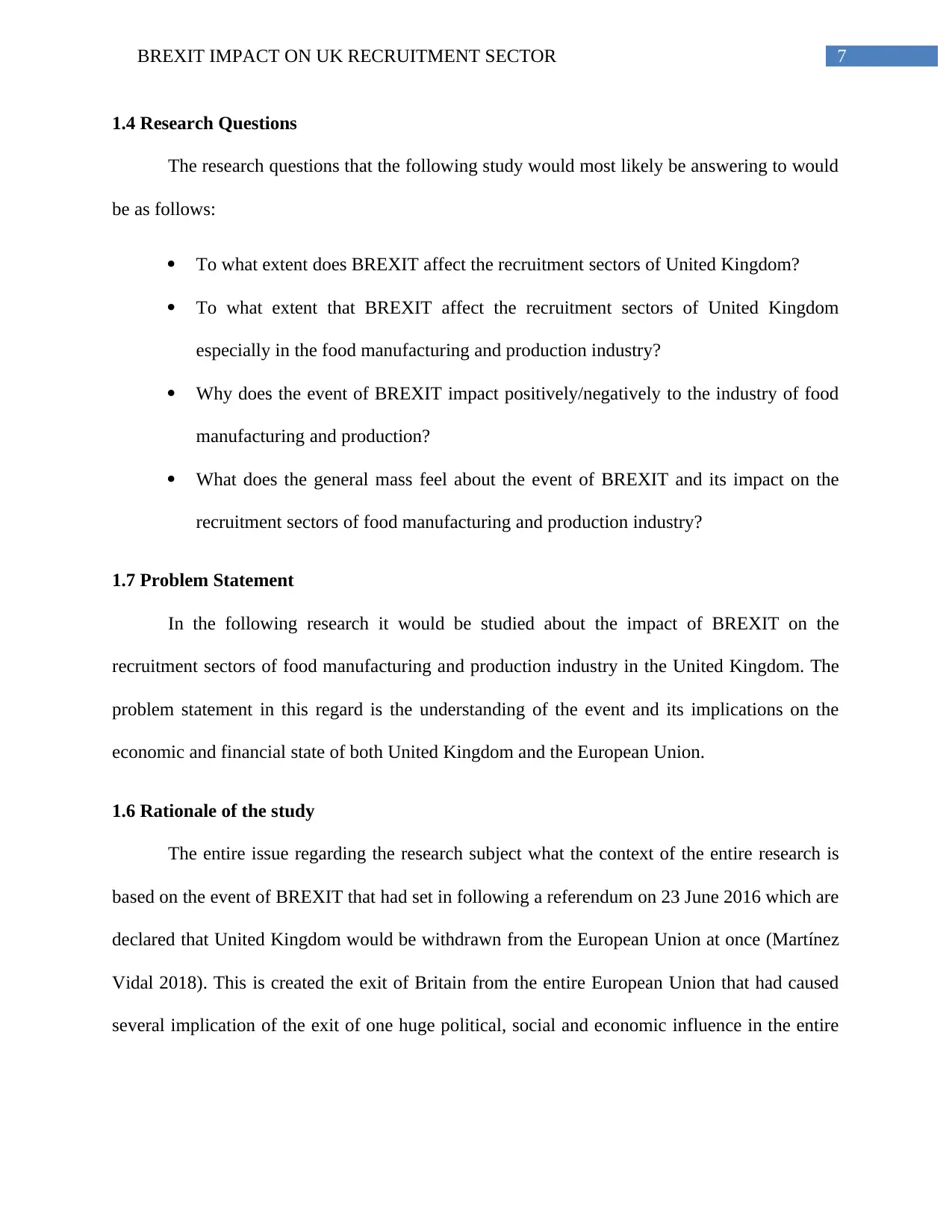
7BREXIT IMPACT ON UK RECRUITMENT SECTOR
1.4 Research Questions
The research questions that the following study would most likely be answering to would
be as follows:
To what extent does BREXIT affect the recruitment sectors of United Kingdom?
To what extent that BREXIT affect the recruitment sectors of United Kingdom
especially in the food manufacturing and production industry?
Why does the event of BREXIT impact positively/negatively to the industry of food
manufacturing and production?
What does the general mass feel about the event of BREXIT and its impact on the
recruitment sectors of food manufacturing and production industry?
1.7 Problem Statement
In the following research it would be studied about the impact of BREXIT on the
recruitment sectors of food manufacturing and production industry in the United Kingdom. The
problem statement in this regard is the understanding of the event and its implications on the
economic and financial state of both United Kingdom and the European Union.
1.6 Rationale of the study
The entire issue regarding the research subject what the context of the entire research is
based on the event of BREXIT that had set in following a referendum on 23 June 2016 which are
declared that United Kingdom would be withdrawn from the European Union at once (Martínez
Vidal 2018). This is created the exit of Britain from the entire European Union that had caused
several implication of the exit of one huge political, social and economic influence in the entire
1.4 Research Questions
The research questions that the following study would most likely be answering to would
be as follows:
To what extent does BREXIT affect the recruitment sectors of United Kingdom?
To what extent that BREXIT affect the recruitment sectors of United Kingdom
especially in the food manufacturing and production industry?
Why does the event of BREXIT impact positively/negatively to the industry of food
manufacturing and production?
What does the general mass feel about the event of BREXIT and its impact on the
recruitment sectors of food manufacturing and production industry?
1.7 Problem Statement
In the following research it would be studied about the impact of BREXIT on the
recruitment sectors of food manufacturing and production industry in the United Kingdom. The
problem statement in this regard is the understanding of the event and its implications on the
economic and financial state of both United Kingdom and the European Union.
1.6 Rationale of the study
The entire issue regarding the research subject what the context of the entire research is
based on the event of BREXIT that had set in following a referendum on 23 June 2016 which are
declared that United Kingdom would be withdrawn from the European Union at once (Martínez
Vidal 2018). This is created the exit of Britain from the entire European Union that had caused
several implication of the exit of one huge political, social and economic influence in the entire
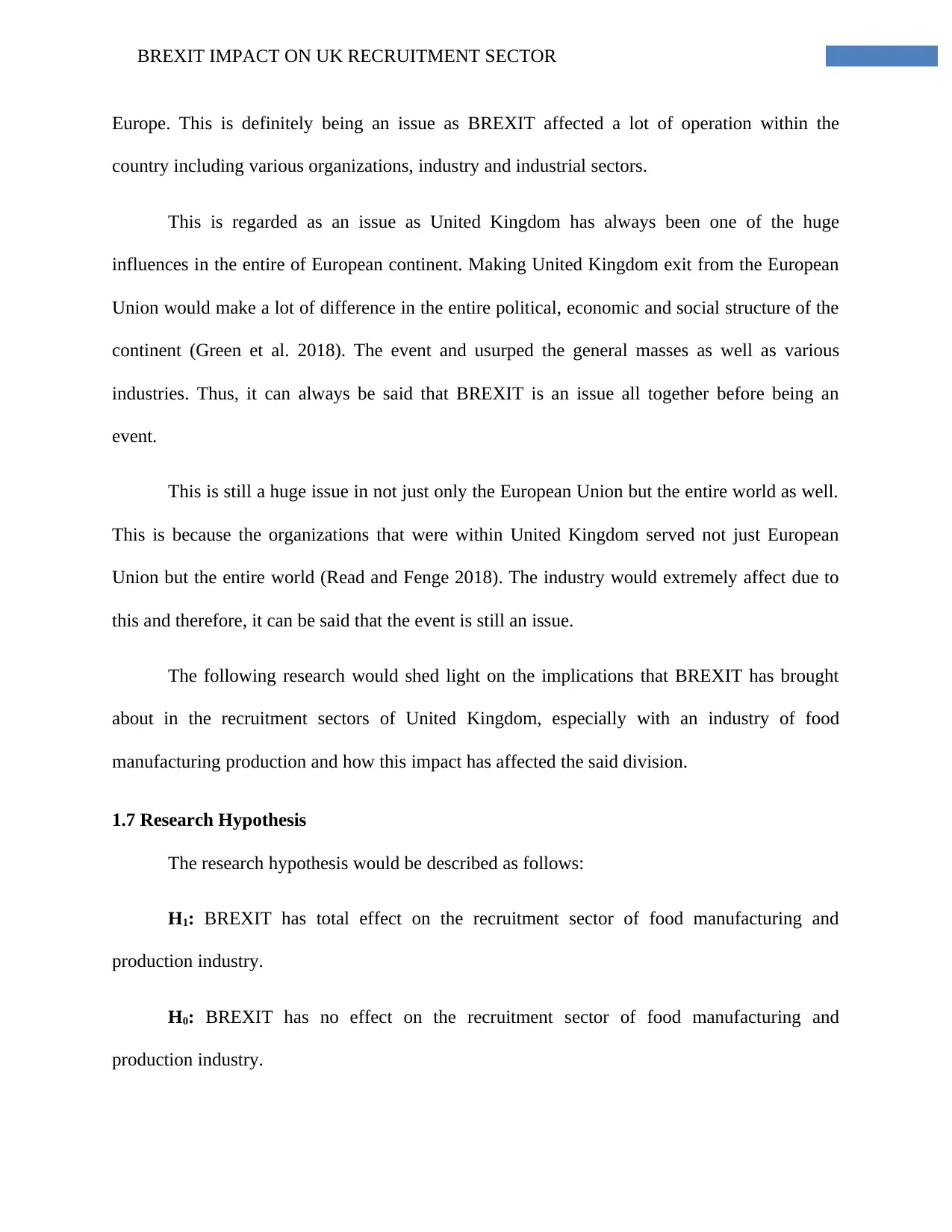
BREXIT IMPACT ON UK RECRUITMENT SECTOR
Europe. This is definitely being an issue as BREXIT affected a lot of operation within the
country including various organizations, industry and industrial sectors.
This is regarded as an issue as United Kingdom has always been one of the huge
influences in the entire of European continent. Making United Kingdom exit from the European
Union would make a lot of difference in the entire political, economic and social structure of the
continent (Green et al. 2018). The event and usurped the general masses as well as various
industries. Thus, it can always be said that BREXIT is an issue all together before being an
event.
This is still a huge issue in not just only the European Union but the entire world as well.
This is because the organizations that were within United Kingdom served not just European
Union but the entire world (Read and Fenge 2018). The industry would extremely affect due to
this and therefore, it can be said that the event is still an issue.
The following research would shed light on the implications that BREXIT has brought
about in the recruitment sectors of United Kingdom, especially with an industry of food
manufacturing production and how this impact has affected the said division.
1.7 Research Hypothesis
The research hypothesis would be described as follows:
H1: BREXIT has total effect on the recruitment sector of food manufacturing and
production industry.
H0: BREXIT has no effect on the recruitment sector of food manufacturing and
production industry.
Europe. This is definitely being an issue as BREXIT affected a lot of operation within the
country including various organizations, industry and industrial sectors.
This is regarded as an issue as United Kingdom has always been one of the huge
influences in the entire of European continent. Making United Kingdom exit from the European
Union would make a lot of difference in the entire political, economic and social structure of the
continent (Green et al. 2018). The event and usurped the general masses as well as various
industries. Thus, it can always be said that BREXIT is an issue all together before being an
event.
This is still a huge issue in not just only the European Union but the entire world as well.
This is because the organizations that were within United Kingdom served not just European
Union but the entire world (Read and Fenge 2018). The industry would extremely affect due to
this and therefore, it can be said that the event is still an issue.
The following research would shed light on the implications that BREXIT has brought
about in the recruitment sectors of United Kingdom, especially with an industry of food
manufacturing production and how this impact has affected the said division.
1.7 Research Hypothesis
The research hypothesis would be described as follows:
H1: BREXIT has total effect on the recruitment sector of food manufacturing and
production industry.
H0: BREXIT has no effect on the recruitment sector of food manufacturing and
production industry.
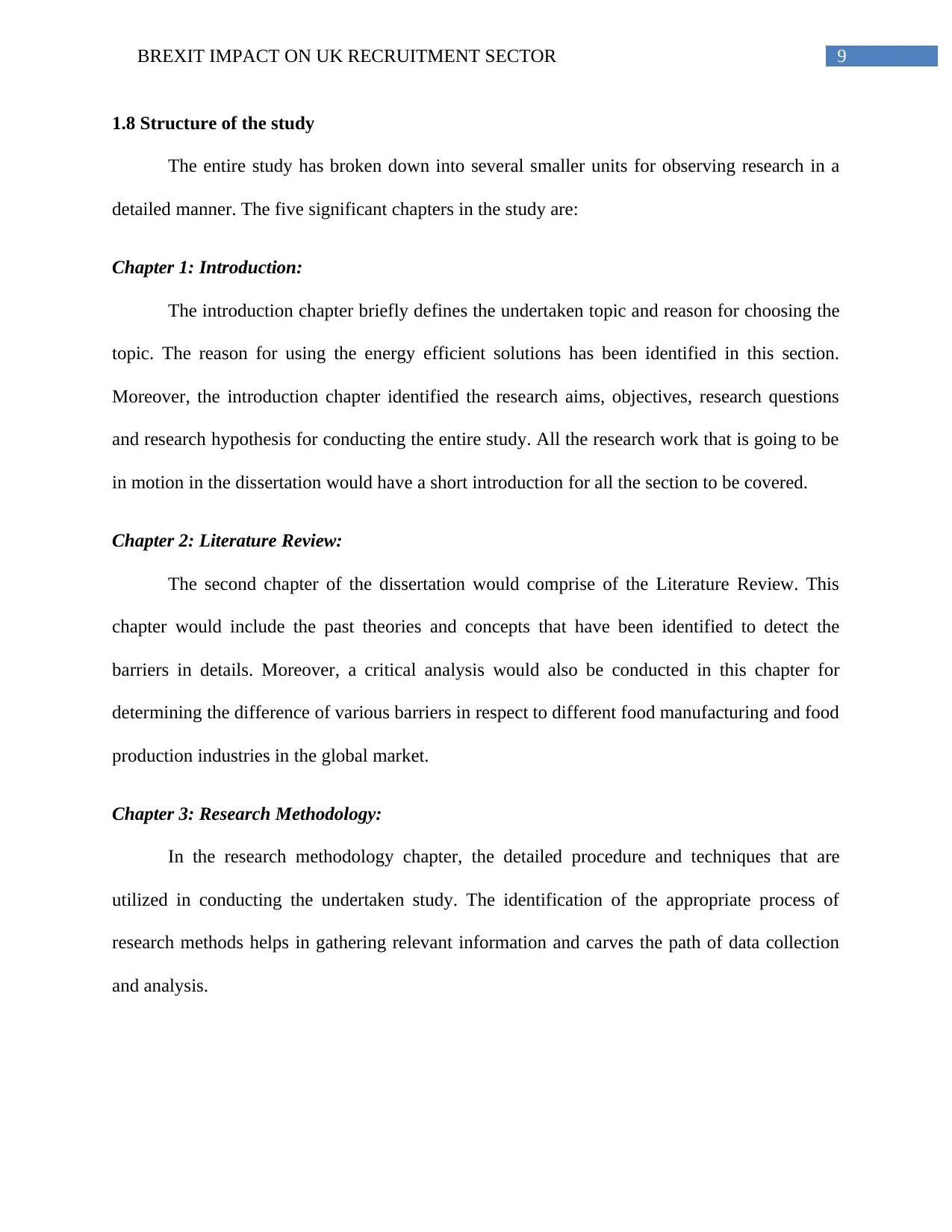
9BREXIT IMPACT ON UK RECRUITMENT SECTOR
1.8 Structure of the study
The entire study has broken down into several smaller units for observing research in a
detailed manner. The five significant chapters in the study are:
Chapter 1: Introduction:
The introduction chapter briefly defines the undertaken topic and reason for choosing the
topic. The reason for using the energy efficient solutions has been identified in this section.
Moreover, the introduction chapter identified the research aims, objectives, research questions
and research hypothesis for conducting the entire study. All the research work that is going to be
in motion in the dissertation would have a short introduction for all the section to be covered.
Chapter 2: Literature Review:
The second chapter of the dissertation would comprise of the Literature Review. This
chapter would include the past theories and concepts that have been identified to detect the
barriers in details. Moreover, a critical analysis would also be conducted in this chapter for
determining the difference of various barriers in respect to different food manufacturing and food
production industries in the global market.
Chapter 3: Research Methodology:
In the research methodology chapter, the detailed procedure and techniques that are
utilized in conducting the undertaken study. The identification of the appropriate process of
research methods helps in gathering relevant information and carves the path of data collection
and analysis.
1.8 Structure of the study
The entire study has broken down into several smaller units for observing research in a
detailed manner. The five significant chapters in the study are:
Chapter 1: Introduction:
The introduction chapter briefly defines the undertaken topic and reason for choosing the
topic. The reason for using the energy efficient solutions has been identified in this section.
Moreover, the introduction chapter identified the research aims, objectives, research questions
and research hypothesis for conducting the entire study. All the research work that is going to be
in motion in the dissertation would have a short introduction for all the section to be covered.
Chapter 2: Literature Review:
The second chapter of the dissertation would comprise of the Literature Review. This
chapter would include the past theories and concepts that have been identified to detect the
barriers in details. Moreover, a critical analysis would also be conducted in this chapter for
determining the difference of various barriers in respect to different food manufacturing and food
production industries in the global market.
Chapter 3: Research Methodology:
In the research methodology chapter, the detailed procedure and techniques that are
utilized in conducting the undertaken study. The identification of the appropriate process of
research methods helps in gathering relevant information and carves the path of data collection
and analysis.
Secure Best Marks with AI Grader
Need help grading? Try our AI Grader for instant feedback on your assignments.
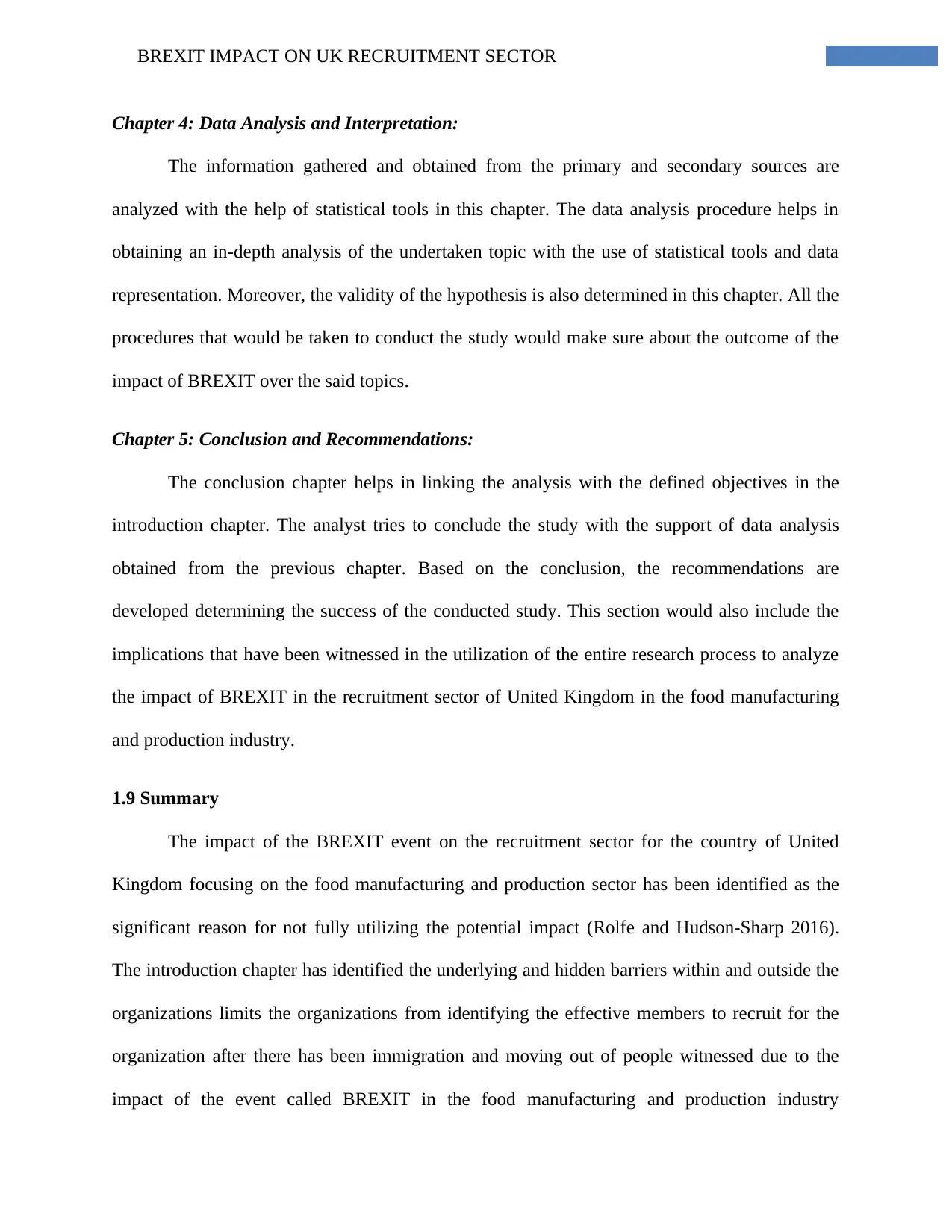
BREXIT IMPACT ON UK RECRUITMENT SECTOR
Chapter 4: Data Analysis and Interpretation:
The information gathered and obtained from the primary and secondary sources are
analyzed with the help of statistical tools in this chapter. The data analysis procedure helps in
obtaining an in-depth analysis of the undertaken topic with the use of statistical tools and data
representation. Moreover, the validity of the hypothesis is also determined in this chapter. All the
procedures that would be taken to conduct the study would make sure about the outcome of the
impact of BREXIT over the said topics.
Chapter 5: Conclusion and Recommendations:
The conclusion chapter helps in linking the analysis with the defined objectives in the
introduction chapter. The analyst tries to conclude the study with the support of data analysis
obtained from the previous chapter. Based on the conclusion, the recommendations are
developed determining the success of the conducted study. This section would also include the
implications that have been witnessed in the utilization of the entire research process to analyze
the impact of BREXIT in the recruitment sector of United Kingdom in the food manufacturing
and production industry.
1.9 Summary
The impact of the BREXIT event on the recruitment sector for the country of United
Kingdom focusing on the food manufacturing and production sector has been identified as the
significant reason for not fully utilizing the potential impact (Rolfe and Hudson-Sharp 2016).
The introduction chapter has identified the underlying and hidden barriers within and outside the
organizations limits the organizations from identifying the effective members to recruit for the
organization after there has been immigration and moving out of people witnessed due to the
impact of the event called BREXIT in the food manufacturing and production industry
Chapter 4: Data Analysis and Interpretation:
The information gathered and obtained from the primary and secondary sources are
analyzed with the help of statistical tools in this chapter. The data analysis procedure helps in
obtaining an in-depth analysis of the undertaken topic with the use of statistical tools and data
representation. Moreover, the validity of the hypothesis is also determined in this chapter. All the
procedures that would be taken to conduct the study would make sure about the outcome of the
impact of BREXIT over the said topics.
Chapter 5: Conclusion and Recommendations:
The conclusion chapter helps in linking the analysis with the defined objectives in the
introduction chapter. The analyst tries to conclude the study with the support of data analysis
obtained from the previous chapter. Based on the conclusion, the recommendations are
developed determining the success of the conducted study. This section would also include the
implications that have been witnessed in the utilization of the entire research process to analyze
the impact of BREXIT in the recruitment sector of United Kingdom in the food manufacturing
and production industry.
1.9 Summary
The impact of the BREXIT event on the recruitment sector for the country of United
Kingdom focusing on the food manufacturing and production sector has been identified as the
significant reason for not fully utilizing the potential impact (Rolfe and Hudson-Sharp 2016).
The introduction chapter has identified the underlying and hidden barriers within and outside the
organizations limits the organizations from identifying the effective members to recruit for the
organization after there has been immigration and moving out of people witnessed due to the
impact of the event called BREXIT in the food manufacturing and production industry
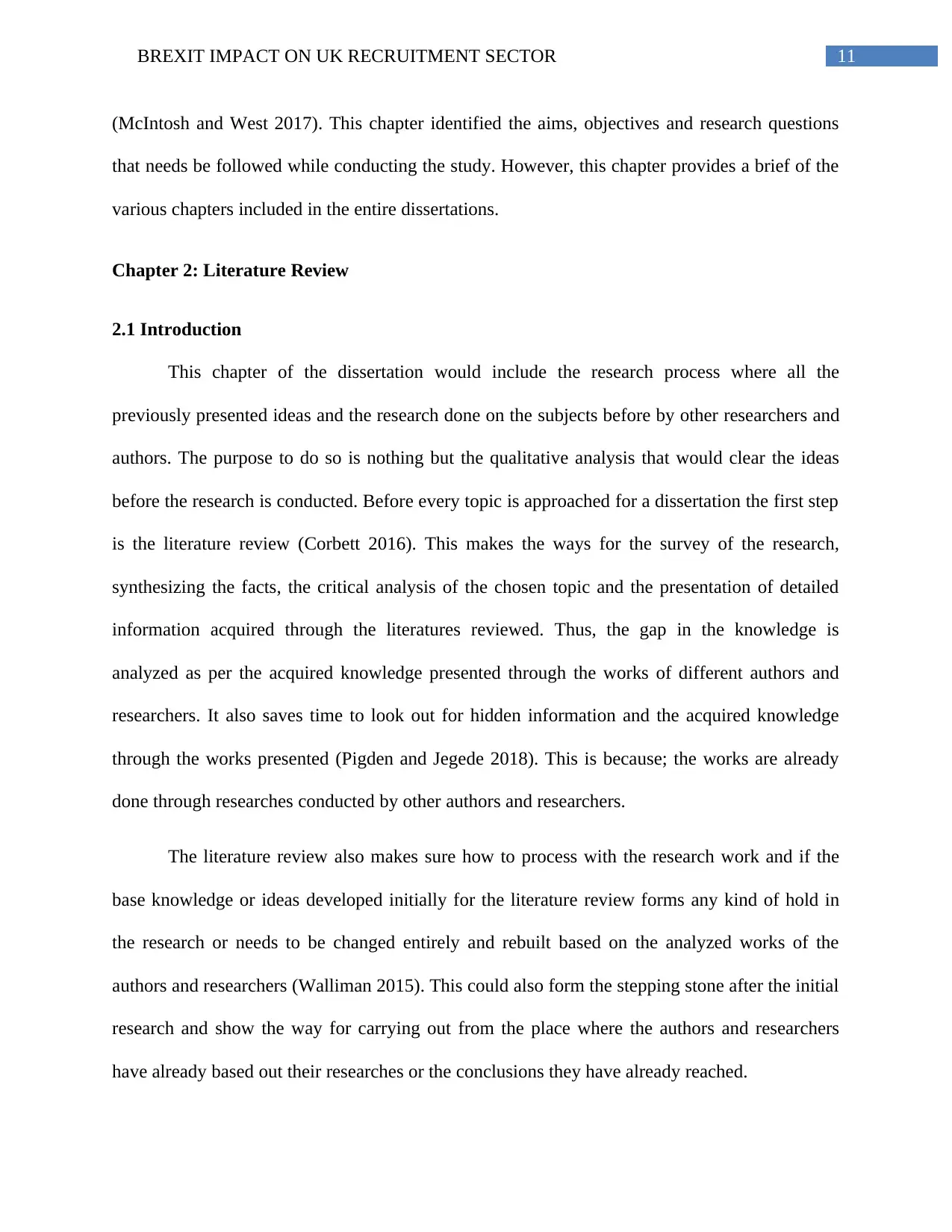
11BREXIT IMPACT ON UK RECRUITMENT SECTOR
(McIntosh and West 2017). This chapter identified the aims, objectives and research questions
that needs be followed while conducting the study. However, this chapter provides a brief of the
various chapters included in the entire dissertations.
Chapter 2: Literature Review
2.1 Introduction
This chapter of the dissertation would include the research process where all the
previously presented ideas and the research done on the subjects before by other researchers and
authors. The purpose to do so is nothing but the qualitative analysis that would clear the ideas
before the research is conducted. Before every topic is approached for a dissertation the first step
is the literature review (Corbett 2016). This makes the ways for the survey of the research,
synthesizing the facts, the critical analysis of the chosen topic and the presentation of detailed
information acquired through the literatures reviewed. Thus, the gap in the knowledge is
analyzed as per the acquired knowledge presented through the works of different authors and
researchers. It also saves time to look out for hidden information and the acquired knowledge
through the works presented (Pigden and Jegede 2018). This is because; the works are already
done through researches conducted by other authors and researchers.
The literature review also makes sure how to process with the research work and if the
base knowledge or ideas developed initially for the literature review forms any kind of hold in
the research or needs to be changed entirely and rebuilt based on the analyzed works of the
authors and researchers (Walliman 2015). This could also form the stepping stone after the initial
research and show the way for carrying out from the place where the authors and researchers
have already based out their researches or the conclusions they have already reached.
(McIntosh and West 2017). This chapter identified the aims, objectives and research questions
that needs be followed while conducting the study. However, this chapter provides a brief of the
various chapters included in the entire dissertations.
Chapter 2: Literature Review
2.1 Introduction
This chapter of the dissertation would include the research process where all the
previously presented ideas and the research done on the subjects before by other researchers and
authors. The purpose to do so is nothing but the qualitative analysis that would clear the ideas
before the research is conducted. Before every topic is approached for a dissertation the first step
is the literature review (Corbett 2016). This makes the ways for the survey of the research,
synthesizing the facts, the critical analysis of the chosen topic and the presentation of detailed
information acquired through the literatures reviewed. Thus, the gap in the knowledge is
analyzed as per the acquired knowledge presented through the works of different authors and
researchers. It also saves time to look out for hidden information and the acquired knowledge
through the works presented (Pigden and Jegede 2018). This is because; the works are already
done through researches conducted by other authors and researchers.
The literature review also makes sure how to process with the research work and if the
base knowledge or ideas developed initially for the literature review forms any kind of hold in
the research or needs to be changed entirely and rebuilt based on the analyzed works of the
authors and researchers (Walliman 2015). This could also form the stepping stone after the initial
research and show the way for carrying out from the place where the authors and researchers
have already based out their researches or the conclusions they have already reached.
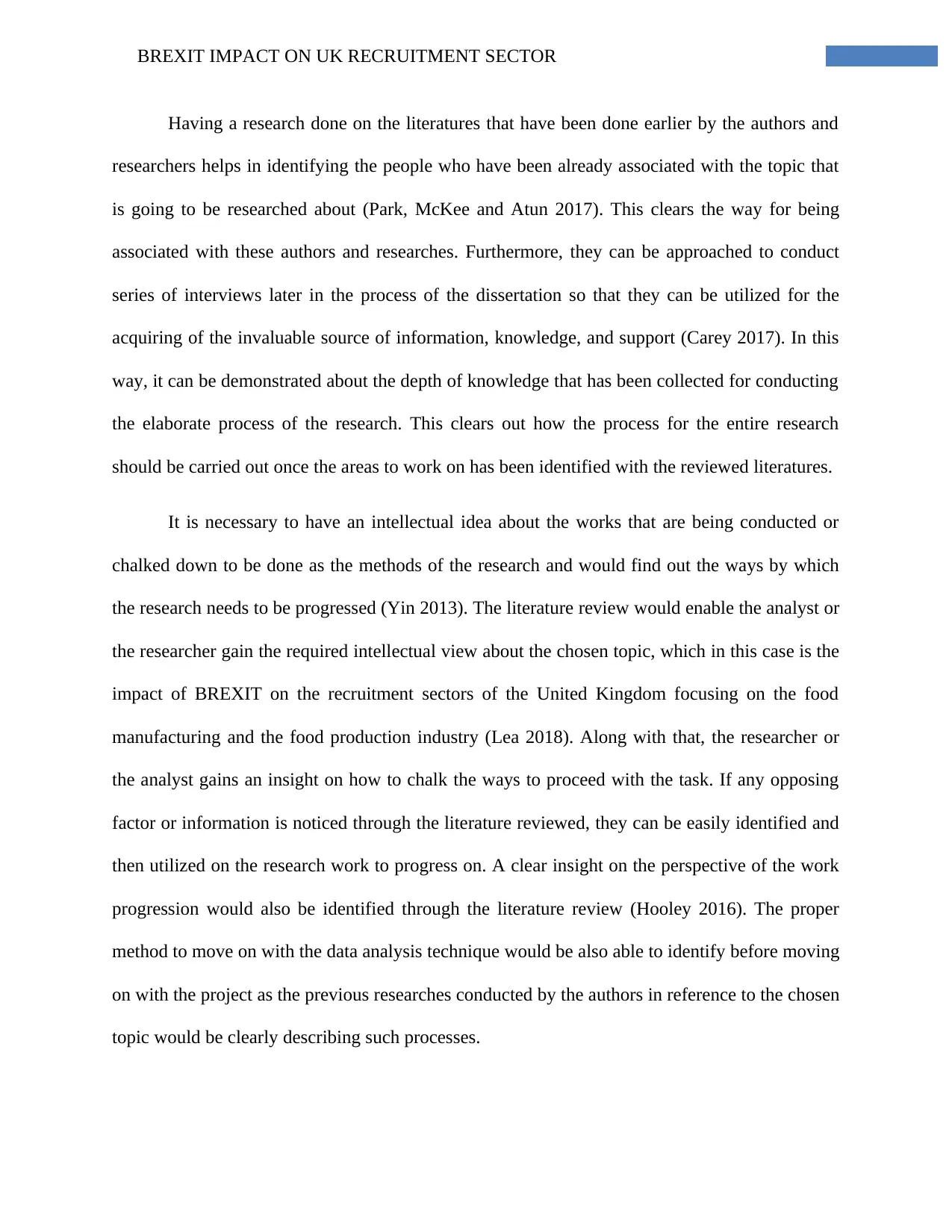
BREXIT IMPACT ON UK RECRUITMENT SECTOR
Having a research done on the literatures that have been done earlier by the authors and
researchers helps in identifying the people who have been already associated with the topic that
is going to be researched about (Park, McKee and Atun 2017). This clears the way for being
associated with these authors and researches. Furthermore, they can be approached to conduct
series of interviews later in the process of the dissertation so that they can be utilized for the
acquiring of the invaluable source of information, knowledge, and support (Carey 2017). In this
way, it can be demonstrated about the depth of knowledge that has been collected for conducting
the elaborate process of the research. This clears out how the process for the entire research
should be carried out once the areas to work on has been identified with the reviewed literatures.
It is necessary to have an intellectual idea about the works that are being conducted or
chalked down to be done as the methods of the research and would find out the ways by which
the research needs to be progressed (Yin 2013). The literature review would enable the analyst or
the researcher gain the required intellectual view about the chosen topic, which in this case is the
impact of BREXIT on the recruitment sectors of the United Kingdom focusing on the food
manufacturing and the food production industry (Lea 2018). Along with that, the researcher or
the analyst gains an insight on how to chalk the ways to proceed with the task. If any opposing
factor or information is noticed through the literature reviewed, they can be easily identified and
then utilized on the research work to progress on. A clear insight on the perspective of the work
progression would also be identified through the literature review (Hooley 2016). The proper
method to move on with the data analysis technique would be also able to identify before moving
on with the project as the previous researches conducted by the authors in reference to the chosen
topic would be clearly describing such processes.
Having a research done on the literatures that have been done earlier by the authors and
researchers helps in identifying the people who have been already associated with the topic that
is going to be researched about (Park, McKee and Atun 2017). This clears the way for being
associated with these authors and researches. Furthermore, they can be approached to conduct
series of interviews later in the process of the dissertation so that they can be utilized for the
acquiring of the invaluable source of information, knowledge, and support (Carey 2017). In this
way, it can be demonstrated about the depth of knowledge that has been collected for conducting
the elaborate process of the research. This clears out how the process for the entire research
should be carried out once the areas to work on has been identified with the reviewed literatures.
It is necessary to have an intellectual idea about the works that are being conducted or
chalked down to be done as the methods of the research and would find out the ways by which
the research needs to be progressed (Yin 2013). The literature review would enable the analyst or
the researcher gain the required intellectual view about the chosen topic, which in this case is the
impact of BREXIT on the recruitment sectors of the United Kingdom focusing on the food
manufacturing and the food production industry (Lea 2018). Along with that, the researcher or
the analyst gains an insight on how to chalk the ways to proceed with the task. If any opposing
factor or information is noticed through the literature reviewed, they can be easily identified and
then utilized on the research work to progress on. A clear insight on the perspective of the work
progression would also be identified through the literature review (Hooley 2016). The proper
method to move on with the data analysis technique would be also able to identify before moving
on with the project as the previous researches conducted by the authors in reference to the chosen
topic would be clearly describing such processes.
Paraphrase This Document
Need a fresh take? Get an instant paraphrase of this document with our AI Paraphraser
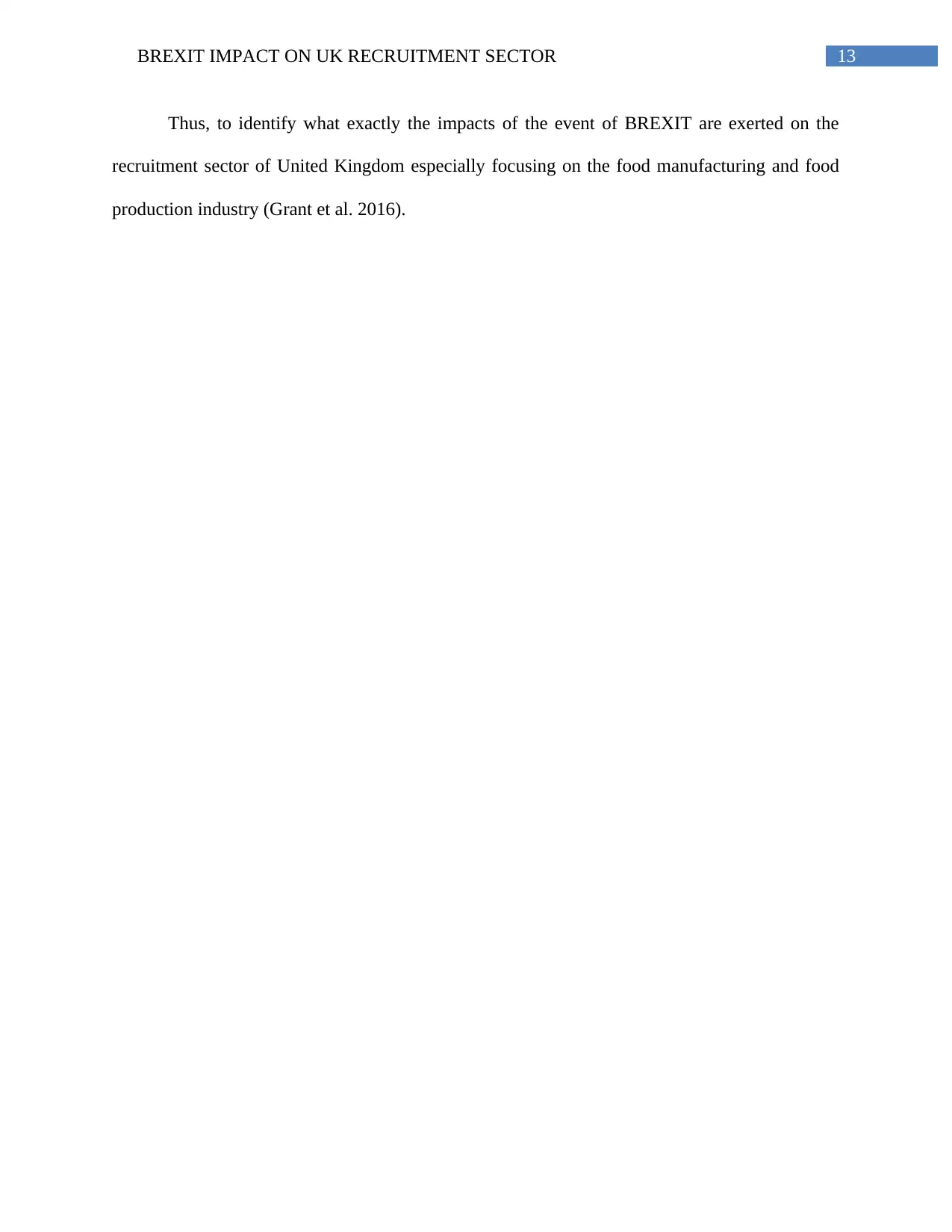
13BREXIT IMPACT ON UK RECRUITMENT SECTOR
Thus, to identify what exactly the impacts of the event of BREXIT are exerted on the
recruitment sector of United Kingdom especially focusing on the food manufacturing and food
production industry (Grant et al. 2016).
Thus, to identify what exactly the impacts of the event of BREXIT are exerted on the
recruitment sector of United Kingdom especially focusing on the food manufacturing and food
production industry (Grant et al. 2016).
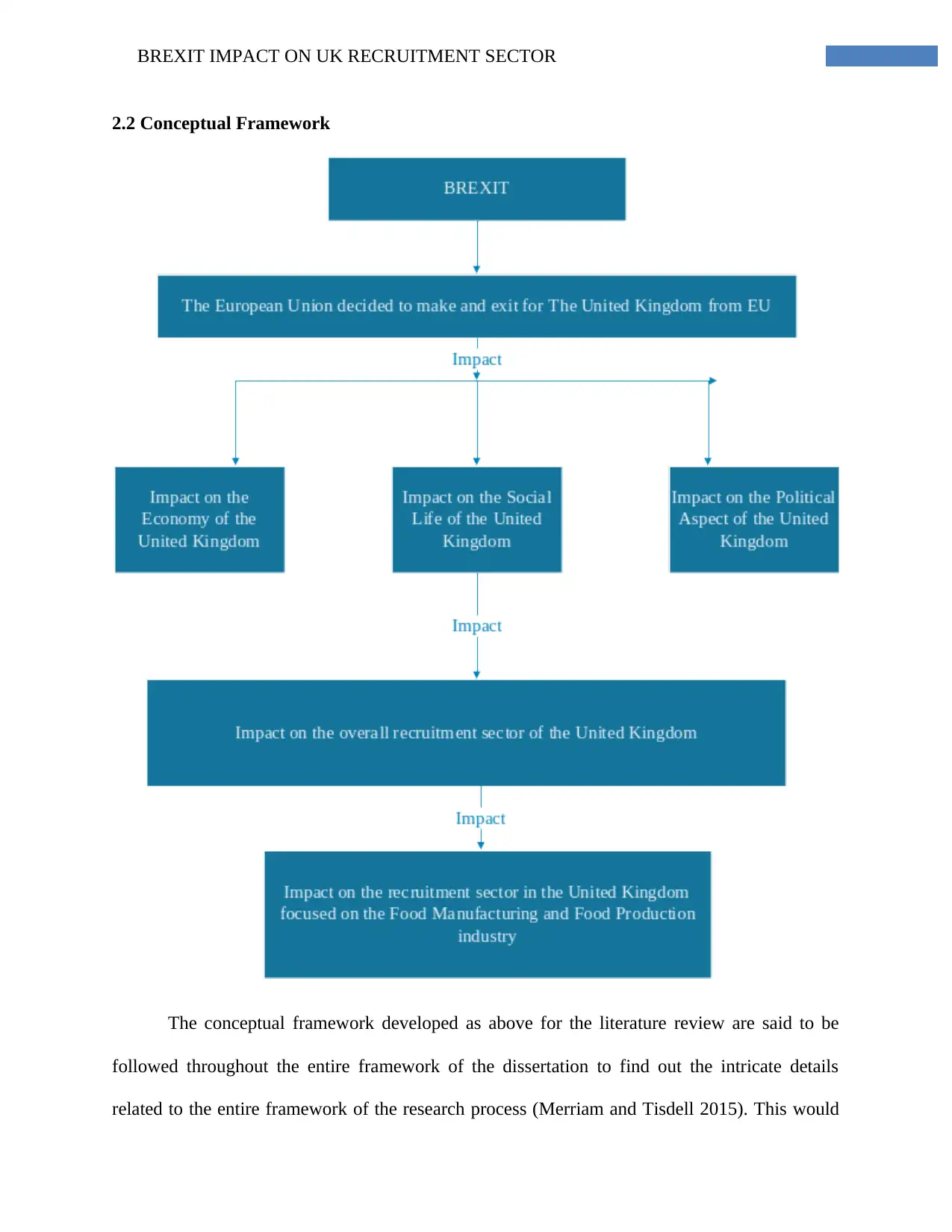
BREXIT IMPACT ON UK RECRUITMENT SECTOR
2.2 Conceptual Framework
The conceptual framework developed as above for the literature review are said to be
followed throughout the entire framework of the dissertation to find out the intricate details
related to the entire framework of the research process (Merriam and Tisdell 2015). This would
2.2 Conceptual Framework
The conceptual framework developed as above for the literature review are said to be
followed throughout the entire framework of the dissertation to find out the intricate details
related to the entire framework of the research process (Merriam and Tisdell 2015). This would
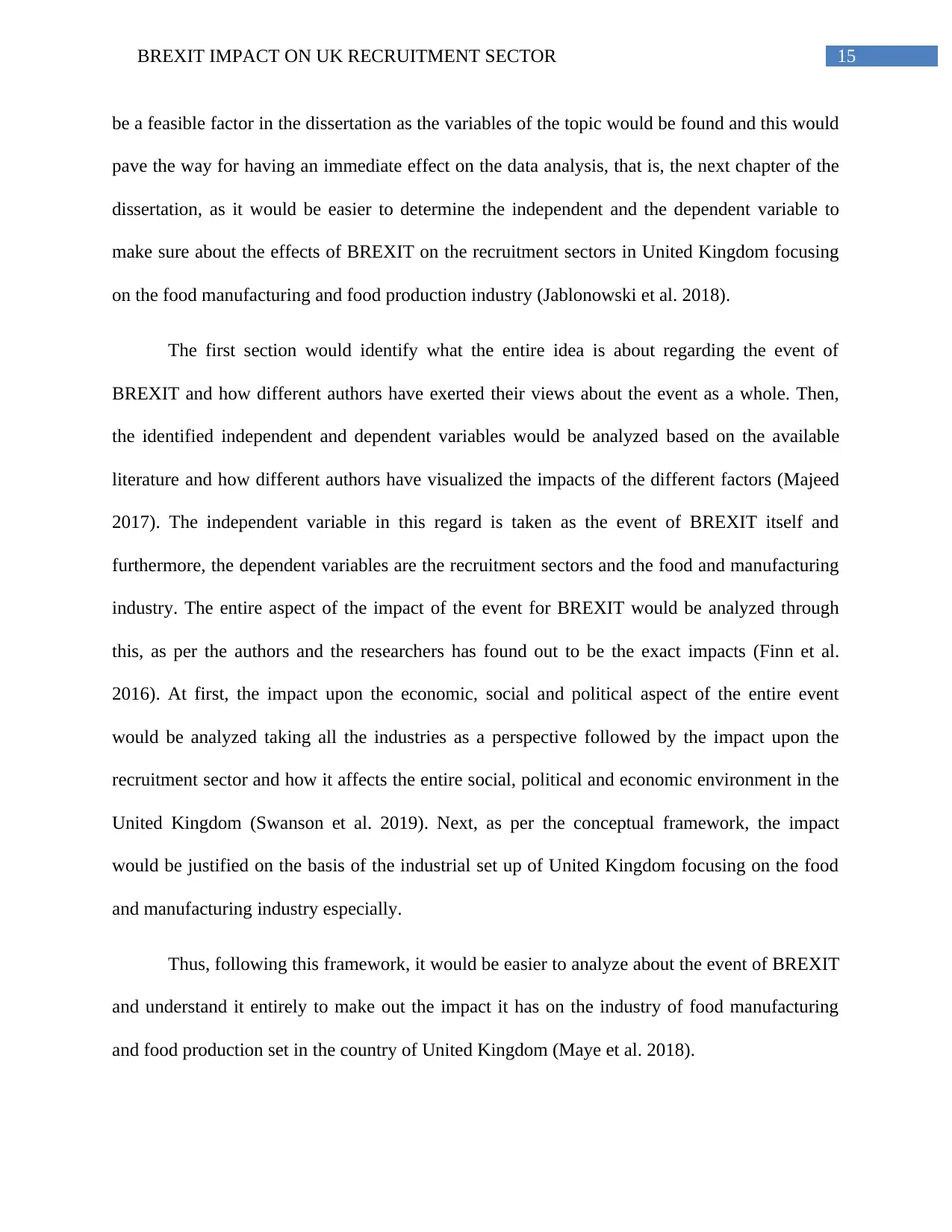
15BREXIT IMPACT ON UK RECRUITMENT SECTOR
be a feasible factor in the dissertation as the variables of the topic would be found and this would
pave the way for having an immediate effect on the data analysis, that is, the next chapter of the
dissertation, as it would be easier to determine the independent and the dependent variable to
make sure about the effects of BREXIT on the recruitment sectors in United Kingdom focusing
on the food manufacturing and food production industry (Jablonowski et al. 2018).
The first section would identify what the entire idea is about regarding the event of
BREXIT and how different authors have exerted their views about the event as a whole. Then,
the identified independent and dependent variables would be analyzed based on the available
literature and how different authors have visualized the impacts of the different factors (Majeed
2017). The independent variable in this regard is taken as the event of BREXIT itself and
furthermore, the dependent variables are the recruitment sectors and the food and manufacturing
industry. The entire aspect of the impact of the event for BREXIT would be analyzed through
this, as per the authors and the researchers has found out to be the exact impacts (Finn et al.
2016). At first, the impact upon the economic, social and political aspect of the entire event
would be analyzed taking all the industries as a perspective followed by the impact upon the
recruitment sector and how it affects the entire social, political and economic environment in the
United Kingdom (Swanson et al. 2019). Next, as per the conceptual framework, the impact
would be justified on the basis of the industrial set up of United Kingdom focusing on the food
and manufacturing industry especially.
Thus, following this framework, it would be easier to analyze about the event of BREXIT
and understand it entirely to make out the impact it has on the industry of food manufacturing
and food production set in the country of United Kingdom (Maye et al. 2018).
be a feasible factor in the dissertation as the variables of the topic would be found and this would
pave the way for having an immediate effect on the data analysis, that is, the next chapter of the
dissertation, as it would be easier to determine the independent and the dependent variable to
make sure about the effects of BREXIT on the recruitment sectors in United Kingdom focusing
on the food manufacturing and food production industry (Jablonowski et al. 2018).
The first section would identify what the entire idea is about regarding the event of
BREXIT and how different authors have exerted their views about the event as a whole. Then,
the identified independent and dependent variables would be analyzed based on the available
literature and how different authors have visualized the impacts of the different factors (Majeed
2017). The independent variable in this regard is taken as the event of BREXIT itself and
furthermore, the dependent variables are the recruitment sectors and the food and manufacturing
industry. The entire aspect of the impact of the event for BREXIT would be analyzed through
this, as per the authors and the researchers has found out to be the exact impacts (Finn et al.
2016). At first, the impact upon the economic, social and political aspect of the entire event
would be analyzed taking all the industries as a perspective followed by the impact upon the
recruitment sector and how it affects the entire social, political and economic environment in the
United Kingdom (Swanson et al. 2019). Next, as per the conceptual framework, the impact
would be justified on the basis of the industrial set up of United Kingdom focusing on the food
and manufacturing industry especially.
Thus, following this framework, it would be easier to analyze about the event of BREXIT
and understand it entirely to make out the impact it has on the industry of food manufacturing
and food production set in the country of United Kingdom (Maye et al. 2018).
Secure Best Marks with AI Grader
Need help grading? Try our AI Grader for instant feedback on your assignments.
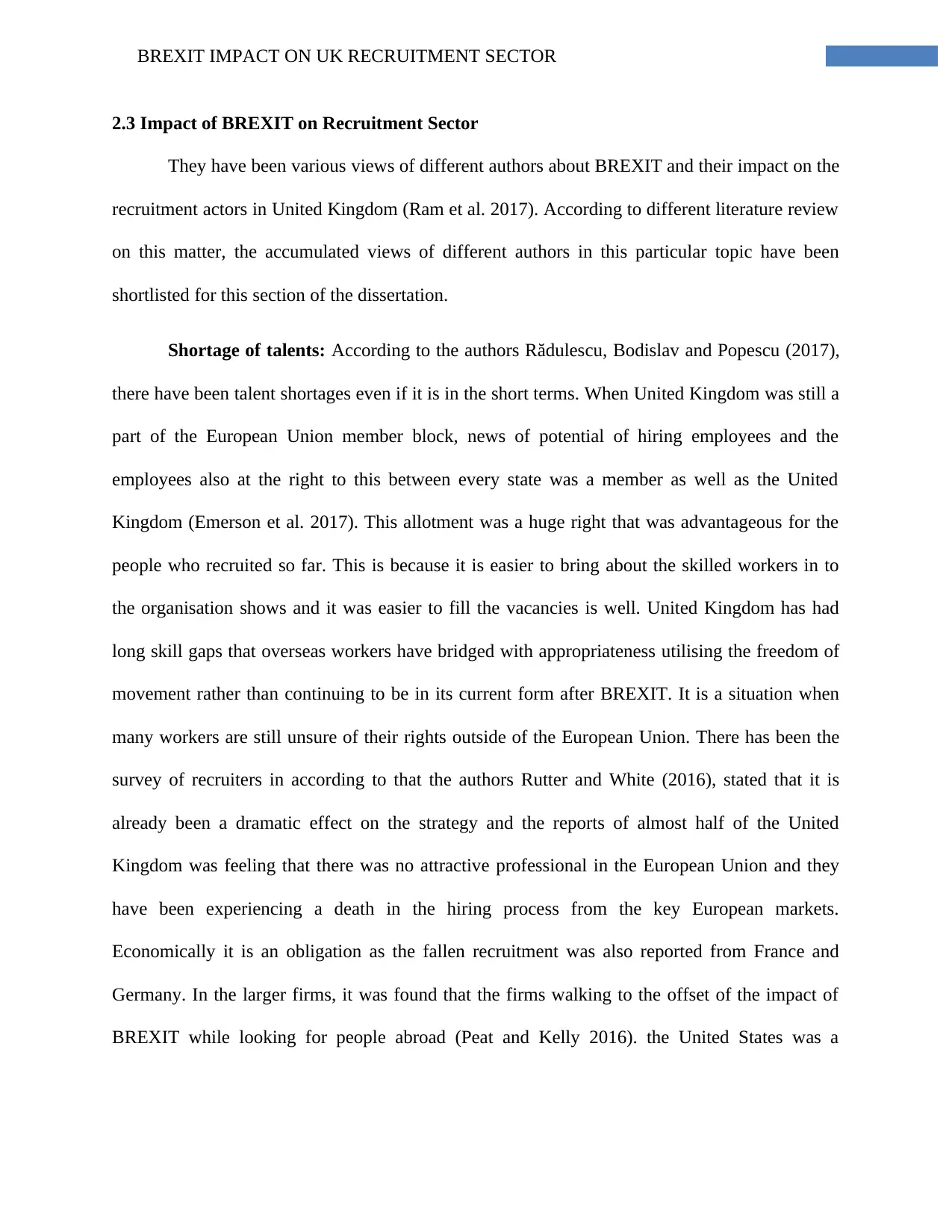
BREXIT IMPACT ON UK RECRUITMENT SECTOR
2.3 Impact of BREXIT on Recruitment Sector
They have been various views of different authors about BREXIT and their impact on the
recruitment actors in United Kingdom (Ram et al. 2017). According to different literature review
on this matter, the accumulated views of different authors in this particular topic have been
shortlisted for this section of the dissertation.
Shortage of talents: According to the authors Rădulescu, Bodislav and Popescu (2017),
there have been talent shortages even if it is in the short terms. When United Kingdom was still a
part of the European Union member block, news of potential of hiring employees and the
employees also at the right to this between every state was a member as well as the United
Kingdom (Emerson et al. 2017). This allotment was a huge right that was advantageous for the
people who recruited so far. This is because it is easier to bring about the skilled workers in to
the organisation shows and it was easier to fill the vacancies is well. United Kingdom has had
long skill gaps that overseas workers have bridged with appropriateness utilising the freedom of
movement rather than continuing to be in its current form after BREXIT. It is a situation when
many workers are still unsure of their rights outside of the European Union. There has been the
survey of recruiters in according to that the authors Rutter and White (2016), stated that it is
already been a dramatic effect on the strategy and the reports of almost half of the United
Kingdom was feeling that there was no attractive professional in the European Union and they
have been experiencing a death in the hiring process from the key European markets.
Economically it is an obligation as the fallen recruitment was also reported from France and
Germany. In the larger firms, it was found that the firms walking to the offset of the impact of
BREXIT while looking for people abroad (Peat and Kelly 2016). the United States was a
2.3 Impact of BREXIT on Recruitment Sector
They have been various views of different authors about BREXIT and their impact on the
recruitment actors in United Kingdom (Ram et al. 2017). According to different literature review
on this matter, the accumulated views of different authors in this particular topic have been
shortlisted for this section of the dissertation.
Shortage of talents: According to the authors Rădulescu, Bodislav and Popescu (2017),
there have been talent shortages even if it is in the short terms. When United Kingdom was still a
part of the European Union member block, news of potential of hiring employees and the
employees also at the right to this between every state was a member as well as the United
Kingdom (Emerson et al. 2017). This allotment was a huge right that was advantageous for the
people who recruited so far. This is because it is easier to bring about the skilled workers in to
the organisation shows and it was easier to fill the vacancies is well. United Kingdom has had
long skill gaps that overseas workers have bridged with appropriateness utilising the freedom of
movement rather than continuing to be in its current form after BREXIT. It is a situation when
many workers are still unsure of their rights outside of the European Union. There has been the
survey of recruiters in according to that the authors Rutter and White (2016), stated that it is
already been a dramatic effect on the strategy and the reports of almost half of the United
Kingdom was feeling that there was no attractive professional in the European Union and they
have been experiencing a death in the hiring process from the key European markets.
Economically it is an obligation as the fallen recruitment was also reported from France and
Germany. In the larger firms, it was found that the firms walking to the offset of the impact of
BREXIT while looking for people abroad (Peat and Kelly 2016). the United States was a
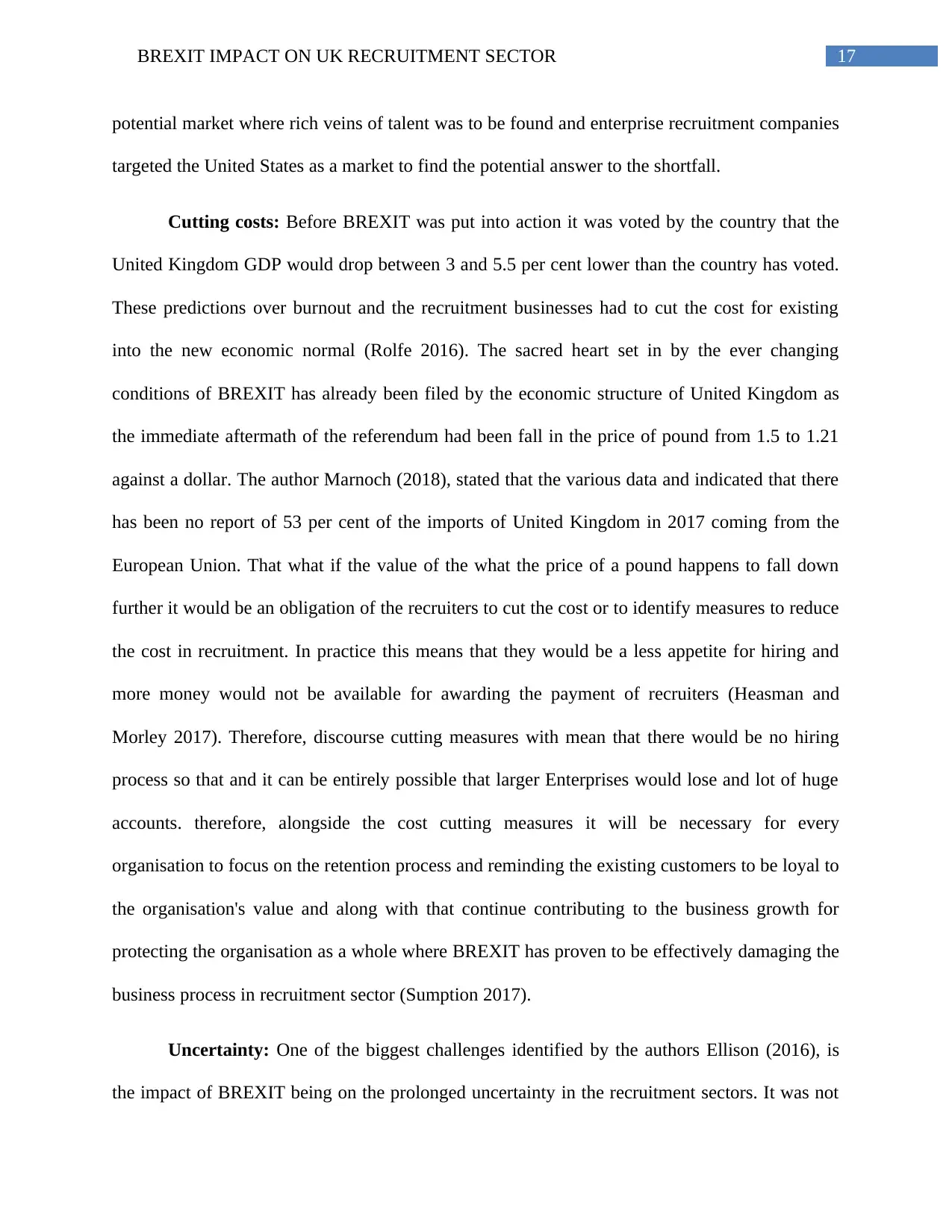
17BREXIT IMPACT ON UK RECRUITMENT SECTOR
potential market where rich veins of talent was to be found and enterprise recruitment companies
targeted the United States as a market to find the potential answer to the shortfall.
Cutting costs: Before BREXIT was put into action it was voted by the country that the
United Kingdom GDP would drop between 3 and 5.5 per cent lower than the country has voted.
These predictions over burnout and the recruitment businesses had to cut the cost for existing
into the new economic normal (Rolfe 2016). The sacred heart set in by the ever changing
conditions of BREXIT has already been filed by the economic structure of United Kingdom as
the immediate aftermath of the referendum had been fall in the price of pound from 1.5 to 1.21
against a dollar. The author Marnoch (2018), stated that the various data and indicated that there
has been no report of 53 per cent of the imports of United Kingdom in 2017 coming from the
European Union. That what if the value of the what the price of a pound happens to fall down
further it would be an obligation of the recruiters to cut the cost or to identify measures to reduce
the cost in recruitment. In practice this means that they would be a less appetite for hiring and
more money would not be available for awarding the payment of recruiters (Heasman and
Morley 2017). Therefore, discourse cutting measures with mean that there would be no hiring
process so that and it can be entirely possible that larger Enterprises would lose and lot of huge
accounts. therefore, alongside the cost cutting measures it will be necessary for every
organisation to focus on the retention process and reminding the existing customers to be loyal to
the organisation's value and along with that continue contributing to the business growth for
protecting the organisation as a whole where BREXIT has proven to be effectively damaging the
business process in recruitment sector (Sumption 2017).
Uncertainty: One of the biggest challenges identified by the authors Ellison (2016), is
the impact of BREXIT being on the prolonged uncertainty in the recruitment sectors. It was not
potential market where rich veins of talent was to be found and enterprise recruitment companies
targeted the United States as a market to find the potential answer to the shortfall.
Cutting costs: Before BREXIT was put into action it was voted by the country that the
United Kingdom GDP would drop between 3 and 5.5 per cent lower than the country has voted.
These predictions over burnout and the recruitment businesses had to cut the cost for existing
into the new economic normal (Rolfe 2016). The sacred heart set in by the ever changing
conditions of BREXIT has already been filed by the economic structure of United Kingdom as
the immediate aftermath of the referendum had been fall in the price of pound from 1.5 to 1.21
against a dollar. The author Marnoch (2018), stated that the various data and indicated that there
has been no report of 53 per cent of the imports of United Kingdom in 2017 coming from the
European Union. That what if the value of the what the price of a pound happens to fall down
further it would be an obligation of the recruiters to cut the cost or to identify measures to reduce
the cost in recruitment. In practice this means that they would be a less appetite for hiring and
more money would not be available for awarding the payment of recruiters (Heasman and
Morley 2017). Therefore, discourse cutting measures with mean that there would be no hiring
process so that and it can be entirely possible that larger Enterprises would lose and lot of huge
accounts. therefore, alongside the cost cutting measures it will be necessary for every
organisation to focus on the retention process and reminding the existing customers to be loyal to
the organisation's value and along with that continue contributing to the business growth for
protecting the organisation as a whole where BREXIT has proven to be effectively damaging the
business process in recruitment sector (Sumption 2017).
Uncertainty: One of the biggest challenges identified by the authors Ellison (2016), is
the impact of BREXIT being on the prolonged uncertainty in the recruitment sectors. It was not
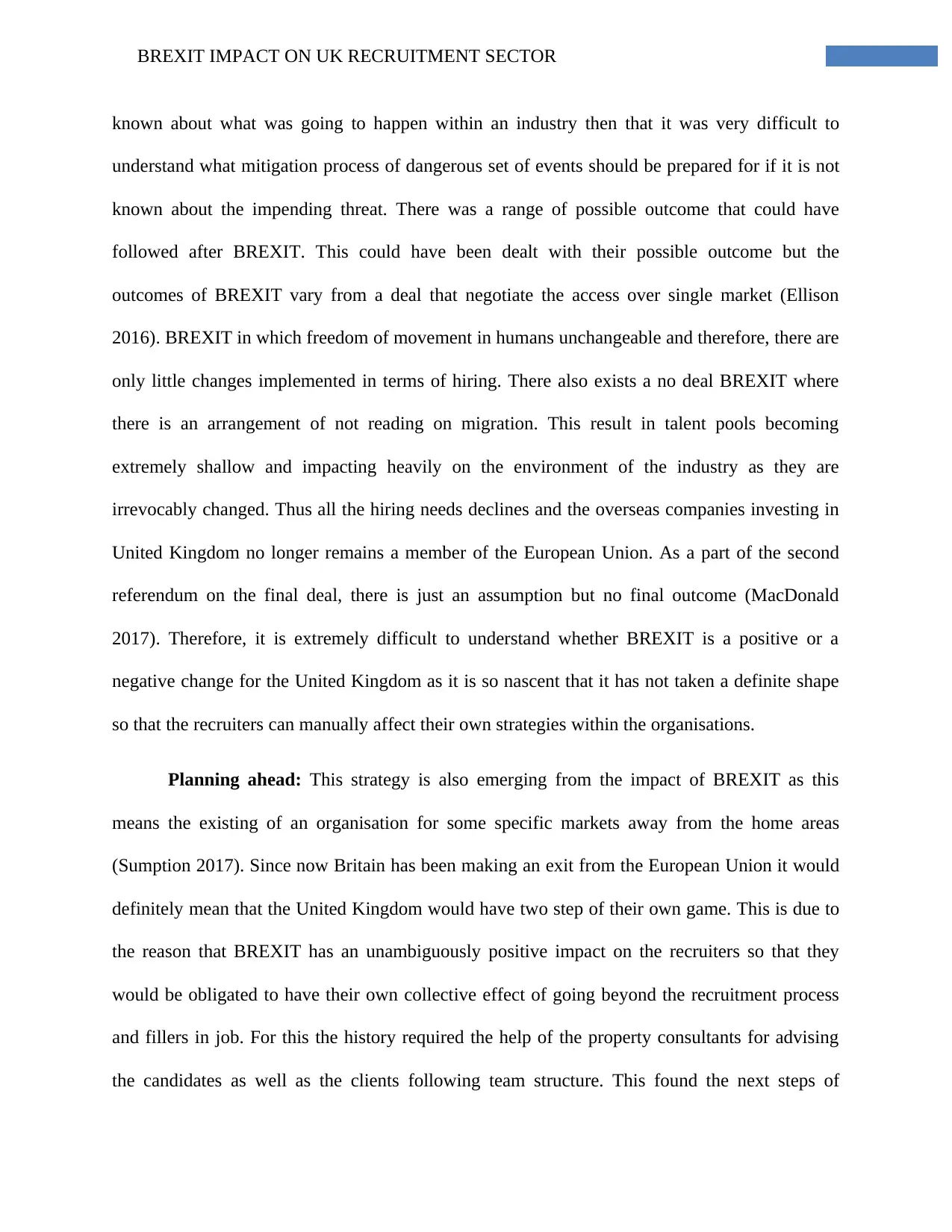
BREXIT IMPACT ON UK RECRUITMENT SECTOR
known about what was going to happen within an industry then that it was very difficult to
understand what mitigation process of dangerous set of events should be prepared for if it is not
known about the impending threat. There was a range of possible outcome that could have
followed after BREXIT. This could have been dealt with their possible outcome but the
outcomes of BREXIT vary from a deal that negotiate the access over single market (Ellison
2016). BREXIT in which freedom of movement in humans unchangeable and therefore, there are
only little changes implemented in terms of hiring. There also exists a no deal BREXIT where
there is an arrangement of not reading on migration. This result in talent pools becoming
extremely shallow and impacting heavily on the environment of the industry as they are
irrevocably changed. Thus all the hiring needs declines and the overseas companies investing in
United Kingdom no longer remains a member of the European Union. As a part of the second
referendum on the final deal, there is just an assumption but no final outcome (MacDonald
2017). Therefore, it is extremely difficult to understand whether BREXIT is a positive or a
negative change for the United Kingdom as it is so nascent that it has not taken a definite shape
so that the recruiters can manually affect their own strategies within the organisations.
Planning ahead: This strategy is also emerging from the impact of BREXIT as this
means the existing of an organisation for some specific markets away from the home areas
(Sumption 2017). Since now Britain has been making an exit from the European Union it would
definitely mean that the United Kingdom would have two step of their own game. This is due to
the reason that BREXIT has an unambiguously positive impact on the recruiters so that they
would be obligated to have their own collective effect of going beyond the recruitment process
and fillers in job. For this the history required the help of the property consultants for advising
the candidates as well as the clients following team structure. This found the next steps of
known about what was going to happen within an industry then that it was very difficult to
understand what mitigation process of dangerous set of events should be prepared for if it is not
known about the impending threat. There was a range of possible outcome that could have
followed after BREXIT. This could have been dealt with their possible outcome but the
outcomes of BREXIT vary from a deal that negotiate the access over single market (Ellison
2016). BREXIT in which freedom of movement in humans unchangeable and therefore, there are
only little changes implemented in terms of hiring. There also exists a no deal BREXIT where
there is an arrangement of not reading on migration. This result in talent pools becoming
extremely shallow and impacting heavily on the environment of the industry as they are
irrevocably changed. Thus all the hiring needs declines and the overseas companies investing in
United Kingdom no longer remains a member of the European Union. As a part of the second
referendum on the final deal, there is just an assumption but no final outcome (MacDonald
2017). Therefore, it is extremely difficult to understand whether BREXIT is a positive or a
negative change for the United Kingdom as it is so nascent that it has not taken a definite shape
so that the recruiters can manually affect their own strategies within the organisations.
Planning ahead: This strategy is also emerging from the impact of BREXIT as this
means the existing of an organisation for some specific markets away from the home areas
(Sumption 2017). Since now Britain has been making an exit from the European Union it would
definitely mean that the United Kingdom would have two step of their own game. This is due to
the reason that BREXIT has an unambiguously positive impact on the recruiters so that they
would be obligated to have their own collective effect of going beyond the recruitment process
and fillers in job. For this the history required the help of the property consultants for advising
the candidates as well as the clients following team structure. This found the next steps of
Paraphrase This Document
Need a fresh take? Get an instant paraphrase of this document with our AI Paraphraser

19BREXIT IMPACT ON UK RECRUITMENT SECTOR
contingencies and it was possible that the unconventional talented the potential of fulfilling the
unconventional rules. Everything that a business requirement was utilised for hiring was
inconceivably needed for the organisation. Analyzing the fact, this transition was inevitable as
technology has automated all the routine recruitment activities (Sumithra 2018). Therefore, there
was the potential of very few routine recruitment activities where only human consultant can
move from front to continue with the recruitment process (Marangozov and Williams 2016).
According to the situation the human consultant used to have several friends at the ready to make
sure which would be needed for the initial judgement the superficial judgement or from the
perspective of a candidate. Fulfilment of the client requirements and the responsibility of an
account in this matter would only be benefited if the recruiters can provide them (Prazeres and
Findlay 2017). The event of diverging or otherwise inconvenient BREXIT, the organisation has
to be a pivotal role during the volatile and frustrating time. The authors of also found out that
moving to themselves is a tree strategic partner in this method of huge transition.
2.4 Impact of BREXIT on Food Manufacturing/Production Industry
As per the findings of authors Dennison and Geddes (2018), the United Kingdom wanted
to make a trade free area for the European Union for all the traded and manufactured goods, and
the food industry was included as a result. After the announcement of the exit of United
Kingdom from the European Union, it was underpinned by a common rulebook on both the
industrial as well as the agricultural productions. All the food manufacturing and production
industry wanted was to have a frictionless trade at the border. The authors Mohamed, Pärn and
Edwards (2017), are of the opinion that since food products are perishable in nature, time is a
major factor in making up for the trading. This is why a frictionless trade for the food production
contingencies and it was possible that the unconventional talented the potential of fulfilling the
unconventional rules. Everything that a business requirement was utilised for hiring was
inconceivably needed for the organisation. Analyzing the fact, this transition was inevitable as
technology has automated all the routine recruitment activities (Sumithra 2018). Therefore, there
was the potential of very few routine recruitment activities where only human consultant can
move from front to continue with the recruitment process (Marangozov and Williams 2016).
According to the situation the human consultant used to have several friends at the ready to make
sure which would be needed for the initial judgement the superficial judgement or from the
perspective of a candidate. Fulfilment of the client requirements and the responsibility of an
account in this matter would only be benefited if the recruiters can provide them (Prazeres and
Findlay 2017). The event of diverging or otherwise inconvenient BREXIT, the organisation has
to be a pivotal role during the volatile and frustrating time. The authors of also found out that
moving to themselves is a tree strategic partner in this method of huge transition.
2.4 Impact of BREXIT on Food Manufacturing/Production Industry
As per the findings of authors Dennison and Geddes (2018), the United Kingdom wanted
to make a trade free area for the European Union for all the traded and manufactured goods, and
the food industry was included as a result. After the announcement of the exit of United
Kingdom from the European Union, it was underpinned by a common rulebook on both the
industrial as well as the agricultural productions. All the food manufacturing and production
industry wanted was to have a frictionless trade at the border. The authors Mohamed, Pärn and
Edwards (2017), are of the opinion that since food products are perishable in nature, time is a
major factor in making up for the trading. This is why a frictionless trade for the food production
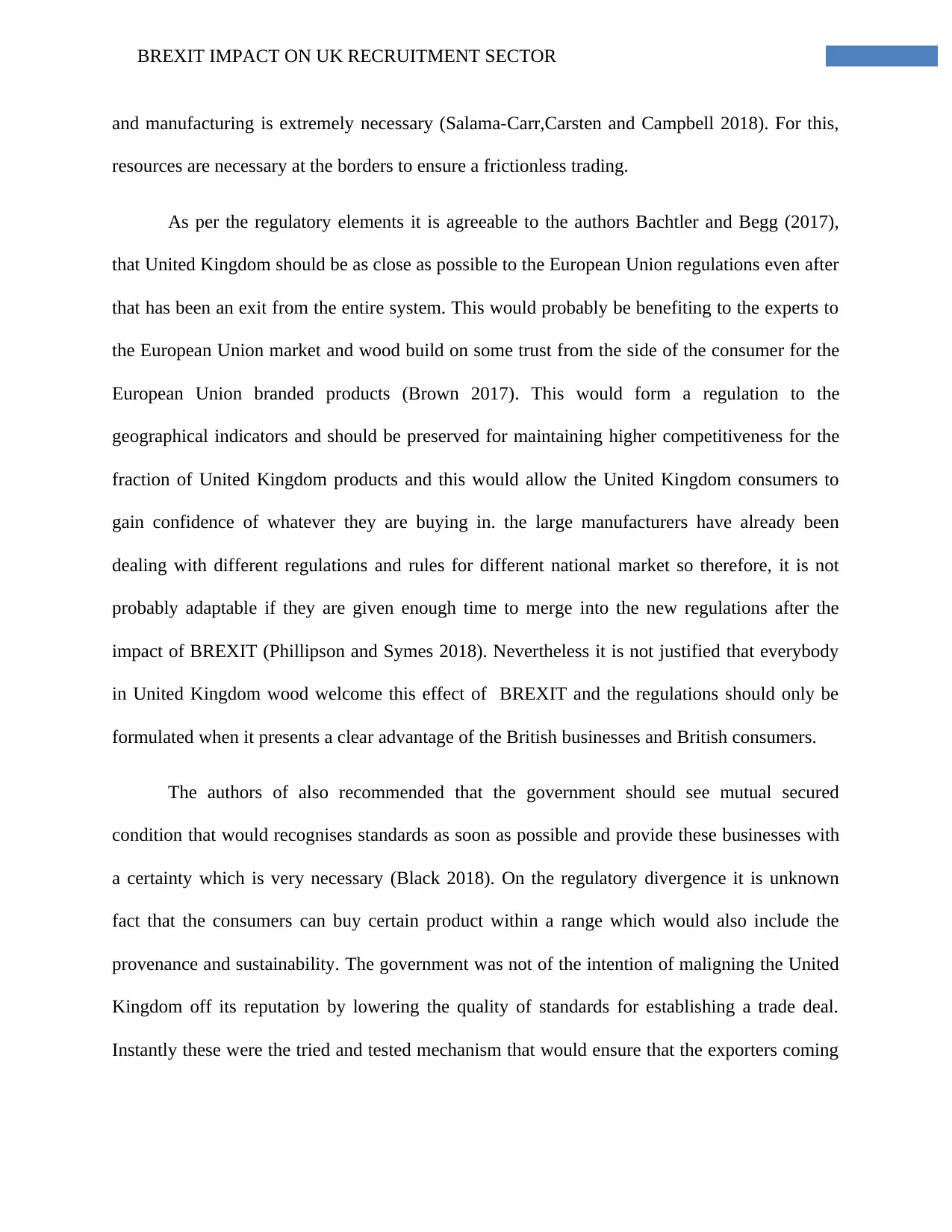
BREXIT IMPACT ON UK RECRUITMENT SECTOR
and manufacturing is extremely necessary (Salama-Carr,Carsten and Campbell 2018). For this,
resources are necessary at the borders to ensure a frictionless trading.
As per the regulatory elements it is agreeable to the authors Bachtler and Begg (2017),
that United Kingdom should be as close as possible to the European Union regulations even after
that has been an exit from the entire system. This would probably be benefiting to the experts to
the European Union market and wood build on some trust from the side of the consumer for the
European Union branded products (Brown 2017). This would form a regulation to the
geographical indicators and should be preserved for maintaining higher competitiveness for the
fraction of United Kingdom products and this would allow the United Kingdom consumers to
gain confidence of whatever they are buying in. the large manufacturers have already been
dealing with different regulations and rules for different national market so therefore, it is not
probably adaptable if they are given enough time to merge into the new regulations after the
impact of BREXIT (Phillipson and Symes 2018). Nevertheless it is not justified that everybody
in United Kingdom wood welcome this effect of BREXIT and the regulations should only be
formulated when it presents a clear advantage of the British businesses and British consumers.
The authors of also recommended that the government should see mutual secured
condition that would recognises standards as soon as possible and provide these businesses with
a certainty which is very necessary (Black 2018). On the regulatory divergence it is unknown
fact that the consumers can buy certain product within a range which would also include the
provenance and sustainability. The government was not of the intention of maligning the United
Kingdom off its reputation by lowering the quality of standards for establishing a trade deal.
Instantly these were the tried and tested mechanism that would ensure that the exporters coming
and manufacturing is extremely necessary (Salama-Carr,Carsten and Campbell 2018). For this,
resources are necessary at the borders to ensure a frictionless trading.
As per the regulatory elements it is agreeable to the authors Bachtler and Begg (2017),
that United Kingdom should be as close as possible to the European Union regulations even after
that has been an exit from the entire system. This would probably be benefiting to the experts to
the European Union market and wood build on some trust from the side of the consumer for the
European Union branded products (Brown 2017). This would form a regulation to the
geographical indicators and should be preserved for maintaining higher competitiveness for the
fraction of United Kingdom products and this would allow the United Kingdom consumers to
gain confidence of whatever they are buying in. the large manufacturers have already been
dealing with different regulations and rules for different national market so therefore, it is not
probably adaptable if they are given enough time to merge into the new regulations after the
impact of BREXIT (Phillipson and Symes 2018). Nevertheless it is not justified that everybody
in United Kingdom wood welcome this effect of BREXIT and the regulations should only be
formulated when it presents a clear advantage of the British businesses and British consumers.
The authors of also recommended that the government should see mutual secured
condition that would recognises standards as soon as possible and provide these businesses with
a certainty which is very necessary (Black 2018). On the regulatory divergence it is unknown
fact that the consumers can buy certain product within a range which would also include the
provenance and sustainability. The government was not of the intention of maligning the United
Kingdom off its reputation by lowering the quality of standards for establishing a trade deal.
Instantly these were the tried and tested mechanism that would ensure that the exporters coming
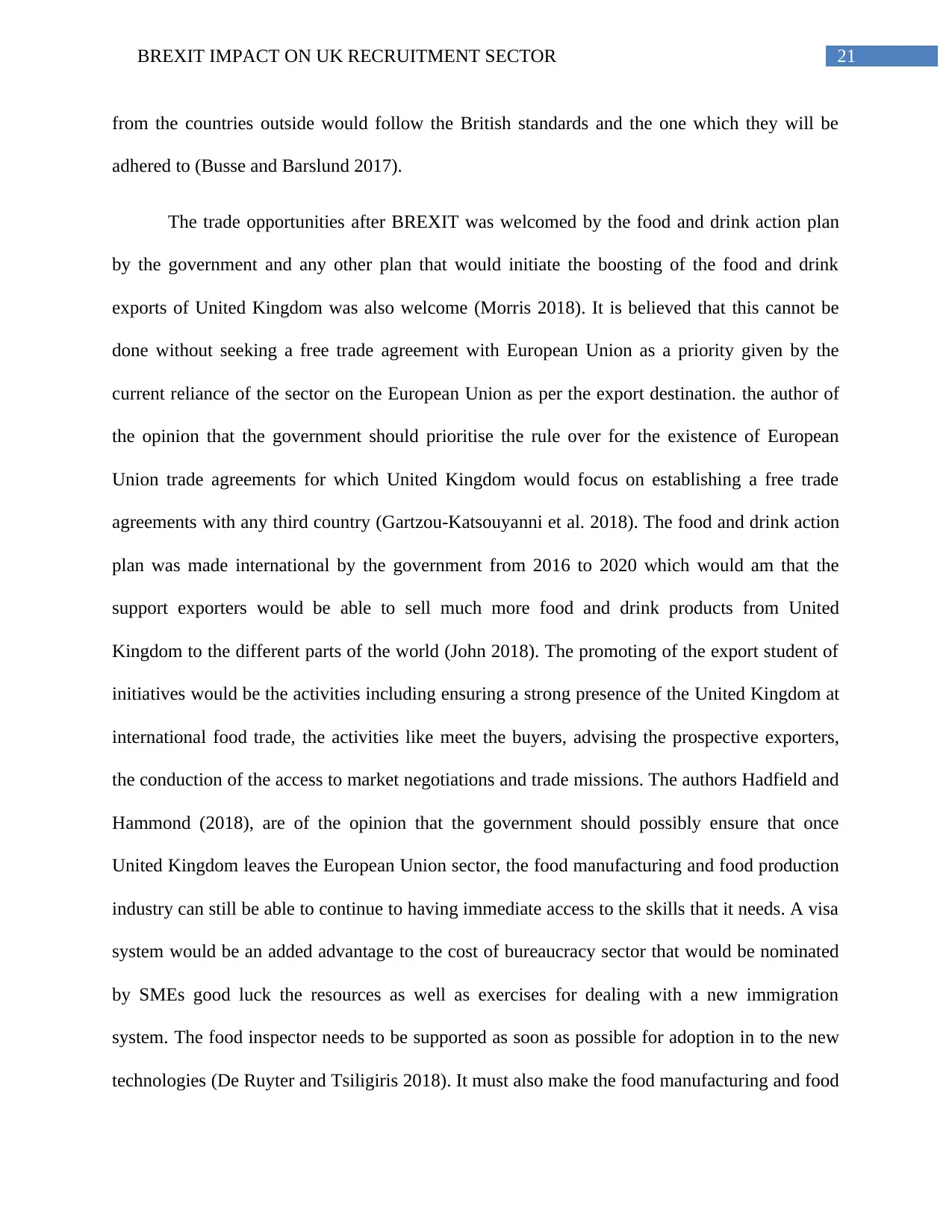
21BREXIT IMPACT ON UK RECRUITMENT SECTOR
from the countries outside would follow the British standards and the one which they will be
adhered to (Busse and Barslund 2017).
The trade opportunities after BREXIT was welcomed by the food and drink action plan
by the government and any other plan that would initiate the boosting of the food and drink
exports of United Kingdom was also welcome (Morris 2018). It is believed that this cannot be
done without seeking a free trade agreement with European Union as a priority given by the
current reliance of the sector on the European Union as per the export destination. the author of
the opinion that the government should prioritise the rule over for the existence of European
Union trade agreements for which United Kingdom would focus on establishing a free trade
agreements with any third country (Gartzou-Katsouyanni et al. 2018). The food and drink action
plan was made international by the government from 2016 to 2020 which would am that the
support exporters would be able to sell much more food and drink products from United
Kingdom to the different parts of the world (John 2018). The promoting of the export student of
initiatives would be the activities including ensuring a strong presence of the United Kingdom at
international food trade, the activities like meet the buyers, advising the prospective exporters,
the conduction of the access to market negotiations and trade missions. The authors Hadfield and
Hammond (2018), are of the opinion that the government should possibly ensure that once
United Kingdom leaves the European Union sector, the food manufacturing and food production
industry can still be able to continue to having immediate access to the skills that it needs. A visa
system would be an added advantage to the cost of bureaucracy sector that would be nominated
by SMEs good luck the resources as well as exercises for dealing with a new immigration
system. The food inspector needs to be supported as soon as possible for adoption in to the new
technologies (De Ruyter and Tsiligiris 2018). It must also make the food manufacturing and food
from the countries outside would follow the British standards and the one which they will be
adhered to (Busse and Barslund 2017).
The trade opportunities after BREXIT was welcomed by the food and drink action plan
by the government and any other plan that would initiate the boosting of the food and drink
exports of United Kingdom was also welcome (Morris 2018). It is believed that this cannot be
done without seeking a free trade agreement with European Union as a priority given by the
current reliance of the sector on the European Union as per the export destination. the author of
the opinion that the government should prioritise the rule over for the existence of European
Union trade agreements for which United Kingdom would focus on establishing a free trade
agreements with any third country (Gartzou-Katsouyanni et al. 2018). The food and drink action
plan was made international by the government from 2016 to 2020 which would am that the
support exporters would be able to sell much more food and drink products from United
Kingdom to the different parts of the world (John 2018). The promoting of the export student of
initiatives would be the activities including ensuring a strong presence of the United Kingdom at
international food trade, the activities like meet the buyers, advising the prospective exporters,
the conduction of the access to market negotiations and trade missions. The authors Hadfield and
Hammond (2018), are of the opinion that the government should possibly ensure that once
United Kingdom leaves the European Union sector, the food manufacturing and food production
industry can still be able to continue to having immediate access to the skills that it needs. A visa
system would be an added advantage to the cost of bureaucracy sector that would be nominated
by SMEs good luck the resources as well as exercises for dealing with a new immigration
system. The food inspector needs to be supported as soon as possible for adoption in to the new
technologies (De Ruyter and Tsiligiris 2018). It must also make the food manufacturing and food
Secure Best Marks with AI Grader
Need help grading? Try our AI Grader for instant feedback on your assignments.

BREXIT IMPACT ON UK RECRUITMENT SECTOR
production industry continue to work within the sector that would finally meet its gap in skills
and ensure that the sector has an attractive destination to the United Kingdom national for a
career (Annaloro and Mackey 2017). The trying of people for accessing the sufficient and
meekly skilled workforce would be a necessity to the country or industry growth.
2.5 Gap in the Literature
After several literatures have been studied through, it was found that, various authors
have different opinions about the impact of BREXIT on the recruitment sector in food
manufacturing and food production industry (Valverde and Latorre 2018). However, there were
different literatures that need to be combined together to have a wholesome idea about the
recruitment sector in food manufacturing and food production industry to make sure how was it
dealing with after United Kingdom had an exit from the European Union, that is the event of
BREXIT (Teague and Donaghey 2018). There were several gaps in the literature that were found
while dealing with them. it was found that mostly if one literature was talking about the impact
of BREXIT, it only focused on how the industrial recruitment sectors where affected by it and
not based on the usual focus to a single industry. To find out what its impact wear on the food
manufacturing and food production industry, it had to be consulted from any other literature
source (French 2018).
Therefore, it cannot be said that a whole some idea about the impact of BREXIT on the
food manufacturing and food production industry and their recruitment sector in the United
Kingdom was available through one source. Several resources had to be linked together to have a
full idea. In addition to that there was no proposed structure or ideas that could have been
effective in eradicating all the problems that BREXIT had smeared upon the market and industry
of United Kingdom, especially in the food manufacturing in food production industry. The
production industry continue to work within the sector that would finally meet its gap in skills
and ensure that the sector has an attractive destination to the United Kingdom national for a
career (Annaloro and Mackey 2017). The trying of people for accessing the sufficient and
meekly skilled workforce would be a necessity to the country or industry growth.
2.5 Gap in the Literature
After several literatures have been studied through, it was found that, various authors
have different opinions about the impact of BREXIT on the recruitment sector in food
manufacturing and food production industry (Valverde and Latorre 2018). However, there were
different literatures that need to be combined together to have a wholesome idea about the
recruitment sector in food manufacturing and food production industry to make sure how was it
dealing with after United Kingdom had an exit from the European Union, that is the event of
BREXIT (Teague and Donaghey 2018). There were several gaps in the literature that were found
while dealing with them. it was found that mostly if one literature was talking about the impact
of BREXIT, it only focused on how the industrial recruitment sectors where affected by it and
not based on the usual focus to a single industry. To find out what its impact wear on the food
manufacturing and food production industry, it had to be consulted from any other literature
source (French 2018).
Therefore, it cannot be said that a whole some idea about the impact of BREXIT on the
food manufacturing and food production industry and their recruitment sector in the United
Kingdom was available through one source. Several resources had to be linked together to have a
full idea. In addition to that there was no proposed structure or ideas that could have been
effective in eradicating all the problems that BREXIT had smeared upon the market and industry
of United Kingdom, especially in the food manufacturing in food production industry. The
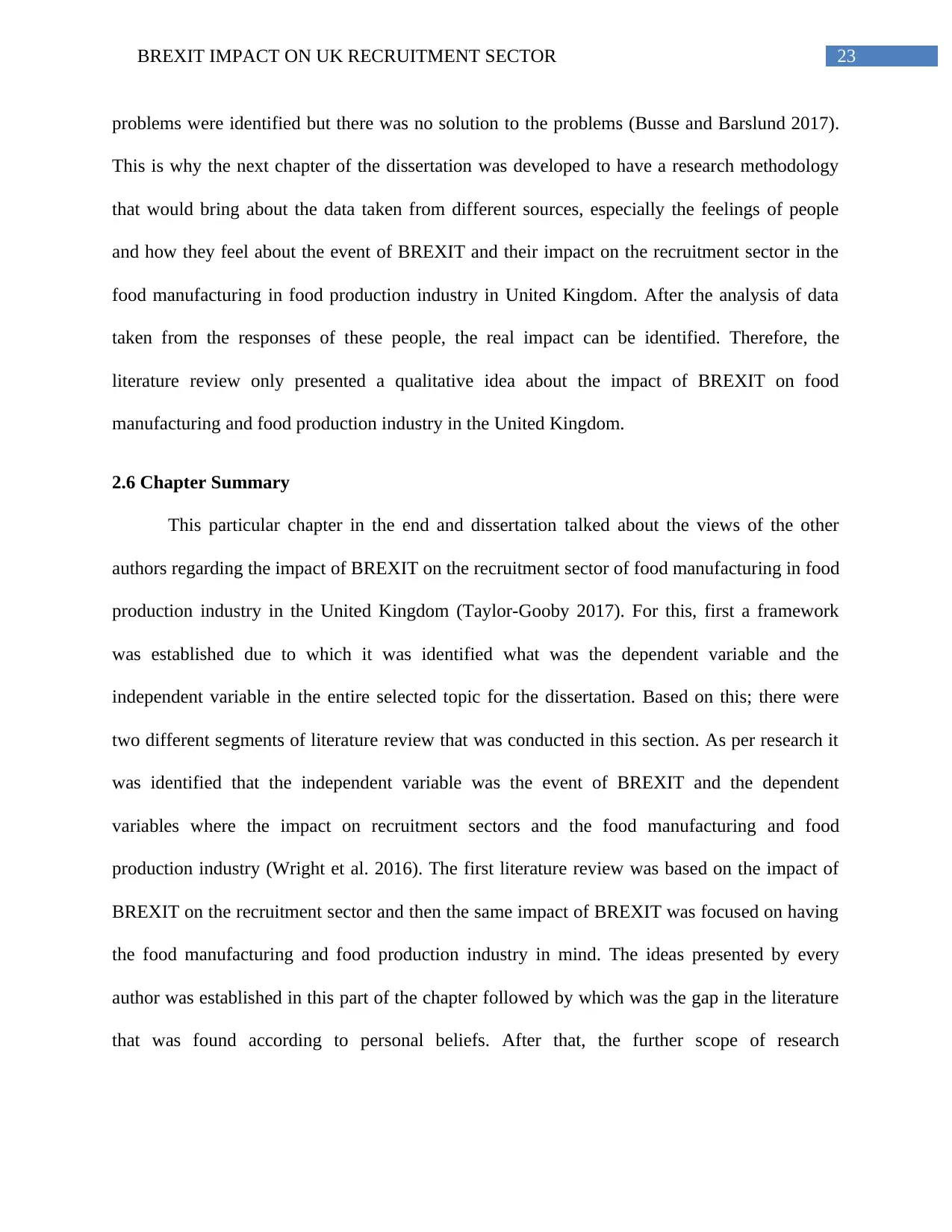
23BREXIT IMPACT ON UK RECRUITMENT SECTOR
problems were identified but there was no solution to the problems (Busse and Barslund 2017).
This is why the next chapter of the dissertation was developed to have a research methodology
that would bring about the data taken from different sources, especially the feelings of people
and how they feel about the event of BREXIT and their impact on the recruitment sector in the
food manufacturing in food production industry in United Kingdom. After the analysis of data
taken from the responses of these people, the real impact can be identified. Therefore, the
literature review only presented a qualitative idea about the impact of BREXIT on food
manufacturing and food production industry in the United Kingdom.
2.6 Chapter Summary
This particular chapter in the end and dissertation talked about the views of the other
authors regarding the impact of BREXIT on the recruitment sector of food manufacturing in food
production industry in the United Kingdom (Taylor-Gooby 2017). For this, first a framework
was established due to which it was identified what was the dependent variable and the
independent variable in the entire selected topic for the dissertation. Based on this; there were
two different segments of literature review that was conducted in this section. As per research it
was identified that the independent variable was the event of BREXIT and the dependent
variables where the impact on recruitment sectors and the food manufacturing and food
production industry (Wright et al. 2016). The first literature review was based on the impact of
BREXIT on the recruitment sector and then the same impact of BREXIT was focused on having
the food manufacturing and food production industry in mind. The ideas presented by every
author was established in this part of the chapter followed by which was the gap in the literature
that was found according to personal beliefs. After that, the further scope of research
problems were identified but there was no solution to the problems (Busse and Barslund 2017).
This is why the next chapter of the dissertation was developed to have a research methodology
that would bring about the data taken from different sources, especially the feelings of people
and how they feel about the event of BREXIT and their impact on the recruitment sector in the
food manufacturing in food production industry in United Kingdom. After the analysis of data
taken from the responses of these people, the real impact can be identified. Therefore, the
literature review only presented a qualitative idea about the impact of BREXIT on food
manufacturing and food production industry in the United Kingdom.
2.6 Chapter Summary
This particular chapter in the end and dissertation talked about the views of the other
authors regarding the impact of BREXIT on the recruitment sector of food manufacturing in food
production industry in the United Kingdom (Taylor-Gooby 2017). For this, first a framework
was established due to which it was identified what was the dependent variable and the
independent variable in the entire selected topic for the dissertation. Based on this; there were
two different segments of literature review that was conducted in this section. As per research it
was identified that the independent variable was the event of BREXIT and the dependent
variables where the impact on recruitment sectors and the food manufacturing and food
production industry (Wright et al. 2016). The first literature review was based on the impact of
BREXIT on the recruitment sector and then the same impact of BREXIT was focused on having
the food manufacturing and food production industry in mind. The ideas presented by every
author was established in this part of the chapter followed by which was the gap in the literature
that was found according to personal beliefs. After that, the further scope of research
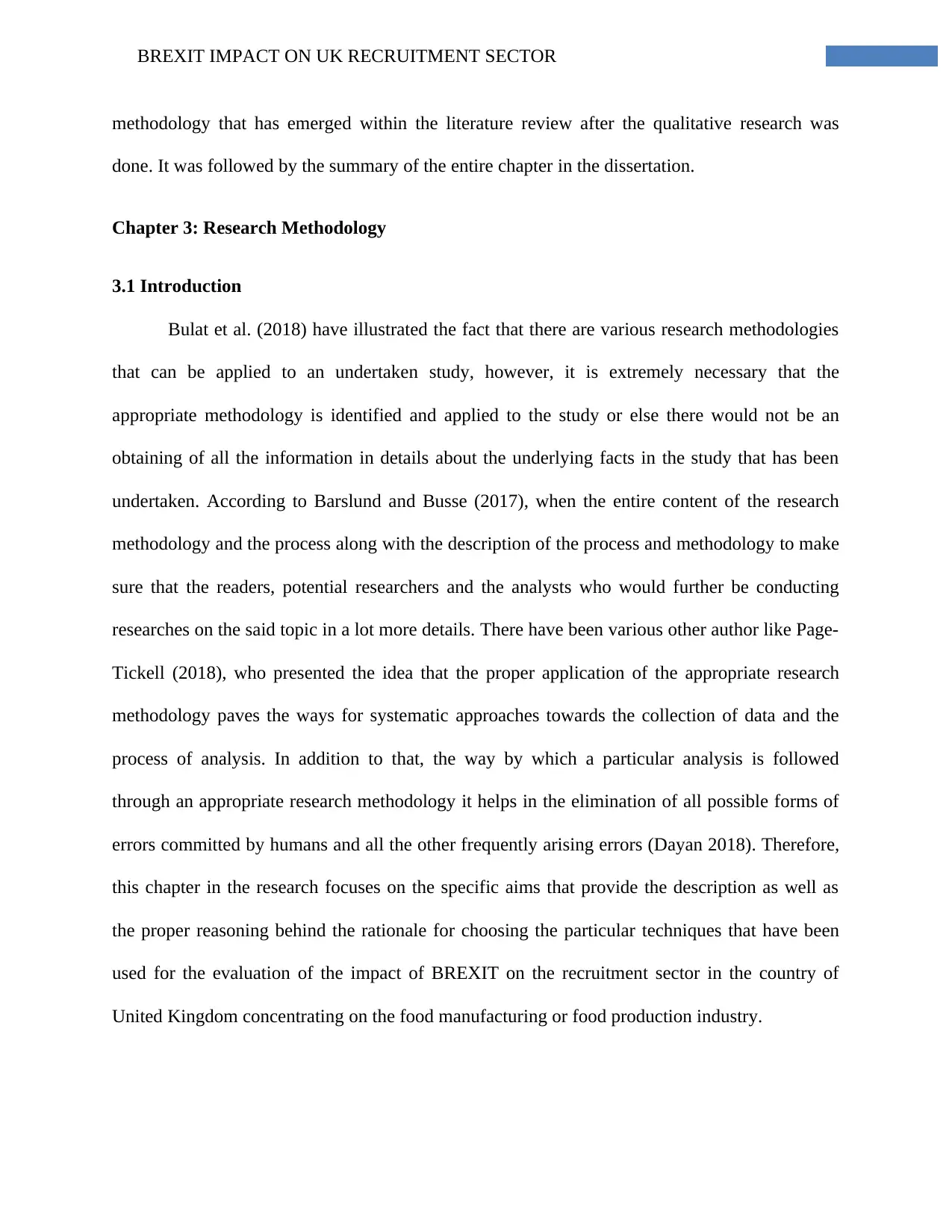
BREXIT IMPACT ON UK RECRUITMENT SECTOR
methodology that has emerged within the literature review after the qualitative research was
done. It was followed by the summary of the entire chapter in the dissertation.
Chapter 3: Research Methodology
3.1 Introduction
Bulat et al. (2018) have illustrated the fact that there are various research methodologies
that can be applied to an undertaken study, however, it is extremely necessary that the
appropriate methodology is identified and applied to the study or else there would not be an
obtaining of all the information in details about the underlying facts in the study that has been
undertaken. According to Barslund and Busse (2017), when the entire content of the research
methodology and the process along with the description of the process and methodology to make
sure that the readers, potential researchers and the analysts who would further be conducting
researches on the said topic in a lot more details. There have been various other author like Page-
Tickell (2018), who presented the idea that the proper application of the appropriate research
methodology paves the ways for systematic approaches towards the collection of data and the
process of analysis. In addition to that, the way by which a particular analysis is followed
through an appropriate research methodology it helps in the elimination of all possible forms of
errors committed by humans and all the other frequently arising errors (Dayan 2018). Therefore,
this chapter in the research focuses on the specific aims that provide the description as well as
the proper reasoning behind the rationale for choosing the particular techniques that have been
used for the evaluation of the impact of BREXIT on the recruitment sector in the country of
United Kingdom concentrating on the food manufacturing or food production industry.
methodology that has emerged within the literature review after the qualitative research was
done. It was followed by the summary of the entire chapter in the dissertation.
Chapter 3: Research Methodology
3.1 Introduction
Bulat et al. (2018) have illustrated the fact that there are various research methodologies
that can be applied to an undertaken study, however, it is extremely necessary that the
appropriate methodology is identified and applied to the study or else there would not be an
obtaining of all the information in details about the underlying facts in the study that has been
undertaken. According to Barslund and Busse (2017), when the entire content of the research
methodology and the process along with the description of the process and methodology to make
sure that the readers, potential researchers and the analysts who would further be conducting
researches on the said topic in a lot more details. There have been various other author like Page-
Tickell (2018), who presented the idea that the proper application of the appropriate research
methodology paves the ways for systematic approaches towards the collection of data and the
process of analysis. In addition to that, the way by which a particular analysis is followed
through an appropriate research methodology it helps in the elimination of all possible forms of
errors committed by humans and all the other frequently arising errors (Dayan 2018). Therefore,
this chapter in the research focuses on the specific aims that provide the description as well as
the proper reasoning behind the rationale for choosing the particular techniques that have been
used for the evaluation of the impact of BREXIT on the recruitment sector in the country of
United Kingdom concentrating on the food manufacturing or food production industry.
Paraphrase This Document
Need a fresh take? Get an instant paraphrase of this document with our AI Paraphraser
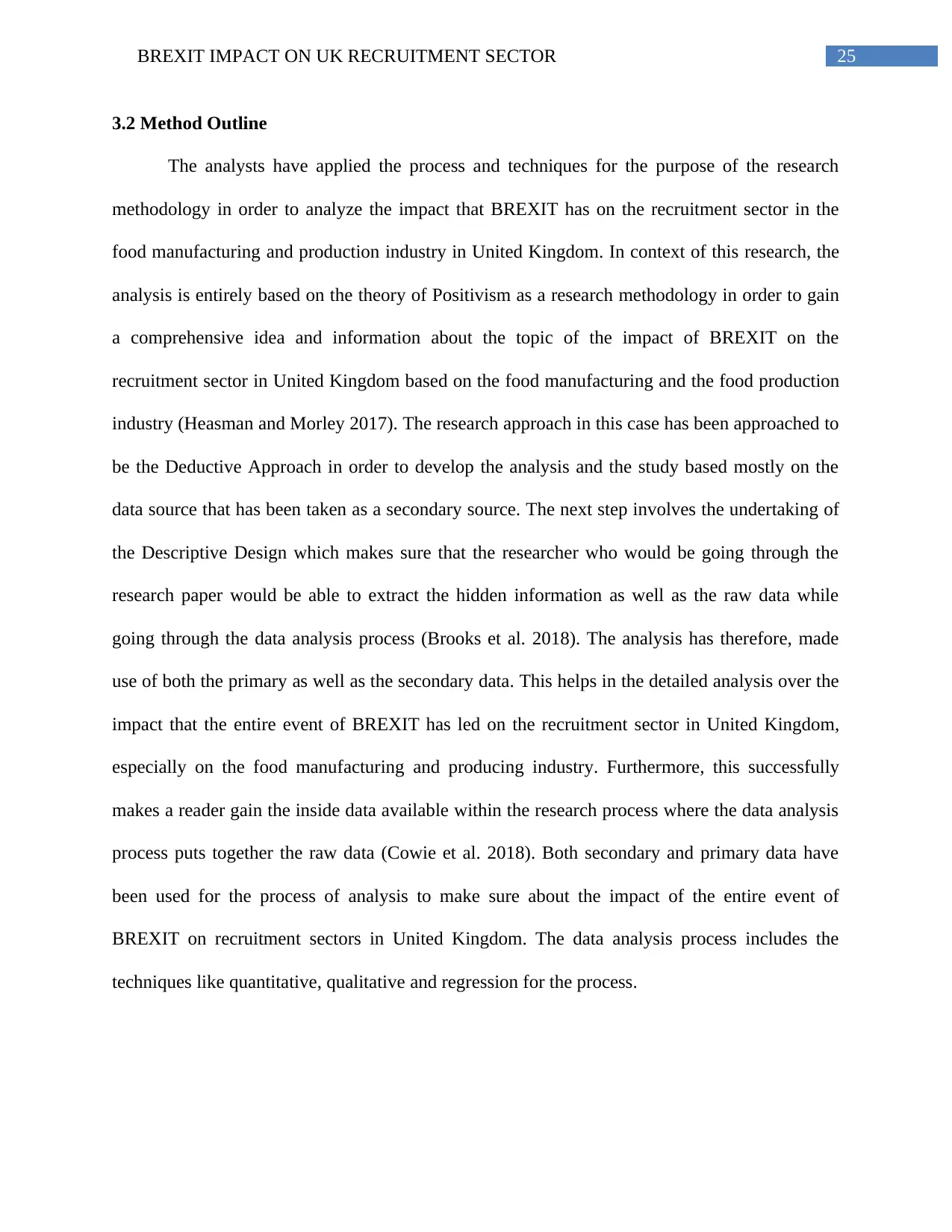
25BREXIT IMPACT ON UK RECRUITMENT SECTOR
3.2 Method Outline
The analysts have applied the process and techniques for the purpose of the research
methodology in order to analyze the impact that BREXIT has on the recruitment sector in the
food manufacturing and production industry in United Kingdom. In context of this research, the
analysis is entirely based on the theory of Positivism as a research methodology in order to gain
a comprehensive idea and information about the topic of the impact of BREXIT on the
recruitment sector in United Kingdom based on the food manufacturing and the food production
industry (Heasman and Morley 2017). The research approach in this case has been approached to
be the Deductive Approach in order to develop the analysis and the study based mostly on the
data source that has been taken as a secondary source. The next step involves the undertaking of
the Descriptive Design which makes sure that the researcher who would be going through the
research paper would be able to extract the hidden information as well as the raw data while
going through the data analysis process (Brooks et al. 2018). The analysis has therefore, made
use of both the primary as well as the secondary data. This helps in the detailed analysis over the
impact that the entire event of BREXIT has led on the recruitment sector in United Kingdom,
especially on the food manufacturing and producing industry. Furthermore, this successfully
makes a reader gain the inside data available within the research process where the data analysis
process puts together the raw data (Cowie et al. 2018). Both secondary and primary data have
been used for the process of analysis to make sure about the impact of the entire event of
BREXIT on recruitment sectors in United Kingdom. The data analysis process includes the
techniques like quantitative, qualitative and regression for the process.
3.2 Method Outline
The analysts have applied the process and techniques for the purpose of the research
methodology in order to analyze the impact that BREXIT has on the recruitment sector in the
food manufacturing and production industry in United Kingdom. In context of this research, the
analysis is entirely based on the theory of Positivism as a research methodology in order to gain
a comprehensive idea and information about the topic of the impact of BREXIT on the
recruitment sector in United Kingdom based on the food manufacturing and the food production
industry (Heasman and Morley 2017). The research approach in this case has been approached to
be the Deductive Approach in order to develop the analysis and the study based mostly on the
data source that has been taken as a secondary source. The next step involves the undertaking of
the Descriptive Design which makes sure that the researcher who would be going through the
research paper would be able to extract the hidden information as well as the raw data while
going through the data analysis process (Brooks et al. 2018). The analysis has therefore, made
use of both the primary as well as the secondary data. This helps in the detailed analysis over the
impact that the entire event of BREXIT has led on the recruitment sector in United Kingdom,
especially on the food manufacturing and producing industry. Furthermore, this successfully
makes a reader gain the inside data available within the research process where the data analysis
process puts together the raw data (Cowie et al. 2018). Both secondary and primary data have
been used for the process of analysis to make sure about the impact of the entire event of
BREXIT on recruitment sectors in United Kingdom. The data analysis process includes the
techniques like quantitative, qualitative and regression for the process.
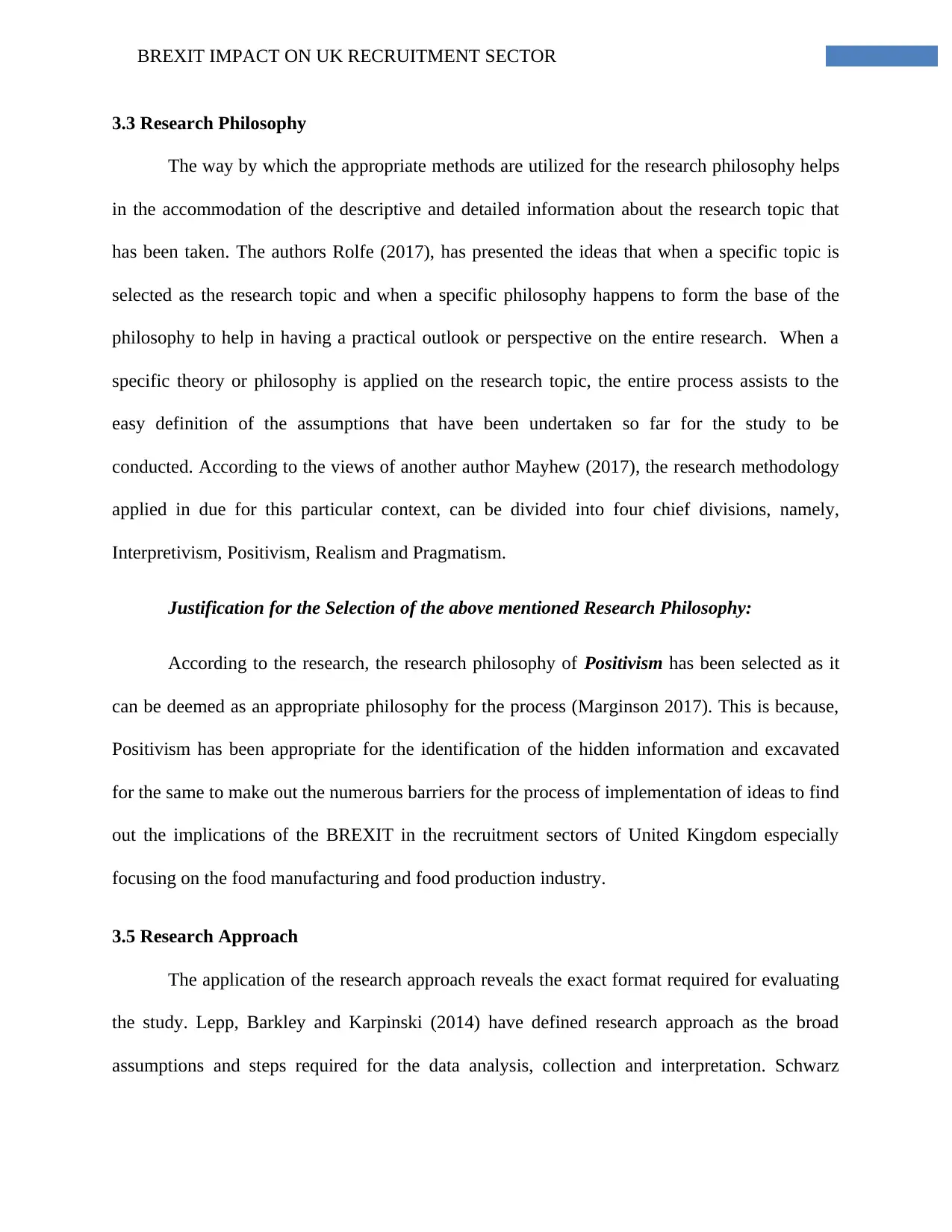
BREXIT IMPACT ON UK RECRUITMENT SECTOR
3.3 Research Philosophy
The way by which the appropriate methods are utilized for the research philosophy helps
in the accommodation of the descriptive and detailed information about the research topic that
has been taken. The authors Rolfe (2017), has presented the ideas that when a specific topic is
selected as the research topic and when a specific philosophy happens to form the base of the
philosophy to help in having a practical outlook or perspective on the entire research. When a
specific theory or philosophy is applied on the research topic, the entire process assists to the
easy definition of the assumptions that have been undertaken so far for the study to be
conducted. According to the views of another author Mayhew (2017), the research methodology
applied in due for this particular context, can be divided into four chief divisions, namely,
Interpretivism, Positivism, Realism and Pragmatism.
Justification for the Selection of the above mentioned Research Philosophy:
According to the research, the research philosophy of Positivism has been selected as it
can be deemed as an appropriate philosophy for the process (Marginson 2017). This is because,
Positivism has been appropriate for the identification of the hidden information and excavated
for the same to make out the numerous barriers for the process of implementation of ideas to find
out the implications of the BREXIT in the recruitment sectors of United Kingdom especially
focusing on the food manufacturing and food production industry.
3.5 Research Approach
The application of the research approach reveals the exact format required for evaluating
the study. Lepp, Barkley and Karpinski (2014) have defined research approach as the broad
assumptions and steps required for the data analysis, collection and interpretation. Schwarz
3.3 Research Philosophy
The way by which the appropriate methods are utilized for the research philosophy helps
in the accommodation of the descriptive and detailed information about the research topic that
has been taken. The authors Rolfe (2017), has presented the ideas that when a specific topic is
selected as the research topic and when a specific philosophy happens to form the base of the
philosophy to help in having a practical outlook or perspective on the entire research. When a
specific theory or philosophy is applied on the research topic, the entire process assists to the
easy definition of the assumptions that have been undertaken so far for the study to be
conducted. According to the views of another author Mayhew (2017), the research methodology
applied in due for this particular context, can be divided into four chief divisions, namely,
Interpretivism, Positivism, Realism and Pragmatism.
Justification for the Selection of the above mentioned Research Philosophy:
According to the research, the research philosophy of Positivism has been selected as it
can be deemed as an appropriate philosophy for the process (Marginson 2017). This is because,
Positivism has been appropriate for the identification of the hidden information and excavated
for the same to make out the numerous barriers for the process of implementation of ideas to find
out the implications of the BREXIT in the recruitment sectors of United Kingdom especially
focusing on the food manufacturing and food production industry.
3.5 Research Approach
The application of the research approach reveals the exact format required for evaluating
the study. Lepp, Barkley and Karpinski (2014) have defined research approach as the broad
assumptions and steps required for the data analysis, collection and interpretation. Schwarz

27BREXIT IMPACT ON UK RECRUITMENT SECTOR
(2014) have showed that, research approach can be broadly divided into three division namely
deductive research approach, abductive research approach and inductive research approach.
Justification of Selecting the Particular Approach:
The author has selected Deductive Approach for conducting the study. The application of
the deductive approach has revealed the path of research from the developing the hypothesis and
analyzing the objective (Jay, Davies and Reid 2016). The deductive process ensured the
authenticity of the hypothesis by examining the criteria for rejection and selection. Apart from
that, since no new concept or theory has been proposed in this study, the selection of inductive
and abductive research approach has been eliminated.
3.6 Research Design
According to Creswell (2013), the appropriate design in research methodology frames the
path for defining the framework for the collection and analysis of the data. Applying any
particular method in design provides better description and detailed of the undertaken topic.
Padgett (2016) showed the research design have been characterized into two divisions namely
Conclusive Research Design and Exploratory Research Design.
Justification of Selecting the Particular Design:
Conclusive Research Design has been chosen appropriate for conducting the study. The
application of the conclusive research design has assisted in specifying the process required for
the data analysis and collection. In addition to that, the application of conclusive design helps in
imitating the application of generalized assumptions for providing quantitative information.
(2014) have showed that, research approach can be broadly divided into three division namely
deductive research approach, abductive research approach and inductive research approach.
Justification of Selecting the Particular Approach:
The author has selected Deductive Approach for conducting the study. The application of
the deductive approach has revealed the path of research from the developing the hypothesis and
analyzing the objective (Jay, Davies and Reid 2016). The deductive process ensured the
authenticity of the hypothesis by examining the criteria for rejection and selection. Apart from
that, since no new concept or theory has been proposed in this study, the selection of inductive
and abductive research approach has been eliminated.
3.6 Research Design
According to Creswell (2013), the appropriate design in research methodology frames the
path for defining the framework for the collection and analysis of the data. Applying any
particular method in design provides better description and detailed of the undertaken topic.
Padgett (2016) showed the research design have been characterized into two divisions namely
Conclusive Research Design and Exploratory Research Design.
Justification of Selecting the Particular Design:
Conclusive Research Design has been chosen appropriate for conducting the study. The
application of the conclusive research design has assisted in specifying the process required for
the data analysis and collection. In addition to that, the application of conclusive design helps in
imitating the application of generalized assumptions for providing quantitative information.
Secure Best Marks with AI Grader
Need help grading? Try our AI Grader for instant feedback on your assignments.
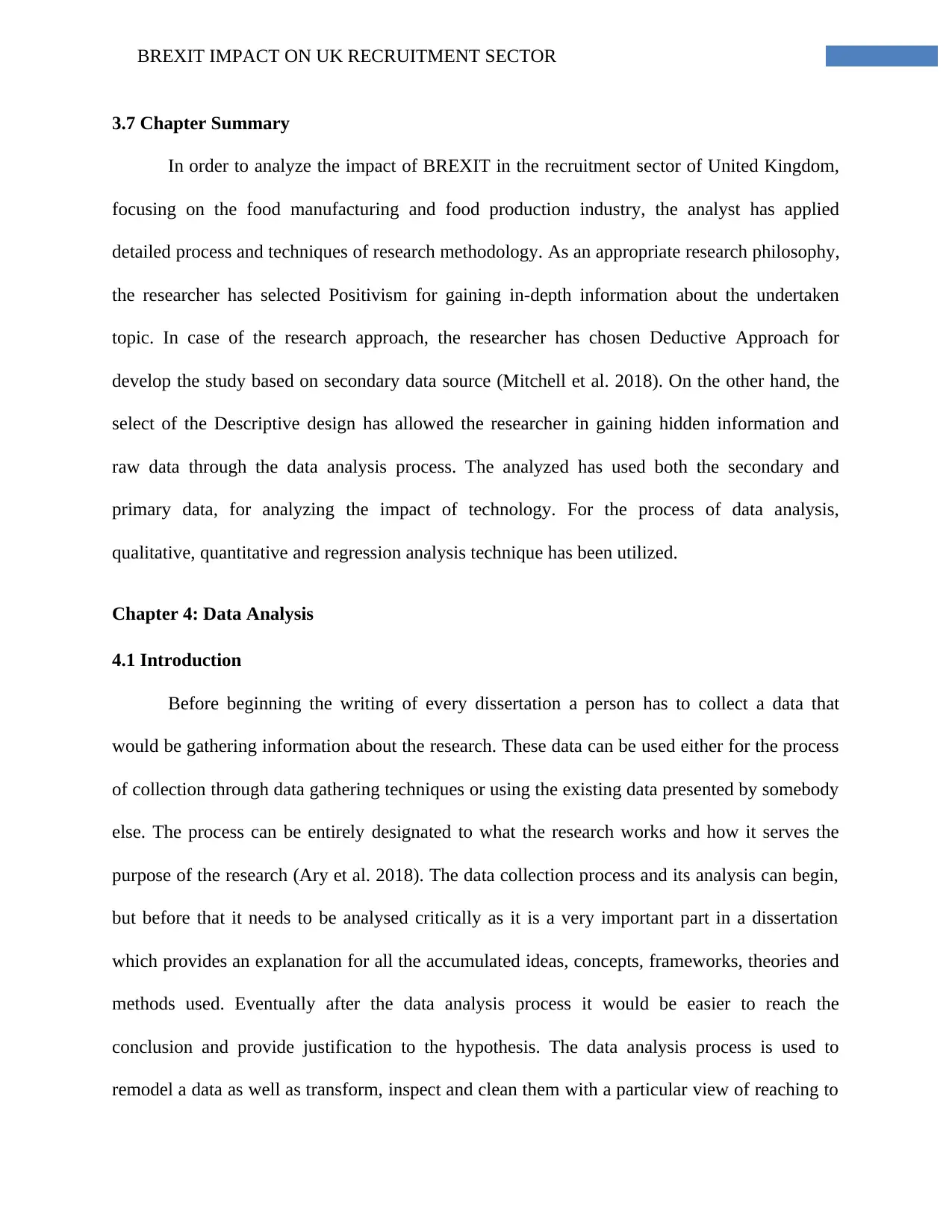
BREXIT IMPACT ON UK RECRUITMENT SECTOR
3.7 Chapter Summary
In order to analyze the impact of BREXIT in the recruitment sector of United Kingdom,
focusing on the food manufacturing and food production industry, the analyst has applied
detailed process and techniques of research methodology. As an appropriate research philosophy,
the researcher has selected Positivism for gaining in-depth information about the undertaken
topic. In case of the research approach, the researcher has chosen Deductive Approach for
develop the study based on secondary data source (Mitchell et al. 2018). On the other hand, the
select of the Descriptive design has allowed the researcher in gaining hidden information and
raw data through the data analysis process. The analyzed has used both the secondary and
primary data, for analyzing the impact of technology. For the process of data analysis,
qualitative, quantitative and regression analysis technique has been utilized.
Chapter 4: Data Analysis
4.1 Introduction
Before beginning the writing of every dissertation a person has to collect a data that
would be gathering information about the research. These data can be used either for the process
of collection through data gathering techniques or using the existing data presented by somebody
else. The process can be entirely designated to what the research works and how it serves the
purpose of the research (Ary et al. 2018). The data collection process and its analysis can begin,
but before that it needs to be analysed critically as it is a very important part in a dissertation
which provides an explanation for all the accumulated ideas, concepts, frameworks, theories and
methods used. Eventually after the data analysis process it would be easier to reach the
conclusion and provide justification to the hypothesis. The data analysis process is used to
remodel a data as well as transform, inspect and clean them with a particular view of reaching to
3.7 Chapter Summary
In order to analyze the impact of BREXIT in the recruitment sector of United Kingdom,
focusing on the food manufacturing and food production industry, the analyst has applied
detailed process and techniques of research methodology. As an appropriate research philosophy,
the researcher has selected Positivism for gaining in-depth information about the undertaken
topic. In case of the research approach, the researcher has chosen Deductive Approach for
develop the study based on secondary data source (Mitchell et al. 2018). On the other hand, the
select of the Descriptive design has allowed the researcher in gaining hidden information and
raw data through the data analysis process. The analyzed has used both the secondary and
primary data, for analyzing the impact of technology. For the process of data analysis,
qualitative, quantitative and regression analysis technique has been utilized.
Chapter 4: Data Analysis
4.1 Introduction
Before beginning the writing of every dissertation a person has to collect a data that
would be gathering information about the research. These data can be used either for the process
of collection through data gathering techniques or using the existing data presented by somebody
else. The process can be entirely designated to what the research works and how it serves the
purpose of the research (Ary et al. 2018). The data collection process and its analysis can begin,
but before that it needs to be analysed critically as it is a very important part in a dissertation
which provides an explanation for all the accumulated ideas, concepts, frameworks, theories and
methods used. Eventually after the data analysis process it would be easier to reach the
conclusion and provide justification to the hypothesis. The data analysis process is used to
remodel a data as well as transform, inspect and clean them with a particular view of reaching to
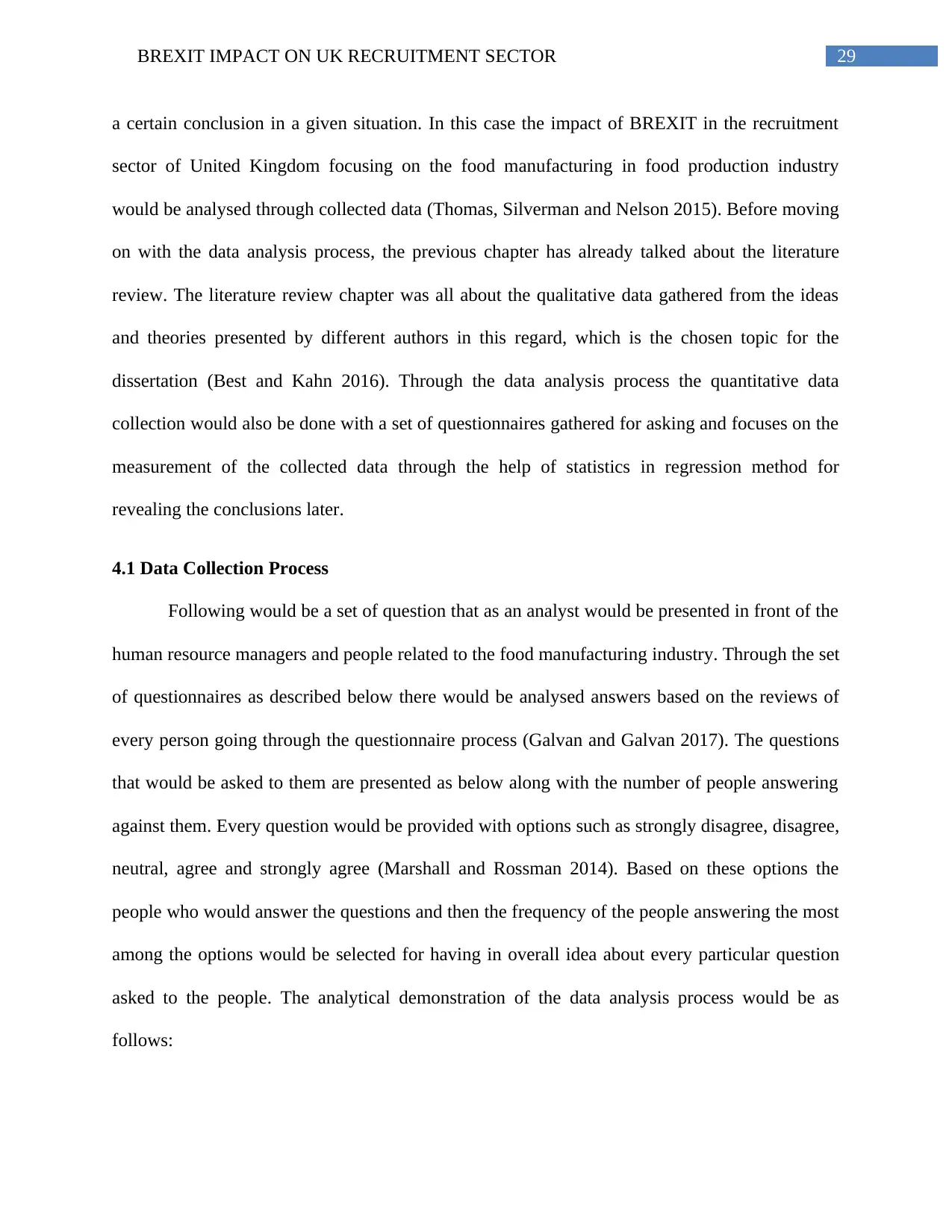
29BREXIT IMPACT ON UK RECRUITMENT SECTOR
a certain conclusion in a given situation. In this case the impact of BREXIT in the recruitment
sector of United Kingdom focusing on the food manufacturing in food production industry
would be analysed through collected data (Thomas, Silverman and Nelson 2015). Before moving
on with the data analysis process, the previous chapter has already talked about the literature
review. The literature review chapter was all about the qualitative data gathered from the ideas
and theories presented by different authors in this regard, which is the chosen topic for the
dissertation (Best and Kahn 2016). Through the data analysis process the quantitative data
collection would also be done with a set of questionnaires gathered for asking and focuses on the
measurement of the collected data through the help of statistics in regression method for
revealing the conclusions later.
4.1 Data Collection Process
Following would be a set of question that as an analyst would be presented in front of the
human resource managers and people related to the food manufacturing industry. Through the set
of questionnaires as described below there would be analysed answers based on the reviews of
every person going through the questionnaire process (Galvan and Galvan 2017). The questions
that would be asked to them are presented as below along with the number of people answering
against them. Every question would be provided with options such as strongly disagree, disagree,
neutral, agree and strongly agree (Marshall and Rossman 2014). Based on these options the
people who would answer the questions and then the frequency of the people answering the most
among the options would be selected for having in overall idea about every particular question
asked to the people. The analytical demonstration of the data analysis process would be as
follows:
a certain conclusion in a given situation. In this case the impact of BREXIT in the recruitment
sector of United Kingdom focusing on the food manufacturing in food production industry
would be analysed through collected data (Thomas, Silverman and Nelson 2015). Before moving
on with the data analysis process, the previous chapter has already talked about the literature
review. The literature review chapter was all about the qualitative data gathered from the ideas
and theories presented by different authors in this regard, which is the chosen topic for the
dissertation (Best and Kahn 2016). Through the data analysis process the quantitative data
collection would also be done with a set of questionnaires gathered for asking and focuses on the
measurement of the collected data through the help of statistics in regression method for
revealing the conclusions later.
4.1 Data Collection Process
Following would be a set of question that as an analyst would be presented in front of the
human resource managers and people related to the food manufacturing industry. Through the set
of questionnaires as described below there would be analysed answers based on the reviews of
every person going through the questionnaire process (Galvan and Galvan 2017). The questions
that would be asked to them are presented as below along with the number of people answering
against them. Every question would be provided with options such as strongly disagree, disagree,
neutral, agree and strongly agree (Marshall and Rossman 2014). Based on these options the
people who would answer the questions and then the frequency of the people answering the most
among the options would be selected for having in overall idea about every particular question
asked to the people. The analytical demonstration of the data analysis process would be as
follows:

BREXIT IMPACT ON UK RECRUITMENT SECTOR
Questionnaire Analysis:
1. Do you think the food and manufacturing industry in United Kingdom will be
affected as a result of BREXIT?
Options Frequency Percentag
e
Total
Strongly
Disagree
1 2% 50
Disagree 6 12% 50
Neutral 4 8% 50
Agree 17 34% 50
Strongly Agree 22 44% 50
Table: Do you think the food and manufacturing industry in United Kingdom will be
affected as a result of BREXIT?
Strongly
Disagree Disagree Neutral Agree Strongly
Agree
0%
5%
10%
15%
20%
25%
30%
35%
40%
45%
50%
2%
12% 8%
34%
44%
Figure: Do you think the food and manufacturing industry in United Kingdom will be
affected as a result of BREXIT?
Questionnaire Analysis:
1. Do you think the food and manufacturing industry in United Kingdom will be
affected as a result of BREXIT?
Options Frequency Percentag
e
Total
Strongly
Disagree
1 2% 50
Disagree 6 12% 50
Neutral 4 8% 50
Agree 17 34% 50
Strongly Agree 22 44% 50
Table: Do you think the food and manufacturing industry in United Kingdom will be
affected as a result of BREXIT?
Strongly
Disagree Disagree Neutral Agree Strongly
Agree
0%
5%
10%
15%
20%
25%
30%
35%
40%
45%
50%
2%
12% 8%
34%
44%
Figure: Do you think the food and manufacturing industry in United Kingdom will be
affected as a result of BREXIT?
Paraphrase This Document
Need a fresh take? Get an instant paraphrase of this document with our AI Paraphraser
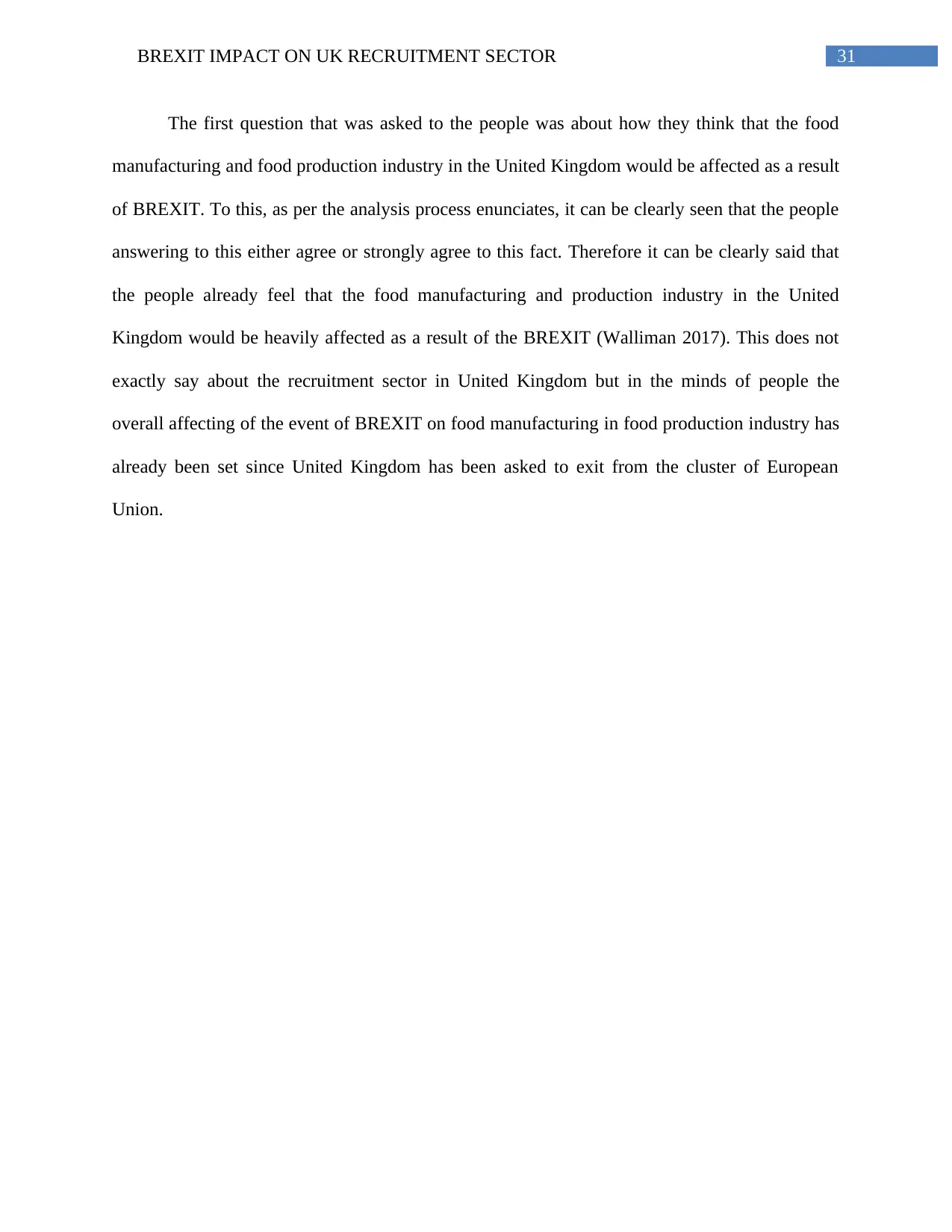
31BREXIT IMPACT ON UK RECRUITMENT SECTOR
The first question that was asked to the people was about how they think that the food
manufacturing and food production industry in the United Kingdom would be affected as a result
of BREXIT. To this, as per the analysis process enunciates, it can be clearly seen that the people
answering to this either agree or strongly agree to this fact. Therefore it can be clearly said that
the people already feel that the food manufacturing and production industry in the United
Kingdom would be heavily affected as a result of the BREXIT (Walliman 2017). This does not
exactly say about the recruitment sector in United Kingdom but in the minds of people the
overall affecting of the event of BREXIT on food manufacturing in food production industry has
already been set since United Kingdom has been asked to exit from the cluster of European
Union.
The first question that was asked to the people was about how they think that the food
manufacturing and food production industry in the United Kingdom would be affected as a result
of BREXIT. To this, as per the analysis process enunciates, it can be clearly seen that the people
answering to this either agree or strongly agree to this fact. Therefore it can be clearly said that
the people already feel that the food manufacturing and production industry in the United
Kingdom would be heavily affected as a result of the BREXIT (Walliman 2017). This does not
exactly say about the recruitment sector in United Kingdom but in the minds of people the
overall affecting of the event of BREXIT on food manufacturing in food production industry has
already been set since United Kingdom has been asked to exit from the cluster of European
Union.
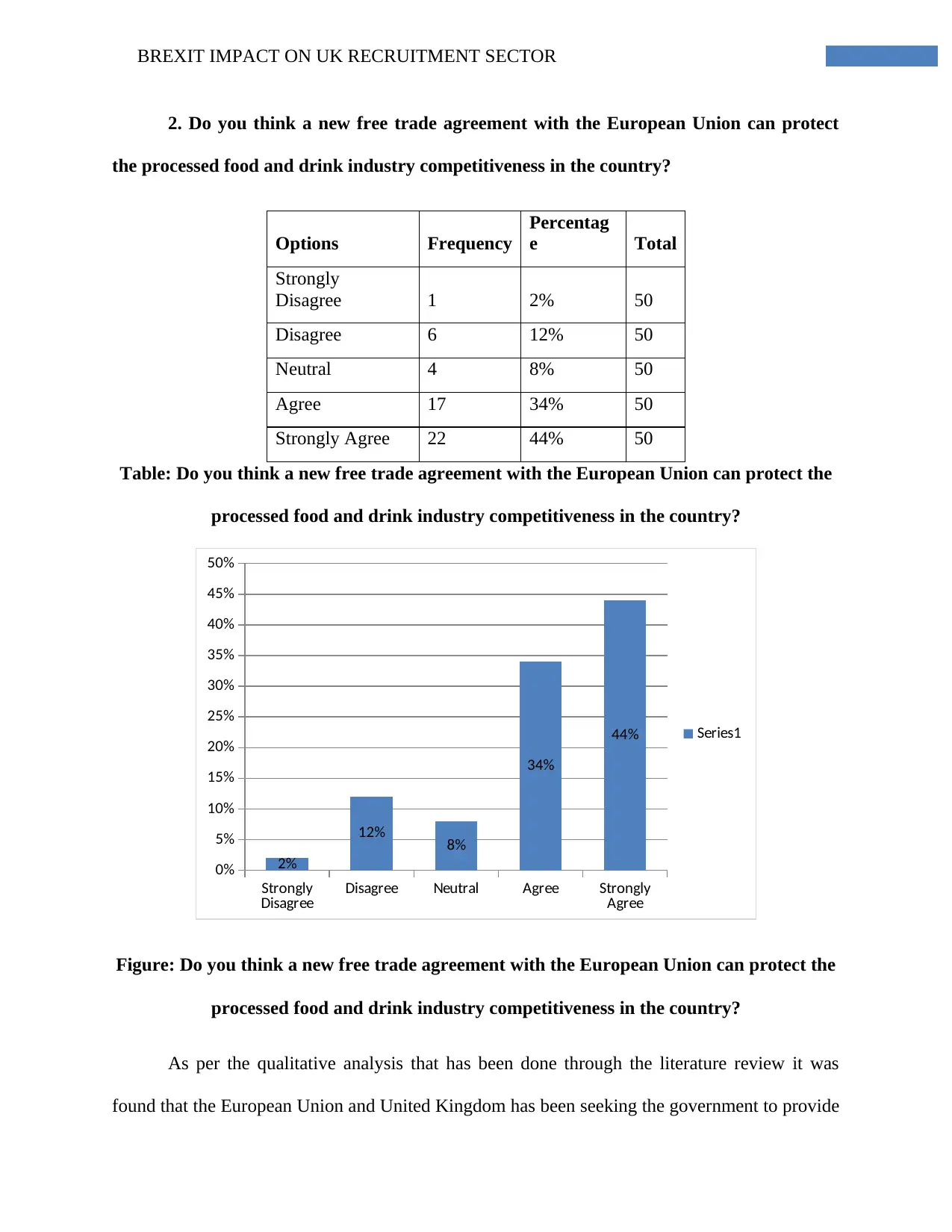
BREXIT IMPACT ON UK RECRUITMENT SECTOR
2. Do you think a new free trade agreement with the European Union can protect
the processed food and drink industry competitiveness in the country?
Options Frequency
Percentag
e Total
Strongly
Disagree 1 2% 50
Disagree 6 12% 50
Neutral 4 8% 50
Agree 17 34% 50
Strongly Agree 22 44% 50
Table: Do you think a new free trade agreement with the European Union can protect the
processed food and drink industry competitiveness in the country?
Strongly
Disagree Disagree Neutral Agree Strongly
Agree
0%
5%
10%
15%
20%
25%
30%
35%
40%
45%
50%
2%
12% 8%
34%
44% Series1
Figure: Do you think a new free trade agreement with the European Union can protect the
processed food and drink industry competitiveness in the country?
As per the qualitative analysis that has been done through the literature review it was
found that the European Union and United Kingdom has been seeking the government to provide
2. Do you think a new free trade agreement with the European Union can protect
the processed food and drink industry competitiveness in the country?
Options Frequency
Percentag
e Total
Strongly
Disagree 1 2% 50
Disagree 6 12% 50
Neutral 4 8% 50
Agree 17 34% 50
Strongly Agree 22 44% 50
Table: Do you think a new free trade agreement with the European Union can protect the
processed food and drink industry competitiveness in the country?
Strongly
Disagree Disagree Neutral Agree Strongly
Agree
0%
5%
10%
15%
20%
25%
30%
35%
40%
45%
50%
2%
12% 8%
34%
44% Series1
Figure: Do you think a new free trade agreement with the European Union can protect the
processed food and drink industry competitiveness in the country?
As per the qualitative analysis that has been done through the literature review it was
found that the European Union and United Kingdom has been seeking the government to provide
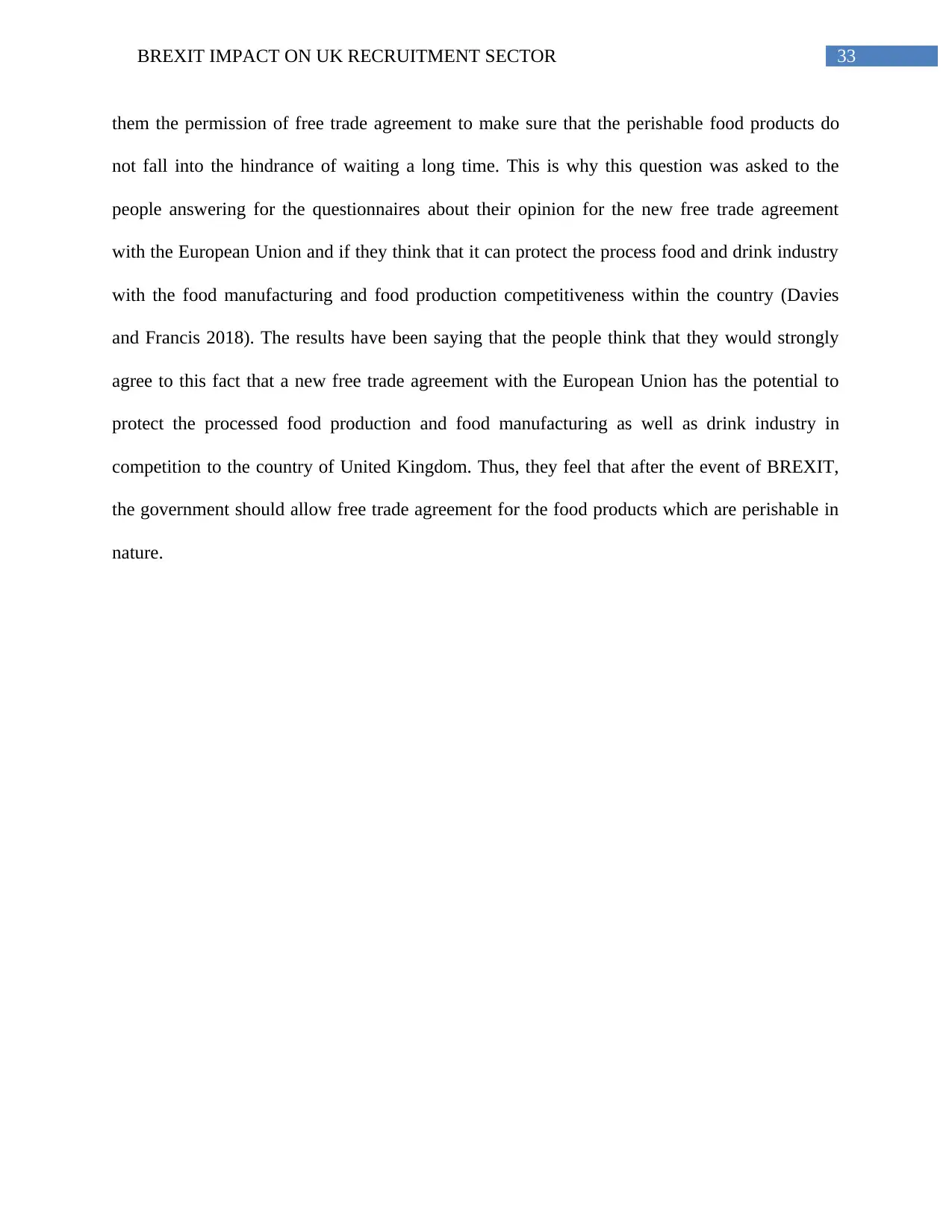
33BREXIT IMPACT ON UK RECRUITMENT SECTOR
them the permission of free trade agreement to make sure that the perishable food products do
not fall into the hindrance of waiting a long time. This is why this question was asked to the
people answering for the questionnaires about their opinion for the new free trade agreement
with the European Union and if they think that it can protect the process food and drink industry
with the food manufacturing and food production competitiveness within the country (Davies
and Francis 2018). The results have been saying that the people think that they would strongly
agree to this fact that a new free trade agreement with the European Union has the potential to
protect the processed food production and food manufacturing as well as drink industry in
competition to the country of United Kingdom. Thus, they feel that after the event of BREXIT,
the government should allow free trade agreement for the food products which are perishable in
nature.
them the permission of free trade agreement to make sure that the perishable food products do
not fall into the hindrance of waiting a long time. This is why this question was asked to the
people answering for the questionnaires about their opinion for the new free trade agreement
with the European Union and if they think that it can protect the process food and drink industry
with the food manufacturing and food production competitiveness within the country (Davies
and Francis 2018). The results have been saying that the people think that they would strongly
agree to this fact that a new free trade agreement with the European Union has the potential to
protect the processed food production and food manufacturing as well as drink industry in
competition to the country of United Kingdom. Thus, they feel that after the event of BREXIT,
the government should allow free trade agreement for the food products which are perishable in
nature.
Secure Best Marks with AI Grader
Need help grading? Try our AI Grader for instant feedback on your assignments.
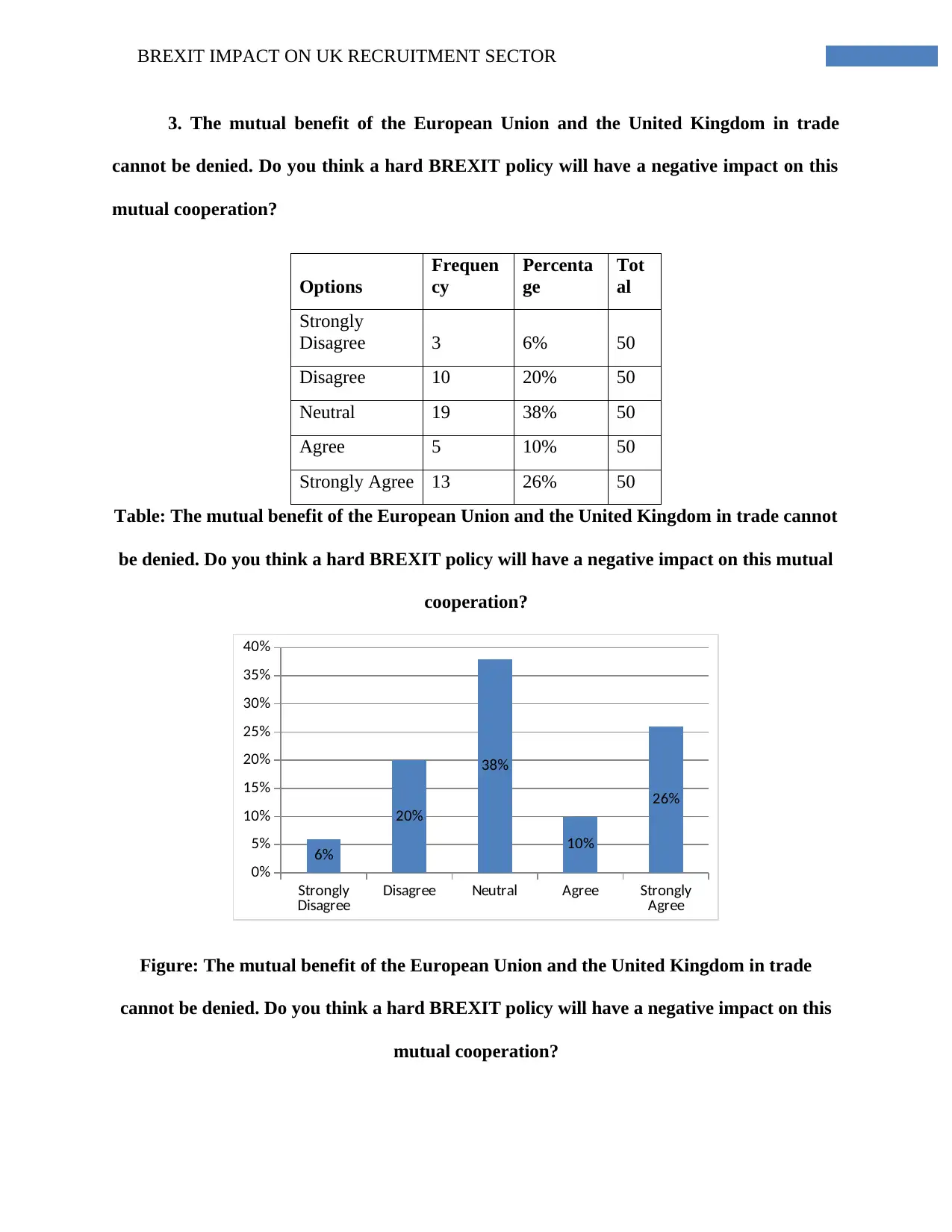
BREXIT IMPACT ON UK RECRUITMENT SECTOR
3. The mutual benefit of the European Union and the United Kingdom in trade
cannot be denied. Do you think a hard BREXIT policy will have a negative impact on this
mutual cooperation?
Options
Frequen
cy
Percenta
ge
Tot
al
Strongly
Disagree 3 6% 50
Disagree 10 20% 50
Neutral 19 38% 50
Agree 5 10% 50
Strongly Agree 13 26% 50
Table: The mutual benefit of the European Union and the United Kingdom in trade cannot
be denied. Do you think a hard BREXIT policy will have a negative impact on this mutual
cooperation?
Strongly
Disagree Disagree Neutral Agree Strongly
Agree
0%
5%
10%
15%
20%
25%
30%
35%
40%
6%
20%
38%
10%
26%
Figure: The mutual benefit of the European Union and the United Kingdom in trade
cannot be denied. Do you think a hard BREXIT policy will have a negative impact on this
mutual cooperation?
3. The mutual benefit of the European Union and the United Kingdom in trade
cannot be denied. Do you think a hard BREXIT policy will have a negative impact on this
mutual cooperation?
Options
Frequen
cy
Percenta
ge
Tot
al
Strongly
Disagree 3 6% 50
Disagree 10 20% 50
Neutral 19 38% 50
Agree 5 10% 50
Strongly Agree 13 26% 50
Table: The mutual benefit of the European Union and the United Kingdom in trade cannot
be denied. Do you think a hard BREXIT policy will have a negative impact on this mutual
cooperation?
Strongly
Disagree Disagree Neutral Agree Strongly
Agree
0%
5%
10%
15%
20%
25%
30%
35%
40%
6%
20%
38%
10%
26%
Figure: The mutual benefit of the European Union and the United Kingdom in trade
cannot be denied. Do you think a hard BREXIT policy will have a negative impact on this
mutual cooperation?
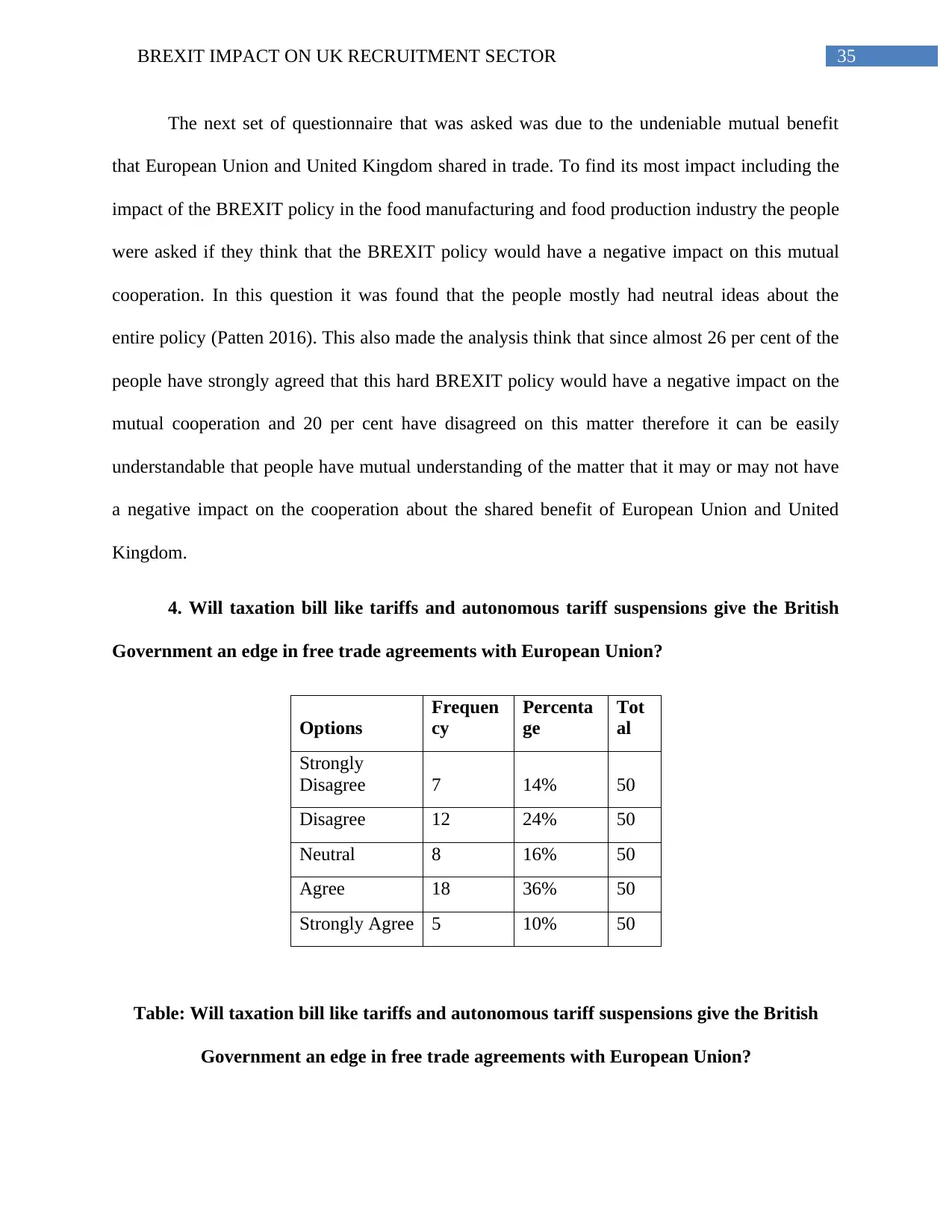
35BREXIT IMPACT ON UK RECRUITMENT SECTOR
The next set of questionnaire that was asked was due to the undeniable mutual benefit
that European Union and United Kingdom shared in trade. To find its most impact including the
impact of the BREXIT policy in the food manufacturing and food production industry the people
were asked if they think that the BREXIT policy would have a negative impact on this mutual
cooperation. In this question it was found that the people mostly had neutral ideas about the
entire policy (Patten 2016). This also made the analysis think that since almost 26 per cent of the
people have strongly agreed that this hard BREXIT policy would have a negative impact on the
mutual cooperation and 20 per cent have disagreed on this matter therefore it can be easily
understandable that people have mutual understanding of the matter that it may or may not have
a negative impact on the cooperation about the shared benefit of European Union and United
Kingdom.
4. Will taxation bill like tariffs and autonomous tariff suspensions give the British
Government an edge in free trade agreements with European Union?
Options
Frequen
cy
Percenta
ge
Tot
al
Strongly
Disagree 7 14% 50
Disagree 12 24% 50
Neutral 8 16% 50
Agree 18 36% 50
Strongly Agree 5 10% 50
Table: Will taxation bill like tariffs and autonomous tariff suspensions give the British
Government an edge in free trade agreements with European Union?
The next set of questionnaire that was asked was due to the undeniable mutual benefit
that European Union and United Kingdom shared in trade. To find its most impact including the
impact of the BREXIT policy in the food manufacturing and food production industry the people
were asked if they think that the BREXIT policy would have a negative impact on this mutual
cooperation. In this question it was found that the people mostly had neutral ideas about the
entire policy (Patten 2016). This also made the analysis think that since almost 26 per cent of the
people have strongly agreed that this hard BREXIT policy would have a negative impact on the
mutual cooperation and 20 per cent have disagreed on this matter therefore it can be easily
understandable that people have mutual understanding of the matter that it may or may not have
a negative impact on the cooperation about the shared benefit of European Union and United
Kingdom.
4. Will taxation bill like tariffs and autonomous tariff suspensions give the British
Government an edge in free trade agreements with European Union?
Options
Frequen
cy
Percenta
ge
Tot
al
Strongly
Disagree 7 14% 50
Disagree 12 24% 50
Neutral 8 16% 50
Agree 18 36% 50
Strongly Agree 5 10% 50
Table: Will taxation bill like tariffs and autonomous tariff suspensions give the British
Government an edge in free trade agreements with European Union?

BREXIT IMPACT ON UK RECRUITMENT SECTOR
Strongly
Disagree Disagree Neutral Agree Strongly
Agree
0%
5%
10%
15%
20%
25%
30%
35%
40%
14%
24%
16%
36%
10%
Series1
Figure: Will taxation bill like tariffs and autonomous tariff suspensions give the British
Government an edge in free trade agreements with European Union?
In the next set of questionnaire the taxation bill like tariffs in autonomous tariff
suspensions had been discuss with the people taken for the questionnaire. They have been asked
about their opinion about the taxation be like tariff and autonomous tariff suspension in giving
the British government and age in free trade agreements with European Union. As a reply to this
question, 36 per cent of people have agreed to the situation whereas 24 per cent of people do
agree that the taxation will like tariff and economic statics suspension would give British
government and age in the free trade agreements with European Union (Bell, Bryman and Harley
2018). Therefore from this question is that we can understand that people are of much a neutral
situation about the impact of BREXIT in tariffs and autonomous tariff suspensions. the
collectively of the opinion that taxation bills me or may not give the British government and
engine free trade agreements with the European Union.
Strongly
Disagree Disagree Neutral Agree Strongly
Agree
0%
5%
10%
15%
20%
25%
30%
35%
40%
14%
24%
16%
36%
10%
Series1
Figure: Will taxation bill like tariffs and autonomous tariff suspensions give the British
Government an edge in free trade agreements with European Union?
In the next set of questionnaire the taxation bill like tariffs in autonomous tariff
suspensions had been discuss with the people taken for the questionnaire. They have been asked
about their opinion about the taxation be like tariff and autonomous tariff suspension in giving
the British government and age in free trade agreements with European Union. As a reply to this
question, 36 per cent of people have agreed to the situation whereas 24 per cent of people do
agree that the taxation will like tariff and economic statics suspension would give British
government and age in the free trade agreements with European Union (Bell, Bryman and Harley
2018). Therefore from this question is that we can understand that people are of much a neutral
situation about the impact of BREXIT in tariffs and autonomous tariff suspensions. the
collectively of the opinion that taxation bills me or may not give the British government and
engine free trade agreements with the European Union.
Paraphrase This Document
Need a fresh take? Get an instant paraphrase of this document with our AI Paraphraser
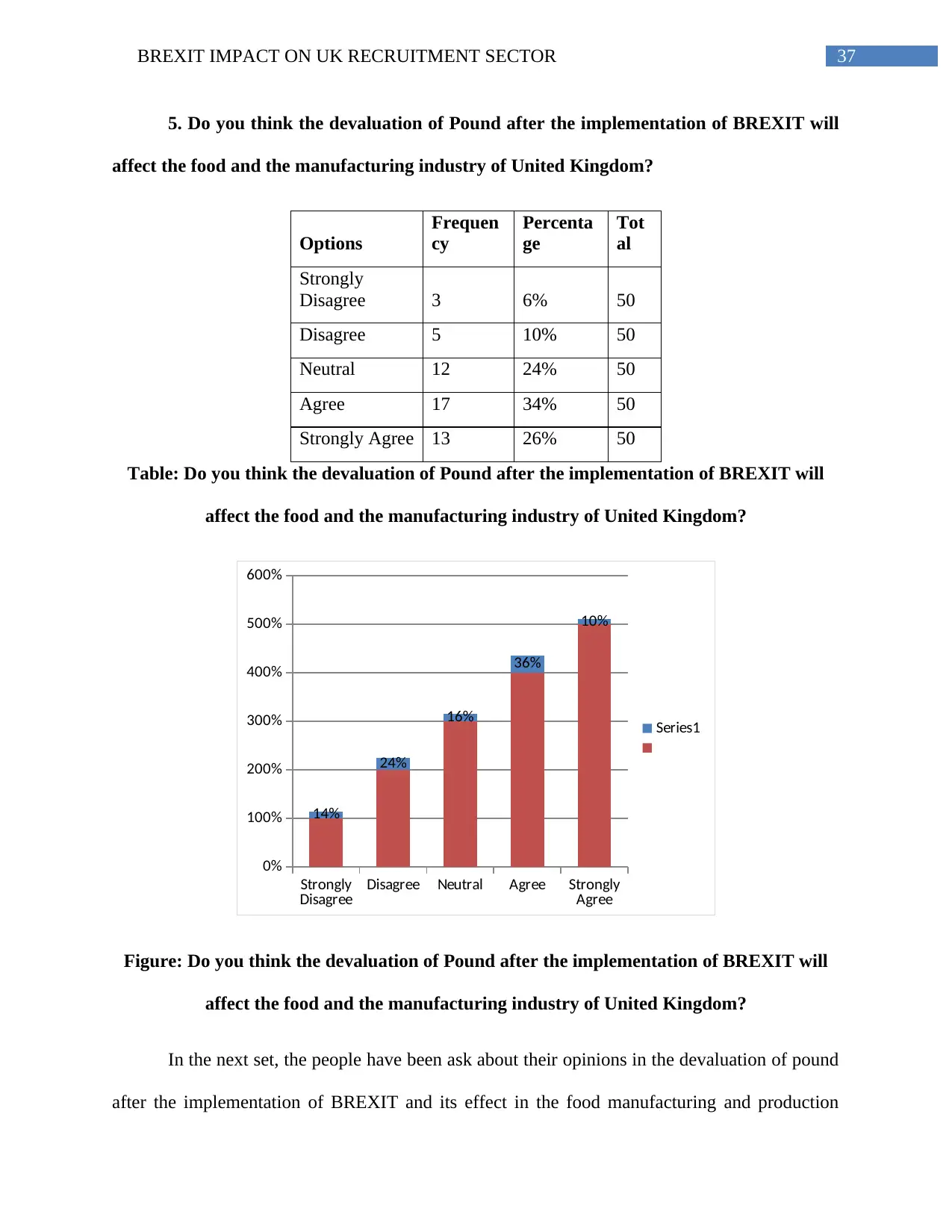
37BREXIT IMPACT ON UK RECRUITMENT SECTOR
5. Do you think the devaluation of Pound after the implementation of BREXIT will
affect the food and the manufacturing industry of United Kingdom?
Options
Frequen
cy
Percenta
ge
Tot
al
Strongly
Disagree 3 6% 50
Disagree 5 10% 50
Neutral 12 24% 50
Agree 17 34% 50
Strongly Agree 13 26% 50
Table: Do you think the devaluation of Pound after the implementation of BREXIT will
affect the food and the manufacturing industry of United Kingdom?
Strongly
Disagree Disagree Neutral Agree Strongly
Agree
0%
100%
200%
300%
400%
500%
600%
14%
24%
16%
36%
10%
Series1
Figure: Do you think the devaluation of Pound after the implementation of BREXIT will
affect the food and the manufacturing industry of United Kingdom?
In the next set, the people have been ask about their opinions in the devaluation of pound
after the implementation of BREXIT and its effect in the food manufacturing and production
5. Do you think the devaluation of Pound after the implementation of BREXIT will
affect the food and the manufacturing industry of United Kingdom?
Options
Frequen
cy
Percenta
ge
Tot
al
Strongly
Disagree 3 6% 50
Disagree 5 10% 50
Neutral 12 24% 50
Agree 17 34% 50
Strongly Agree 13 26% 50
Table: Do you think the devaluation of Pound after the implementation of BREXIT will
affect the food and the manufacturing industry of United Kingdom?
Strongly
Disagree Disagree Neutral Agree Strongly
Agree
0%
100%
200%
300%
400%
500%
600%
14%
24%
16%
36%
10%
Series1
Figure: Do you think the devaluation of Pound after the implementation of BREXIT will
affect the food and the manufacturing industry of United Kingdom?
In the next set, the people have been ask about their opinions in the devaluation of pound
after the implementation of BREXIT and its effect in the food manufacturing and production
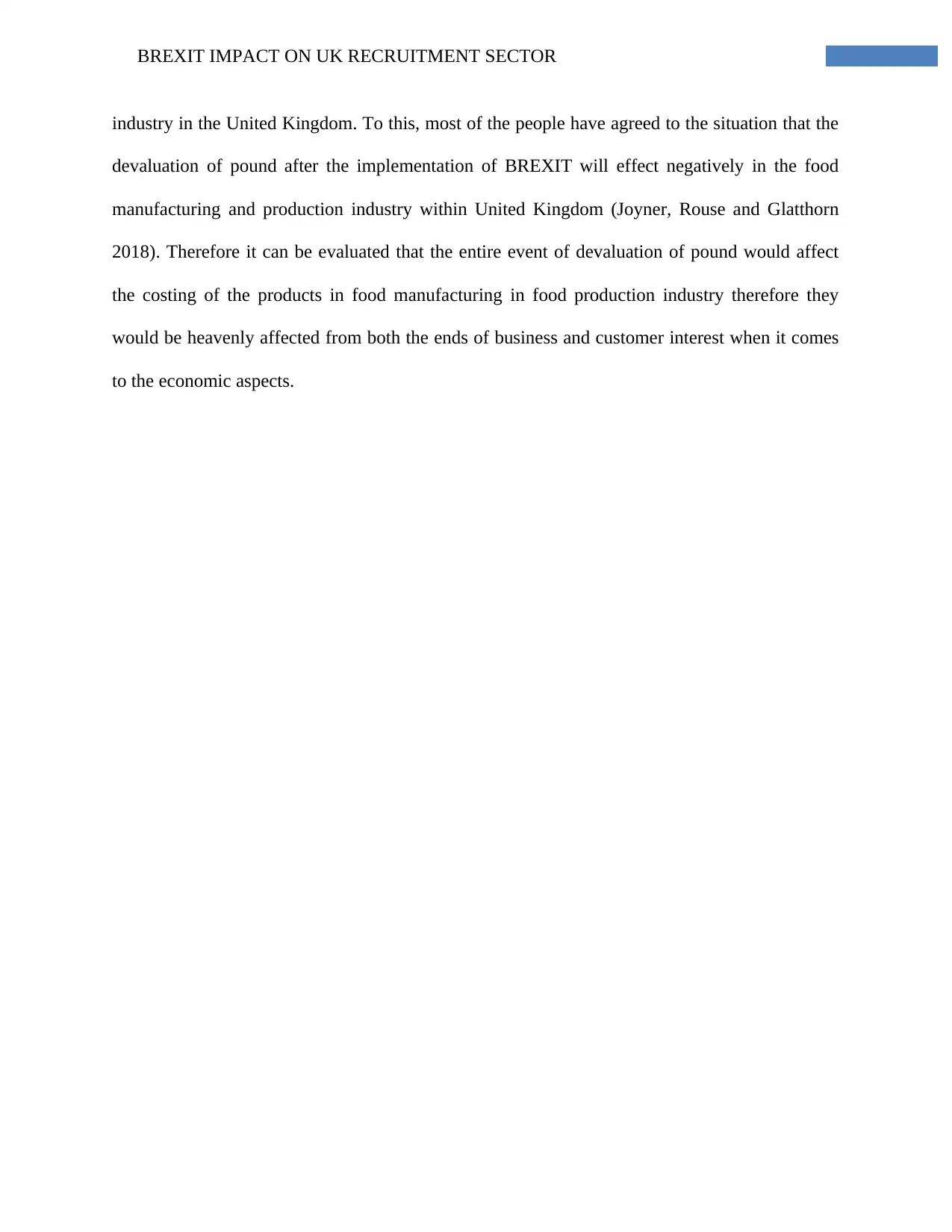
BREXIT IMPACT ON UK RECRUITMENT SECTOR
industry in the United Kingdom. To this, most of the people have agreed to the situation that the
devaluation of pound after the implementation of BREXIT will effect negatively in the food
manufacturing and production industry within United Kingdom (Joyner, Rouse and Glatthorn
2018). Therefore it can be evaluated that the entire event of devaluation of pound would affect
the costing of the products in food manufacturing in food production industry therefore they
would be heavenly affected from both the ends of business and customer interest when it comes
to the economic aspects.
industry in the United Kingdom. To this, most of the people have agreed to the situation that the
devaluation of pound after the implementation of BREXIT will effect negatively in the food
manufacturing and production industry within United Kingdom (Joyner, Rouse and Glatthorn
2018). Therefore it can be evaluated that the entire event of devaluation of pound would affect
the costing of the products in food manufacturing in food production industry therefore they
would be heavenly affected from both the ends of business and customer interest when it comes
to the economic aspects.
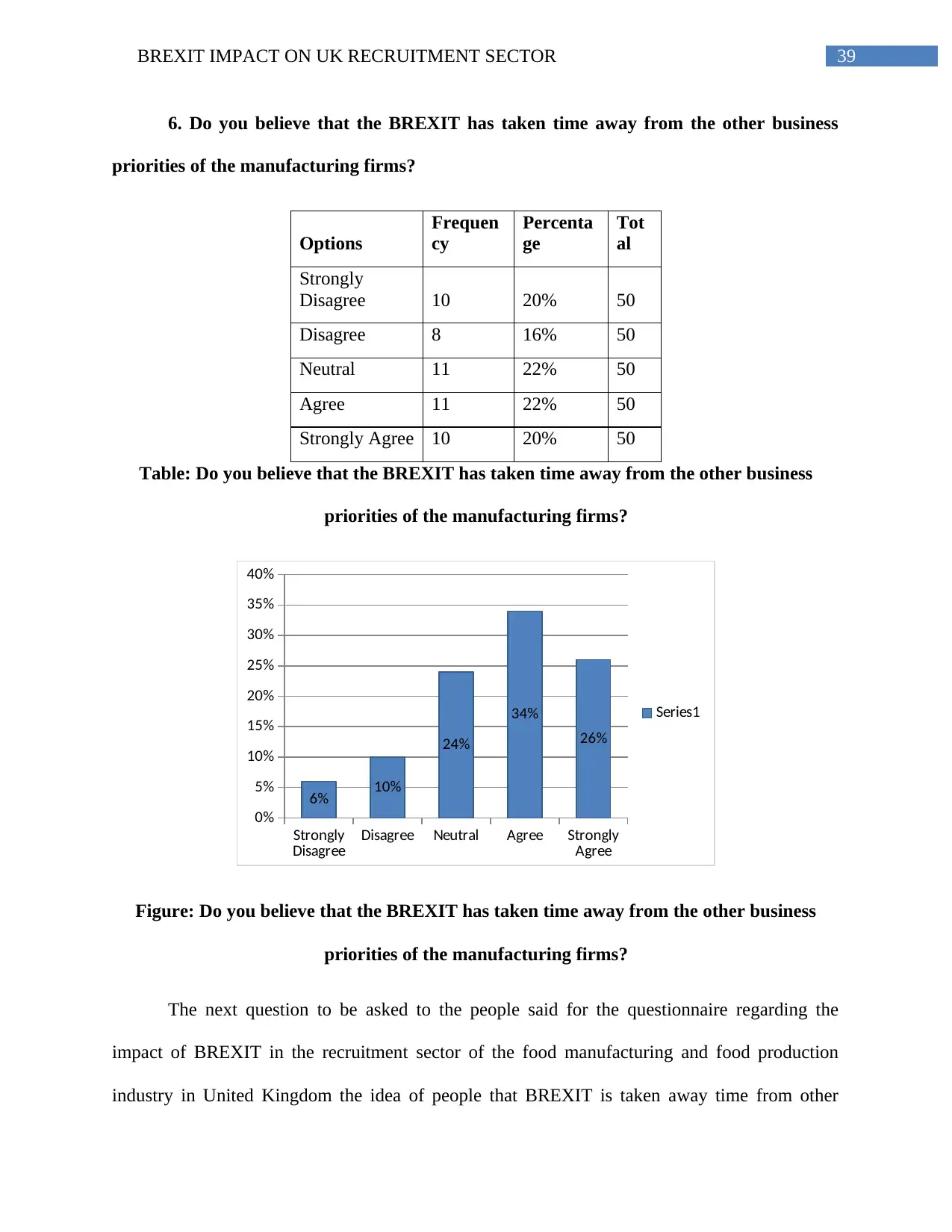
39BREXIT IMPACT ON UK RECRUITMENT SECTOR
6. Do you believe that the BREXIT has taken time away from the other business
priorities of the manufacturing firms?
Options
Frequen
cy
Percenta
ge
Tot
al
Strongly
Disagree 10 20% 50
Disagree 8 16% 50
Neutral 11 22% 50
Agree 11 22% 50
Strongly Agree 10 20% 50
Table: Do you believe that the BREXIT has taken time away from the other business
priorities of the manufacturing firms?
Strongly
Disagree Disagree Neutral Agree Strongly
Agree
0%
5%
10%
15%
20%
25%
30%
35%
40%
6% 10%
24%
34%
26%
Series1
Figure: Do you believe that the BREXIT has taken time away from the other business
priorities of the manufacturing firms?
The next question to be asked to the people said for the questionnaire regarding the
impact of BREXIT in the recruitment sector of the food manufacturing and food production
industry in United Kingdom the idea of people that BREXIT is taken away time from other
6. Do you believe that the BREXIT has taken time away from the other business
priorities of the manufacturing firms?
Options
Frequen
cy
Percenta
ge
Tot
al
Strongly
Disagree 10 20% 50
Disagree 8 16% 50
Neutral 11 22% 50
Agree 11 22% 50
Strongly Agree 10 20% 50
Table: Do you believe that the BREXIT has taken time away from the other business
priorities of the manufacturing firms?
Strongly
Disagree Disagree Neutral Agree Strongly
Agree
0%
5%
10%
15%
20%
25%
30%
35%
40%
6% 10%
24%
34%
26%
Series1
Figure: Do you believe that the BREXIT has taken time away from the other business
priorities of the manufacturing firms?
The next question to be asked to the people said for the questionnaire regarding the
impact of BREXIT in the recruitment sector of the food manufacturing and food production
industry in United Kingdom the idea of people that BREXIT is taken away time from other
Secure Best Marks with AI Grader
Need help grading? Try our AI Grader for instant feedback on your assignments.
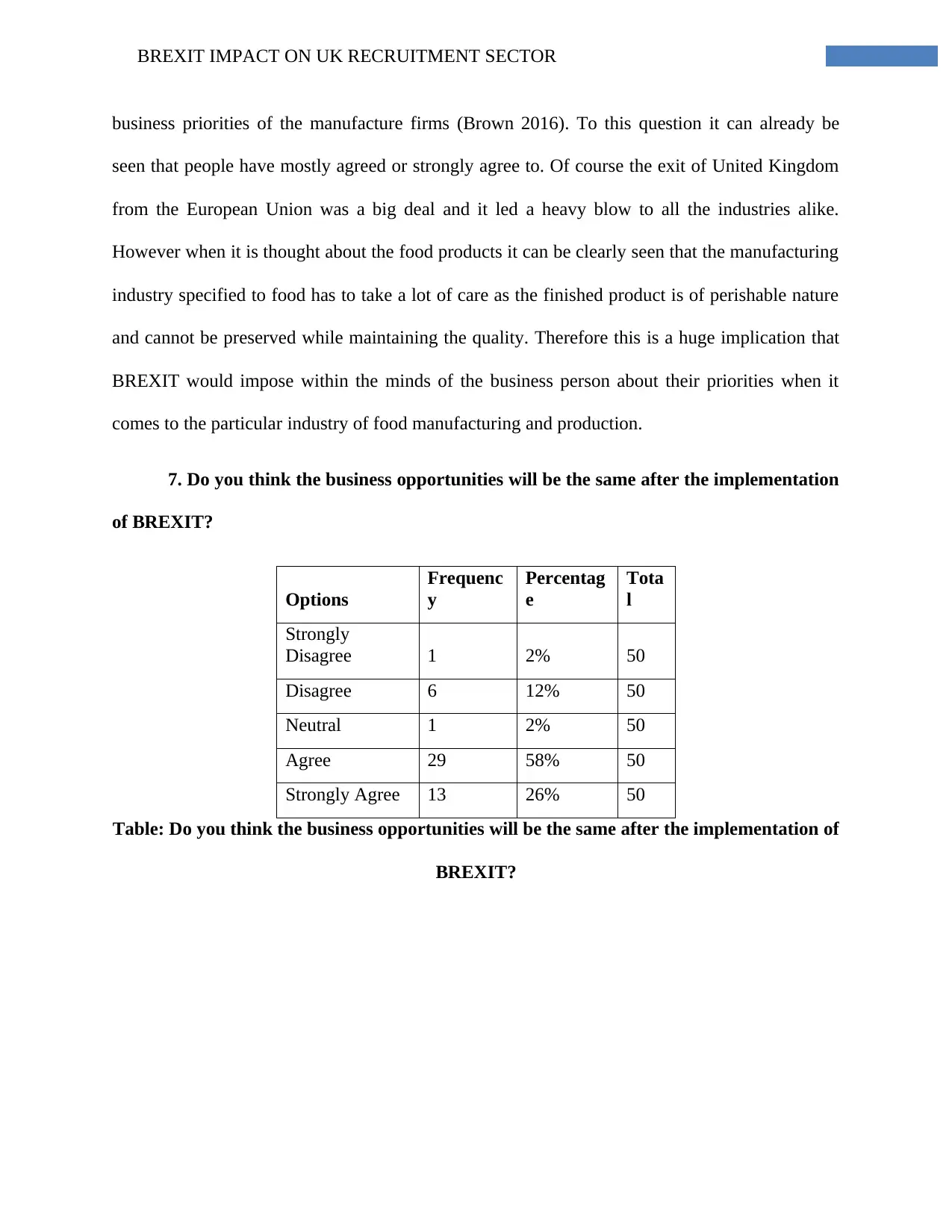
BREXIT IMPACT ON UK RECRUITMENT SECTOR
business priorities of the manufacture firms (Brown 2016). To this question it can already be
seen that people have mostly agreed or strongly agree to. Of course the exit of United Kingdom
from the European Union was a big deal and it led a heavy blow to all the industries alike.
However when it is thought about the food products it can be clearly seen that the manufacturing
industry specified to food has to take a lot of care as the finished product is of perishable nature
and cannot be preserved while maintaining the quality. Therefore this is a huge implication that
BREXIT would impose within the minds of the business person about their priorities when it
comes to the particular industry of food manufacturing and production.
7. Do you think the business opportunities will be the same after the implementation
of BREXIT?
Options
Frequenc
y
Percentag
e
Tota
l
Strongly
Disagree 1 2% 50
Disagree 6 12% 50
Neutral 1 2% 50
Agree 29 58% 50
Strongly Agree 13 26% 50
Table: Do you think the business opportunities will be the same after the implementation of
BREXIT?
business priorities of the manufacture firms (Brown 2016). To this question it can already be
seen that people have mostly agreed or strongly agree to. Of course the exit of United Kingdom
from the European Union was a big deal and it led a heavy blow to all the industries alike.
However when it is thought about the food products it can be clearly seen that the manufacturing
industry specified to food has to take a lot of care as the finished product is of perishable nature
and cannot be preserved while maintaining the quality. Therefore this is a huge implication that
BREXIT would impose within the minds of the business person about their priorities when it
comes to the particular industry of food manufacturing and production.
7. Do you think the business opportunities will be the same after the implementation
of BREXIT?
Options
Frequenc
y
Percentag
e
Tota
l
Strongly
Disagree 1 2% 50
Disagree 6 12% 50
Neutral 1 2% 50
Agree 29 58% 50
Strongly Agree 13 26% 50
Table: Do you think the business opportunities will be the same after the implementation of
BREXIT?
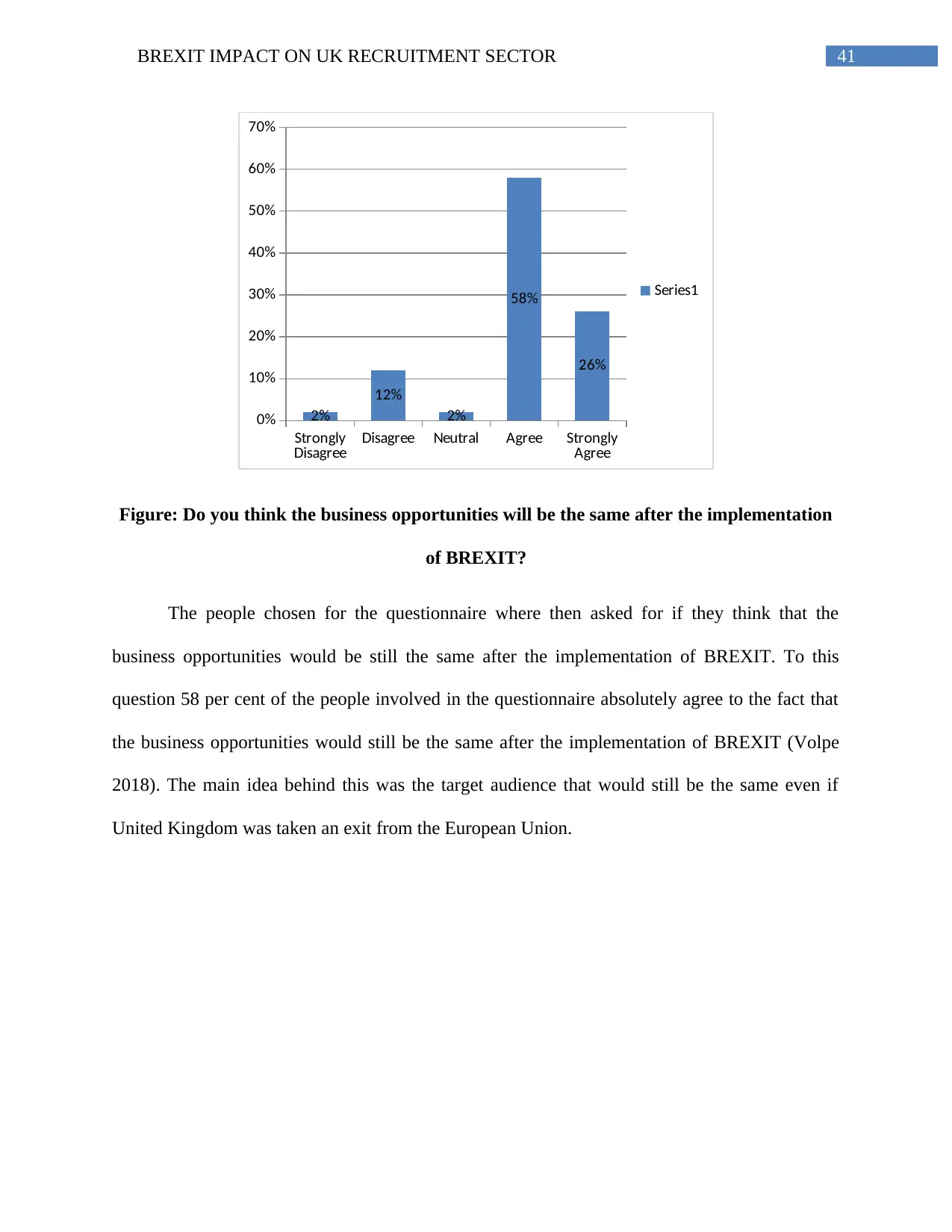
41BREXIT IMPACT ON UK RECRUITMENT SECTOR
Strongly
Disagree Disagree Neutral Agree Strongly
Agree
0%
10%
20%
30%
40%
50%
60%
70%
2%
12%
2%
58%
26%
Series1
Figure: Do you think the business opportunities will be the same after the implementation
of BREXIT?
The people chosen for the questionnaire where then asked for if they think that the
business opportunities would be still the same after the implementation of BREXIT. To this
question 58 per cent of the people involved in the questionnaire absolutely agree to the fact that
the business opportunities would still be the same after the implementation of BREXIT (Volpe
2018). The main idea behind this was the target audience that would still be the same even if
United Kingdom was taken an exit from the European Union.
Strongly
Disagree Disagree Neutral Agree Strongly
Agree
0%
10%
20%
30%
40%
50%
60%
70%
2%
12%
2%
58%
26%
Series1
Figure: Do you think the business opportunities will be the same after the implementation
of BREXIT?
The people chosen for the questionnaire where then asked for if they think that the
business opportunities would be still the same after the implementation of BREXIT. To this
question 58 per cent of the people involved in the questionnaire absolutely agree to the fact that
the business opportunities would still be the same after the implementation of BREXIT (Volpe
2018). The main idea behind this was the target audience that would still be the same even if
United Kingdom was taken an exit from the European Union.
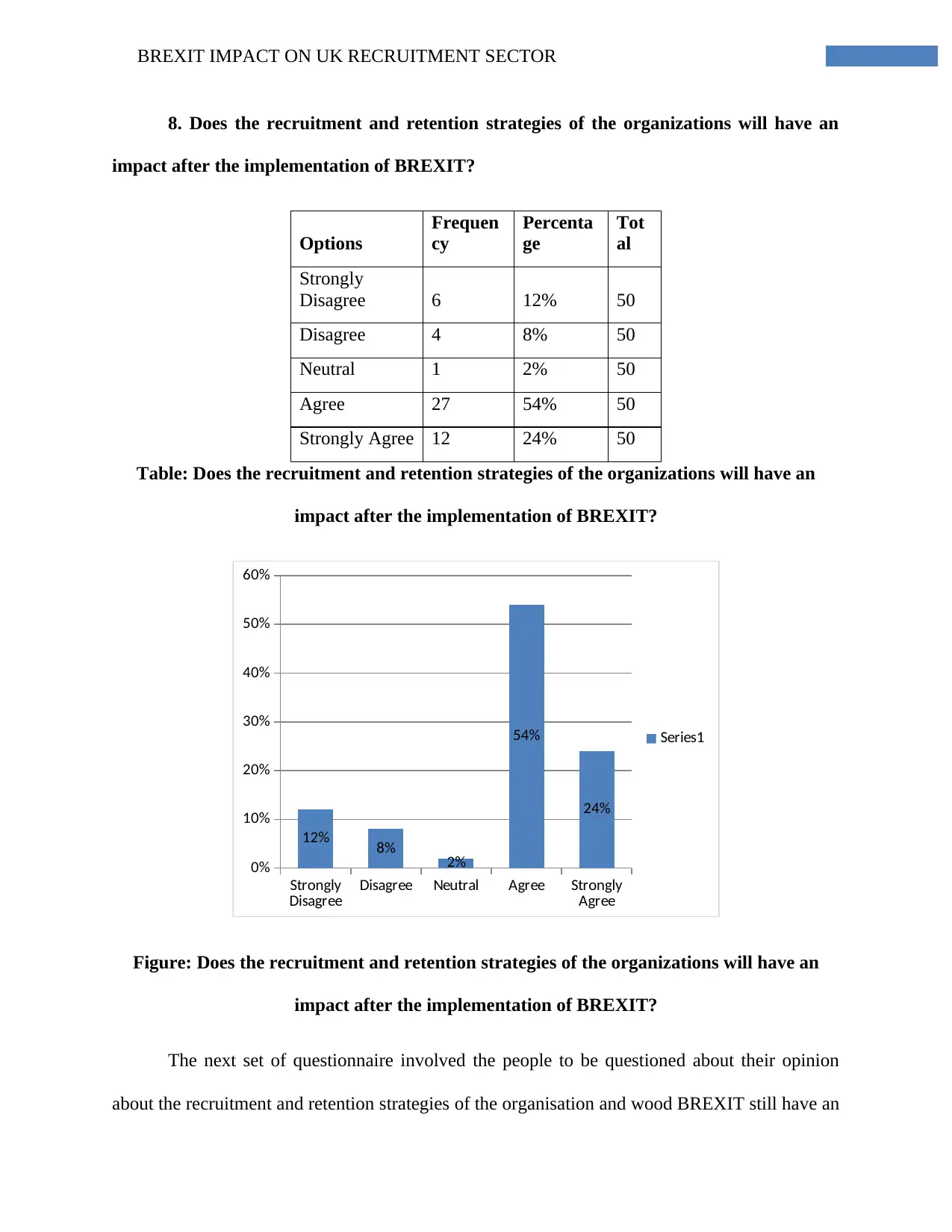
BREXIT IMPACT ON UK RECRUITMENT SECTOR
8. Does the recruitment and retention strategies of the organizations will have an
impact after the implementation of BREXIT?
Options
Frequen
cy
Percenta
ge
Tot
al
Strongly
Disagree 6 12% 50
Disagree 4 8% 50
Neutral 1 2% 50
Agree 27 54% 50
Strongly Agree 12 24% 50
Table: Does the recruitment and retention strategies of the organizations will have an
impact after the implementation of BREXIT?
Strongly
Disagree Disagree Neutral Agree Strongly
Agree
0%
10%
20%
30%
40%
50%
60%
12% 8% 2%
54%
24%
Series1
Figure: Does the recruitment and retention strategies of the organizations will have an
impact after the implementation of BREXIT?
The next set of questionnaire involved the people to be questioned about their opinion
about the recruitment and retention strategies of the organisation and wood BREXIT still have an
8. Does the recruitment and retention strategies of the organizations will have an
impact after the implementation of BREXIT?
Options
Frequen
cy
Percenta
ge
Tot
al
Strongly
Disagree 6 12% 50
Disagree 4 8% 50
Neutral 1 2% 50
Agree 27 54% 50
Strongly Agree 12 24% 50
Table: Does the recruitment and retention strategies of the organizations will have an
impact after the implementation of BREXIT?
Strongly
Disagree Disagree Neutral Agree Strongly
Agree
0%
10%
20%
30%
40%
50%
60%
12% 8% 2%
54%
24%
Series1
Figure: Does the recruitment and retention strategies of the organizations will have an
impact after the implementation of BREXIT?
The next set of questionnaire involved the people to be questioned about their opinion
about the recruitment and retention strategies of the organisation and wood BREXIT still have an
Paraphrase This Document
Need a fresh take? Get an instant paraphrase of this document with our AI Paraphraser

43BREXIT IMPACT ON UK RECRUITMENT SECTOR
impact after implementation in the European Union. Almost 54 per cent, that is more than half of
the people have agreed to the fact that bed sheet would surely impact on the recruitment and
retention strategies of the organisations (Hart 2018). It is also been found in the qualitative
literature review that authors are also of the opinion that implementation of bricks it has a huge
impact on recruitment and retention strategies of the organisation. They have been various
immigrants who relied on the incorporation of United Kingdom within the European Union
which was not being questioned since BREXIT had impacted and made United Kingdom to have
an exit from the European Union. Therefore employee turnover is has been more impacting on
the recruitment and retention strategies of the organisations.
9. Do you think BREXIT will impact the investment decisions of the manufacturing
companies in United Kingdom?
Options
Frequenc
y
Percentag
e
Tota
l
Strongly
Disagree 11 22% 50
Disagree 7 14% 50
Neutral 1 2% 50
Agree 25 50% 50
Strongly Agree 6 12% 50
Table: Do you think BREXIT will impact the investment decisions of the manufacturing
companies in United Kingdom?
impact after implementation in the European Union. Almost 54 per cent, that is more than half of
the people have agreed to the fact that bed sheet would surely impact on the recruitment and
retention strategies of the organisations (Hart 2018). It is also been found in the qualitative
literature review that authors are also of the opinion that implementation of bricks it has a huge
impact on recruitment and retention strategies of the organisation. They have been various
immigrants who relied on the incorporation of United Kingdom within the European Union
which was not being questioned since BREXIT had impacted and made United Kingdom to have
an exit from the European Union. Therefore employee turnover is has been more impacting on
the recruitment and retention strategies of the organisations.
9. Do you think BREXIT will impact the investment decisions of the manufacturing
companies in United Kingdom?
Options
Frequenc
y
Percentag
e
Tota
l
Strongly
Disagree 11 22% 50
Disagree 7 14% 50
Neutral 1 2% 50
Agree 25 50% 50
Strongly Agree 6 12% 50
Table: Do you think BREXIT will impact the investment decisions of the manufacturing
companies in United Kingdom?
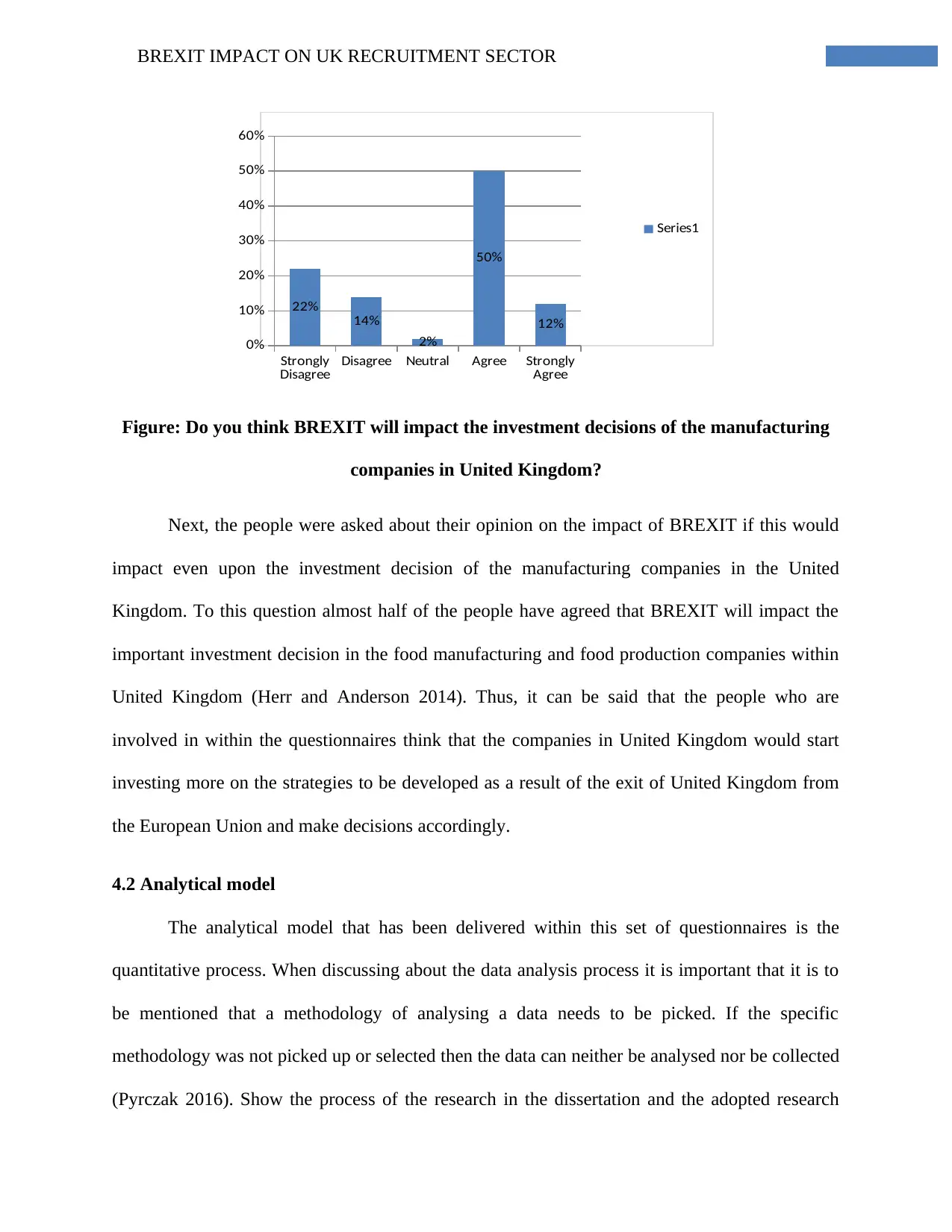
BREXIT IMPACT ON UK RECRUITMENT SECTOR
Strongly
Disagree Disagree Neutral Agree Strongly
Agree
0%
10%
20%
30%
40%
50%
60%
22%
14%
2%
50%
12%
Series1
Figure: Do you think BREXIT will impact the investment decisions of the manufacturing
companies in United Kingdom?
Next, the people were asked about their opinion on the impact of BREXIT if this would
impact even upon the investment decision of the manufacturing companies in the United
Kingdom. To this question almost half of the people have agreed that BREXIT will impact the
important investment decision in the food manufacturing and food production companies within
United Kingdom (Herr and Anderson 2014). Thus, it can be said that the people who are
involved in within the questionnaires think that the companies in United Kingdom would start
investing more on the strategies to be developed as a result of the exit of United Kingdom from
the European Union and make decisions accordingly.
4.2 Analytical model
The analytical model that has been delivered within this set of questionnaires is the
quantitative process. When discussing about the data analysis process it is important that it is to
be mentioned that a methodology of analysing a data needs to be picked. If the specific
methodology was not picked up or selected then the data can neither be analysed nor be collected
(Pyrczak 2016). Show the process of the research in the dissertation and the adopted research
Strongly
Disagree Disagree Neutral Agree Strongly
Agree
0%
10%
20%
30%
40%
50%
60%
22%
14%
2%
50%
12%
Series1
Figure: Do you think BREXIT will impact the investment decisions of the manufacturing
companies in United Kingdom?
Next, the people were asked about their opinion on the impact of BREXIT if this would
impact even upon the investment decision of the manufacturing companies in the United
Kingdom. To this question almost half of the people have agreed that BREXIT will impact the
important investment decision in the food manufacturing and food production companies within
United Kingdom (Herr and Anderson 2014). Thus, it can be said that the people who are
involved in within the questionnaires think that the companies in United Kingdom would start
investing more on the strategies to be developed as a result of the exit of United Kingdom from
the European Union and make decisions accordingly.
4.2 Analytical model
The analytical model that has been delivered within this set of questionnaires is the
quantitative process. When discussing about the data analysis process it is important that it is to
be mentioned that a methodology of analysing a data needs to be picked. If the specific
methodology was not picked up or selected then the data can neither be analysed nor be collected
(Pyrczak 2016). Show the process of the research in the dissertation and the adopted research
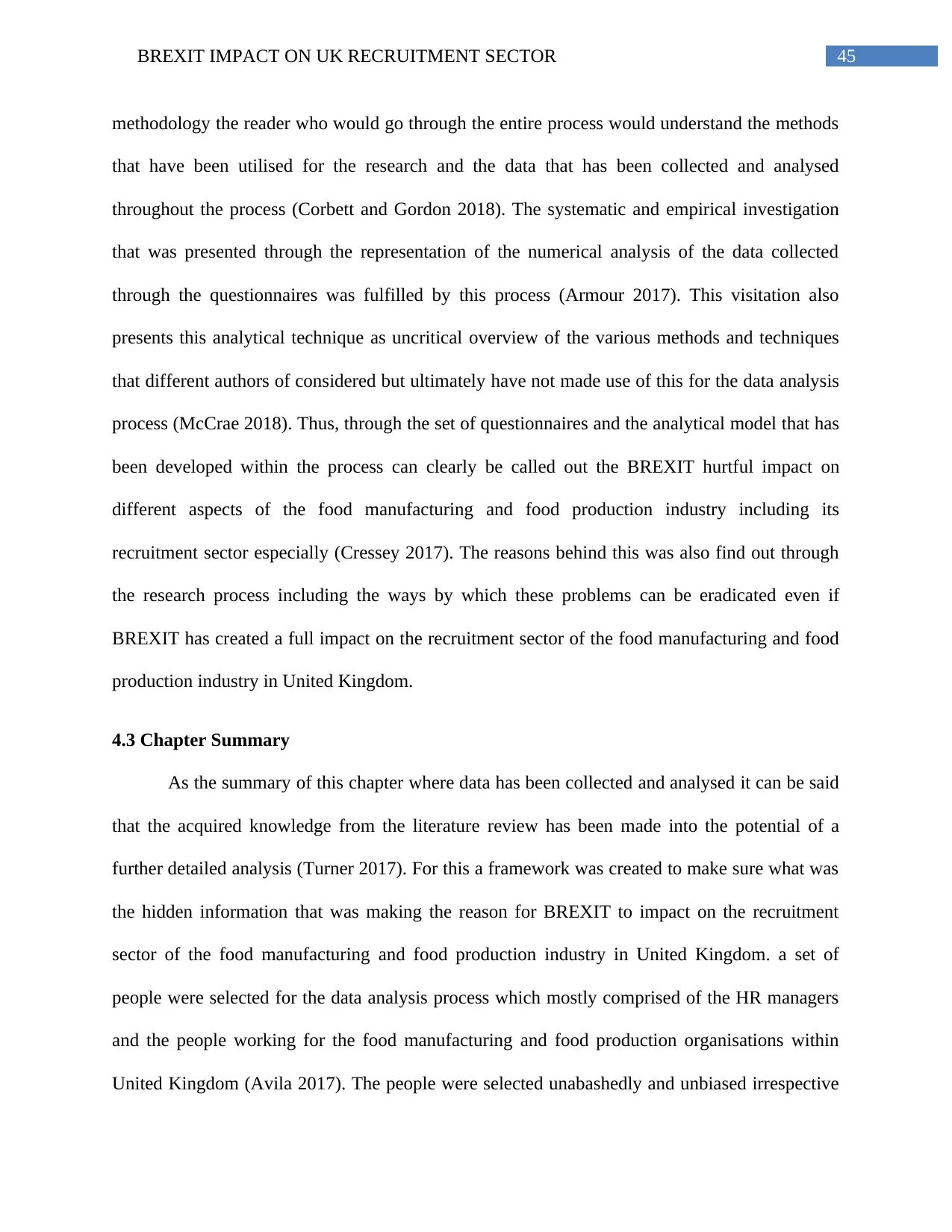
45BREXIT IMPACT ON UK RECRUITMENT SECTOR
methodology the reader who would go through the entire process would understand the methods
that have been utilised for the research and the data that has been collected and analysed
throughout the process (Corbett and Gordon 2018). The systematic and empirical investigation
that was presented through the representation of the numerical analysis of the data collected
through the questionnaires was fulfilled by this process (Armour 2017). This visitation also
presents this analytical technique as uncritical overview of the various methods and techniques
that different authors of considered but ultimately have not made use of this for the data analysis
process (McCrae 2018). Thus, through the set of questionnaires and the analytical model that has
been developed within the process can clearly be called out the BREXIT hurtful impact on
different aspects of the food manufacturing and food production industry including its
recruitment sector especially (Cressey 2017). The reasons behind this was also find out through
the research process including the ways by which these problems can be eradicated even if
BREXIT has created a full impact on the recruitment sector of the food manufacturing and food
production industry in United Kingdom.
4.3 Chapter Summary
As the summary of this chapter where data has been collected and analysed it can be said
that the acquired knowledge from the literature review has been made into the potential of a
further detailed analysis (Turner 2017). For this a framework was created to make sure what was
the hidden information that was making the reason for BREXIT to impact on the recruitment
sector of the food manufacturing and food production industry in United Kingdom. a set of
people were selected for the data analysis process which mostly comprised of the HR managers
and the people working for the food manufacturing and food production organisations within
United Kingdom (Avila 2017). The people were selected unabashedly and unbiased irrespective
methodology the reader who would go through the entire process would understand the methods
that have been utilised for the research and the data that has been collected and analysed
throughout the process (Corbett and Gordon 2018). The systematic and empirical investigation
that was presented through the representation of the numerical analysis of the data collected
through the questionnaires was fulfilled by this process (Armour 2017). This visitation also
presents this analytical technique as uncritical overview of the various methods and techniques
that different authors of considered but ultimately have not made use of this for the data analysis
process (McCrae 2018). Thus, through the set of questionnaires and the analytical model that has
been developed within the process can clearly be called out the BREXIT hurtful impact on
different aspects of the food manufacturing and food production industry including its
recruitment sector especially (Cressey 2017). The reasons behind this was also find out through
the research process including the ways by which these problems can be eradicated even if
BREXIT has created a full impact on the recruitment sector of the food manufacturing and food
production industry in United Kingdom.
4.3 Chapter Summary
As the summary of this chapter where data has been collected and analysed it can be said
that the acquired knowledge from the literature review has been made into the potential of a
further detailed analysis (Turner 2017). For this a framework was created to make sure what was
the hidden information that was making the reason for BREXIT to impact on the recruitment
sector of the food manufacturing and food production industry in United Kingdom. a set of
people were selected for the data analysis process which mostly comprised of the HR managers
and the people working for the food manufacturing and food production organisations within
United Kingdom (Avila 2017). The people were selected unabashedly and unbiased irrespective
Secure Best Marks with AI Grader
Need help grading? Try our AI Grader for instant feedback on your assignments.
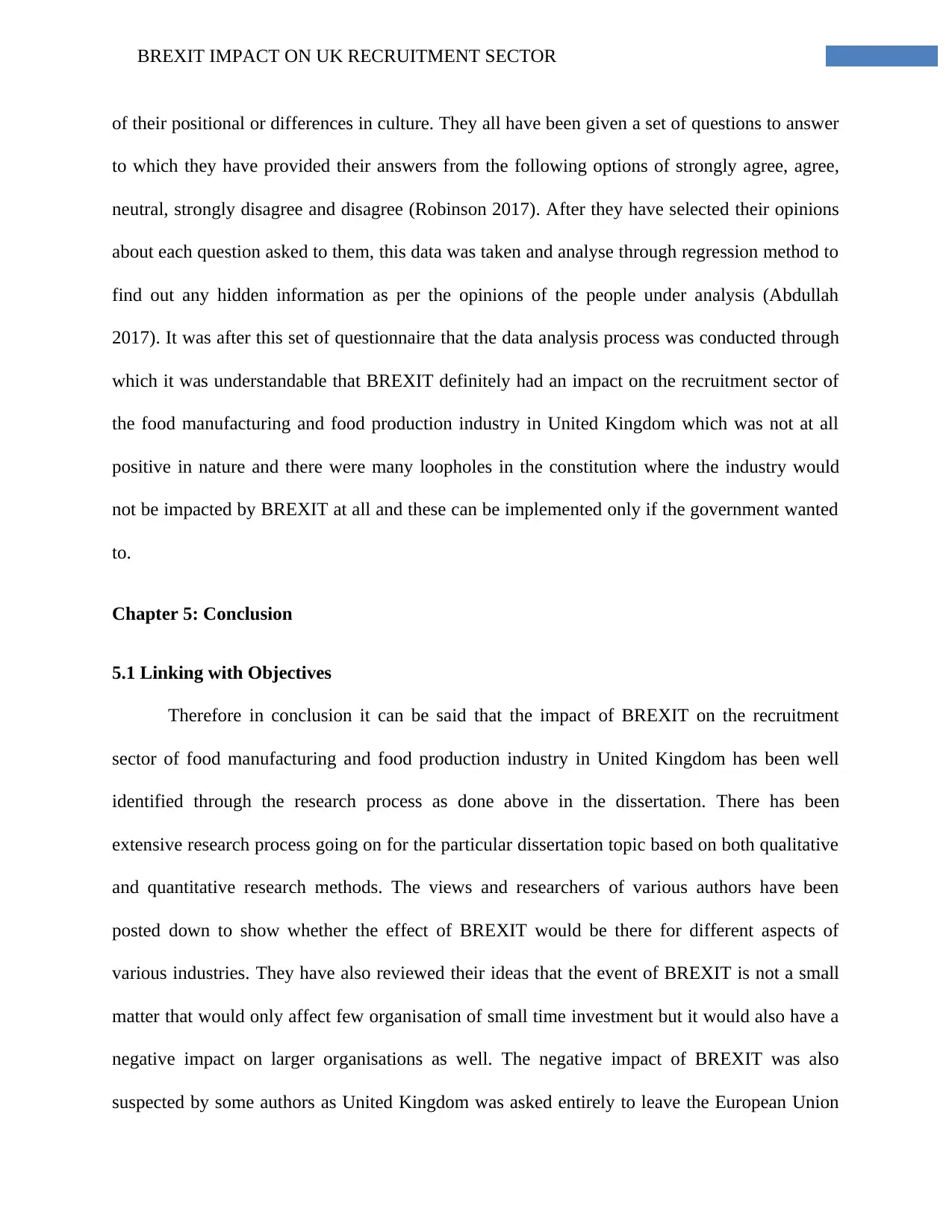
BREXIT IMPACT ON UK RECRUITMENT SECTOR
of their positional or differences in culture. They all have been given a set of questions to answer
to which they have provided their answers from the following options of strongly agree, agree,
neutral, strongly disagree and disagree (Robinson 2017). After they have selected their opinions
about each question asked to them, this data was taken and analyse through regression method to
find out any hidden information as per the opinions of the people under analysis (Abdullah
2017). It was after this set of questionnaire that the data analysis process was conducted through
which it was understandable that BREXIT definitely had an impact on the recruitment sector of
the food manufacturing and food production industry in United Kingdom which was not at all
positive in nature and there were many loopholes in the constitution where the industry would
not be impacted by BREXIT at all and these can be implemented only if the government wanted
to.
Chapter 5: Conclusion
5.1 Linking with Objectives
Therefore in conclusion it can be said that the impact of BREXIT on the recruitment
sector of food manufacturing and food production industry in United Kingdom has been well
identified through the research process as done above in the dissertation. There has been
extensive research process going on for the particular dissertation topic based on both qualitative
and quantitative research methods. The views and researchers of various authors have been
posted down to show whether the effect of BREXIT would be there for different aspects of
various industries. They have also reviewed their ideas that the event of BREXIT is not a small
matter that would only affect few organisation of small time investment but it would also have a
negative impact on larger organisations as well. The negative impact of BREXIT was also
suspected by some authors as United Kingdom was asked entirely to leave the European Union
of their positional or differences in culture. They all have been given a set of questions to answer
to which they have provided their answers from the following options of strongly agree, agree,
neutral, strongly disagree and disagree (Robinson 2017). After they have selected their opinions
about each question asked to them, this data was taken and analyse through regression method to
find out any hidden information as per the opinions of the people under analysis (Abdullah
2017). It was after this set of questionnaire that the data analysis process was conducted through
which it was understandable that BREXIT definitely had an impact on the recruitment sector of
the food manufacturing and food production industry in United Kingdom which was not at all
positive in nature and there were many loopholes in the constitution where the industry would
not be impacted by BREXIT at all and these can be implemented only if the government wanted
to.
Chapter 5: Conclusion
5.1 Linking with Objectives
Therefore in conclusion it can be said that the impact of BREXIT on the recruitment
sector of food manufacturing and food production industry in United Kingdom has been well
identified through the research process as done above in the dissertation. There has been
extensive research process going on for the particular dissertation topic based on both qualitative
and quantitative research methods. The views and researchers of various authors have been
posted down to show whether the effect of BREXIT would be there for different aspects of
various industries. They have also reviewed their ideas that the event of BREXIT is not a small
matter that would only affect few organisation of small time investment but it would also have a
negative impact on larger organisations as well. The negative impact of BREXIT was also
suspected by some authors as United Kingdom was asked entirely to leave the European Union
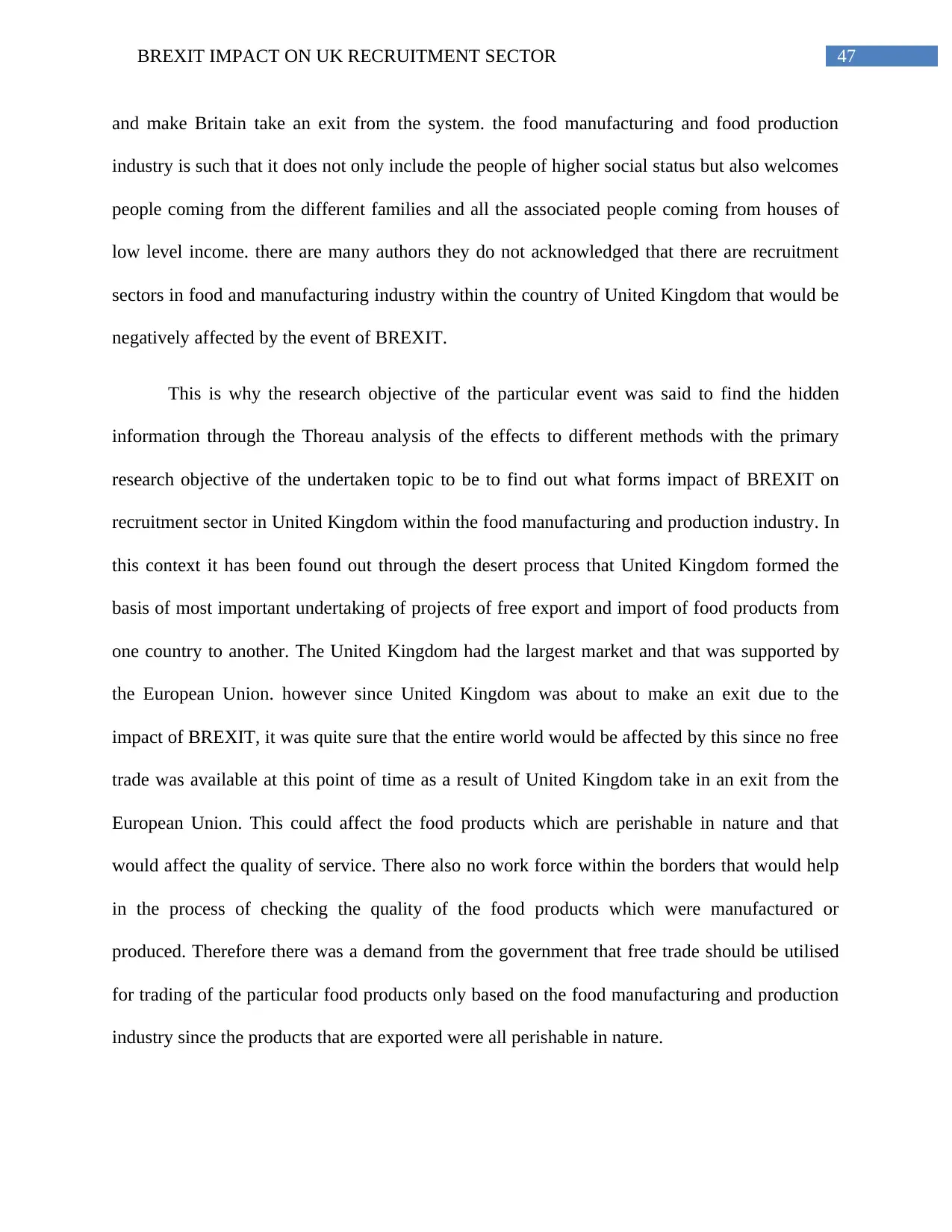
47BREXIT IMPACT ON UK RECRUITMENT SECTOR
and make Britain take an exit from the system. the food manufacturing and food production
industry is such that it does not only include the people of higher social status but also welcomes
people coming from the different families and all the associated people coming from houses of
low level income. there are many authors they do not acknowledged that there are recruitment
sectors in food and manufacturing industry within the country of United Kingdom that would be
negatively affected by the event of BREXIT.
This is why the research objective of the particular event was said to find the hidden
information through the Thoreau analysis of the effects to different methods with the primary
research objective of the undertaken topic to be to find out what forms impact of BREXIT on
recruitment sector in United Kingdom within the food manufacturing and production industry. In
this context it has been found out through the desert process that United Kingdom formed the
basis of most important undertaking of projects of free export and import of food products from
one country to another. The United Kingdom had the largest market and that was supported by
the European Union. however since United Kingdom was about to make an exit due to the
impact of BREXIT, it was quite sure that the entire world would be affected by this since no free
trade was available at this point of time as a result of United Kingdom take in an exit from the
European Union. This could affect the food products which are perishable in nature and that
would affect the quality of service. There also no work force within the borders that would help
in the process of checking the quality of the food products which were manufactured or
produced. Therefore there was a demand from the government that free trade should be utilised
for trading of the particular food products only based on the food manufacturing and production
industry since the products that are exported were all perishable in nature.
and make Britain take an exit from the system. the food manufacturing and food production
industry is such that it does not only include the people of higher social status but also welcomes
people coming from the different families and all the associated people coming from houses of
low level income. there are many authors they do not acknowledged that there are recruitment
sectors in food and manufacturing industry within the country of United Kingdom that would be
negatively affected by the event of BREXIT.
This is why the research objective of the particular event was said to find the hidden
information through the Thoreau analysis of the effects to different methods with the primary
research objective of the undertaken topic to be to find out what forms impact of BREXIT on
recruitment sector in United Kingdom within the food manufacturing and production industry. In
this context it has been found out through the desert process that United Kingdom formed the
basis of most important undertaking of projects of free export and import of food products from
one country to another. The United Kingdom had the largest market and that was supported by
the European Union. however since United Kingdom was about to make an exit due to the
impact of BREXIT, it was quite sure that the entire world would be affected by this since no free
trade was available at this point of time as a result of United Kingdom take in an exit from the
European Union. This could affect the food products which are perishable in nature and that
would affect the quality of service. There also no work force within the borders that would help
in the process of checking the quality of the food products which were manufactured or
produced. Therefore there was a demand from the government that free trade should be utilised
for trading of the particular food products only based on the food manufacturing and production
industry since the products that are exported were all perishable in nature.
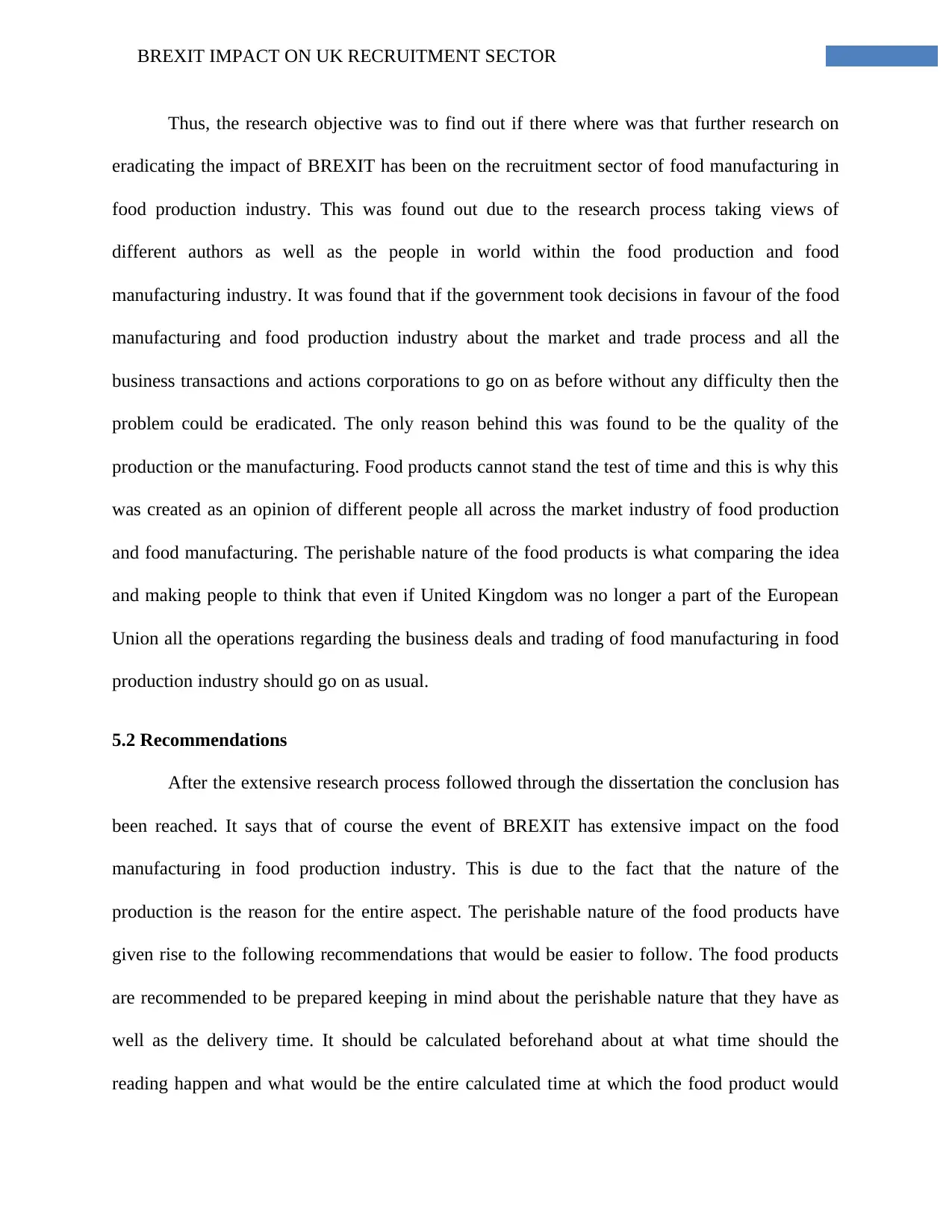
BREXIT IMPACT ON UK RECRUITMENT SECTOR
Thus, the research objective was to find out if there where was that further research on
eradicating the impact of BREXIT has been on the recruitment sector of food manufacturing in
food production industry. This was found out due to the research process taking views of
different authors as well as the people in world within the food production and food
manufacturing industry. It was found that if the government took decisions in favour of the food
manufacturing and food production industry about the market and trade process and all the
business transactions and actions corporations to go on as before without any difficulty then the
problem could be eradicated. The only reason behind this was found to be the quality of the
production or the manufacturing. Food products cannot stand the test of time and this is why this
was created as an opinion of different people all across the market industry of food production
and food manufacturing. The perishable nature of the food products is what comparing the idea
and making people to think that even if United Kingdom was no longer a part of the European
Union all the operations regarding the business deals and trading of food manufacturing in food
production industry should go on as usual.
5.2 Recommendations
After the extensive research process followed through the dissertation the conclusion has
been reached. It says that of course the event of BREXIT has extensive impact on the food
manufacturing in food production industry. This is due to the fact that the nature of the
production is the reason for the entire aspect. The perishable nature of the food products have
given rise to the following recommendations that would be easier to follow. The food products
are recommended to be prepared keeping in mind about the perishable nature that they have as
well as the delivery time. It should be calculated beforehand about at what time should the
reading happen and what would be the entire calculated time at which the food product would
Thus, the research objective was to find out if there where was that further research on
eradicating the impact of BREXIT has been on the recruitment sector of food manufacturing in
food production industry. This was found out due to the research process taking views of
different authors as well as the people in world within the food production and food
manufacturing industry. It was found that if the government took decisions in favour of the food
manufacturing and food production industry about the market and trade process and all the
business transactions and actions corporations to go on as before without any difficulty then the
problem could be eradicated. The only reason behind this was found to be the quality of the
production or the manufacturing. Food products cannot stand the test of time and this is why this
was created as an opinion of different people all across the market industry of food production
and food manufacturing. The perishable nature of the food products is what comparing the idea
and making people to think that even if United Kingdom was no longer a part of the European
Union all the operations regarding the business deals and trading of food manufacturing in food
production industry should go on as usual.
5.2 Recommendations
After the extensive research process followed through the dissertation the conclusion has
been reached. It says that of course the event of BREXIT has extensive impact on the food
manufacturing in food production industry. This is due to the fact that the nature of the
production is the reason for the entire aspect. The perishable nature of the food products have
given rise to the following recommendations that would be easier to follow. The food products
are recommended to be prepared keeping in mind about the perishable nature that they have as
well as the delivery time. It should be calculated beforehand about at what time should the
reading happen and what would be the entire calculated time at which the food product would
Paraphrase This Document
Need a fresh take? Get an instant paraphrase of this document with our AI Paraphraser
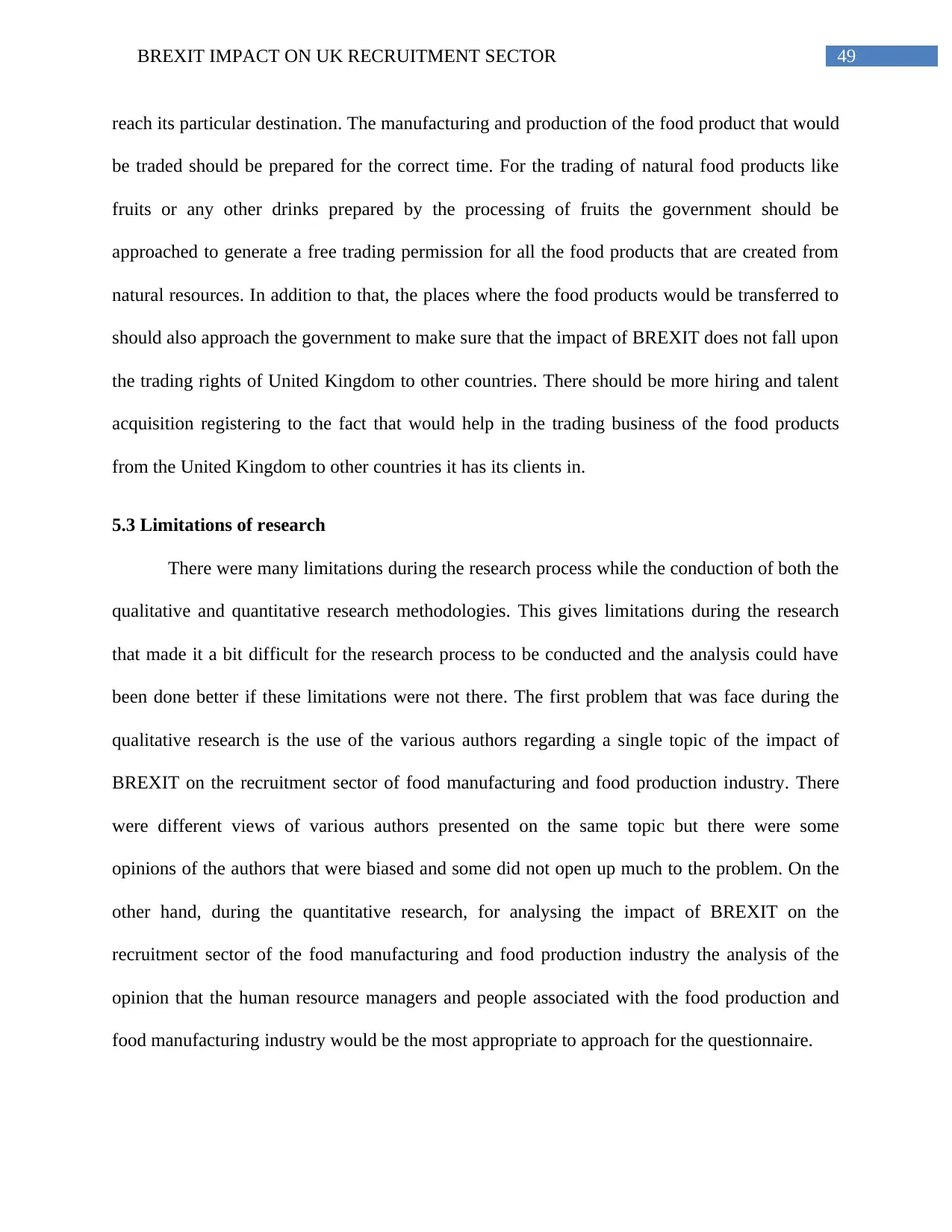
49BREXIT IMPACT ON UK RECRUITMENT SECTOR
reach its particular destination. The manufacturing and production of the food product that would
be traded should be prepared for the correct time. For the trading of natural food products like
fruits or any other drinks prepared by the processing of fruits the government should be
approached to generate a free trading permission for all the food products that are created from
natural resources. In addition to that, the places where the food products would be transferred to
should also approach the government to make sure that the impact of BREXIT does not fall upon
the trading rights of United Kingdom to other countries. There should be more hiring and talent
acquisition registering to the fact that would help in the trading business of the food products
from the United Kingdom to other countries it has its clients in.
5.3 Limitations of research
There were many limitations during the research process while the conduction of both the
qualitative and quantitative research methodologies. This gives limitations during the research
that made it a bit difficult for the research process to be conducted and the analysis could have
been done better if these limitations were not there. The first problem that was face during the
qualitative research is the use of the various authors regarding a single topic of the impact of
BREXIT on the recruitment sector of food manufacturing and food production industry. There
were different views of various authors presented on the same topic but there were some
opinions of the authors that were biased and some did not open up much to the problem. On the
other hand, during the quantitative research, for analysing the impact of BREXIT on the
recruitment sector of the food manufacturing and food production industry the analysis of the
opinion that the human resource managers and people associated with the food production and
food manufacturing industry would be the most appropriate to approach for the questionnaire.
reach its particular destination. The manufacturing and production of the food product that would
be traded should be prepared for the correct time. For the trading of natural food products like
fruits or any other drinks prepared by the processing of fruits the government should be
approached to generate a free trading permission for all the food products that are created from
natural resources. In addition to that, the places where the food products would be transferred to
should also approach the government to make sure that the impact of BREXIT does not fall upon
the trading rights of United Kingdom to other countries. There should be more hiring and talent
acquisition registering to the fact that would help in the trading business of the food products
from the United Kingdom to other countries it has its clients in.
5.3 Limitations of research
There were many limitations during the research process while the conduction of both the
qualitative and quantitative research methodologies. This gives limitations during the research
that made it a bit difficult for the research process to be conducted and the analysis could have
been done better if these limitations were not there. The first problem that was face during the
qualitative research is the use of the various authors regarding a single topic of the impact of
BREXIT on the recruitment sector of food manufacturing and food production industry. There
were different views of various authors presented on the same topic but there were some
opinions of the authors that were biased and some did not open up much to the problem. On the
other hand, during the quantitative research, for analysing the impact of BREXIT on the
recruitment sector of the food manufacturing and food production industry the analysis of the
opinion that the human resource managers and people associated with the food production and
food manufacturing industry would be the most appropriate to approach for the questionnaire.

BREXIT IMPACT ON UK RECRUITMENT SECTOR
However, the people that was approached where all of the highest rate are within the
industry related to the food manufacturing and food production industry and the data that was to
be asked from them was regarding the intricate information about the organisation. First and
foremost the human resource managers and assistance where all very busy with their work
therefore it was very difficult to get time for a one on one face to face meeting with them. Some
of them agreed to meet but it was for a very limited time and sometimes it was never enough to
go through all the questions in the questionnaire that the analyst wanted them to answer.
moreover few of the people who are about to be questioned when not at all available to meet for
a face to face interaction for the interview, instead they have given the permission to call them
and conduct the interview. However in that case as well the analysis and researchers did not have
the permission to record whatever they would have to say about the question is that will be asked
to them. Therefore whatever analysis that the analyst and researchers have put through in this
dissertation where based on the memory power of the people. Whatever they could a call from
the interview process was mirror through the data analysis. Thus, the researchers and the analysts
feel that they should have got much more improved results of the entire process of the research if
all this limitations when not a part of the research program.
5.4 Future scope of the study
The research that has been conducted so far was based on the impact of BREXIT on the
recruitment sector of food manufacturing and food production industry in United Kingdom. The
present research that has been conducted treats this impact of BREXIT to represent the position
of the industries in the United Kingdom in a discrete manner and the entities phenomenon in
which they are modelled. However in reality through the set of question is it has been found that
the continuous phenomenon like BREXIT has impacted the movement of the recruitment sectors
However, the people that was approached where all of the highest rate are within the
industry related to the food manufacturing and food production industry and the data that was to
be asked from them was regarding the intricate information about the organisation. First and
foremost the human resource managers and assistance where all very busy with their work
therefore it was very difficult to get time for a one on one face to face meeting with them. Some
of them agreed to meet but it was for a very limited time and sometimes it was never enough to
go through all the questions in the questionnaire that the analyst wanted them to answer.
moreover few of the people who are about to be questioned when not at all available to meet for
a face to face interaction for the interview, instead they have given the permission to call them
and conduct the interview. However in that case as well the analysis and researchers did not have
the permission to record whatever they would have to say about the question is that will be asked
to them. Therefore whatever analysis that the analyst and researchers have put through in this
dissertation where based on the memory power of the people. Whatever they could a call from
the interview process was mirror through the data analysis. Thus, the researchers and the analysts
feel that they should have got much more improved results of the entire process of the research if
all this limitations when not a part of the research program.
5.4 Future scope of the study
The research that has been conducted so far was based on the impact of BREXIT on the
recruitment sector of food manufacturing and food production industry in United Kingdom. The
present research that has been conducted treats this impact of BREXIT to represent the position
of the industries in the United Kingdom in a discrete manner and the entities phenomenon in
which they are modelled. However in reality through the set of question is it has been found that
the continuous phenomenon like BREXIT has impacted the movement of the recruitment sectors
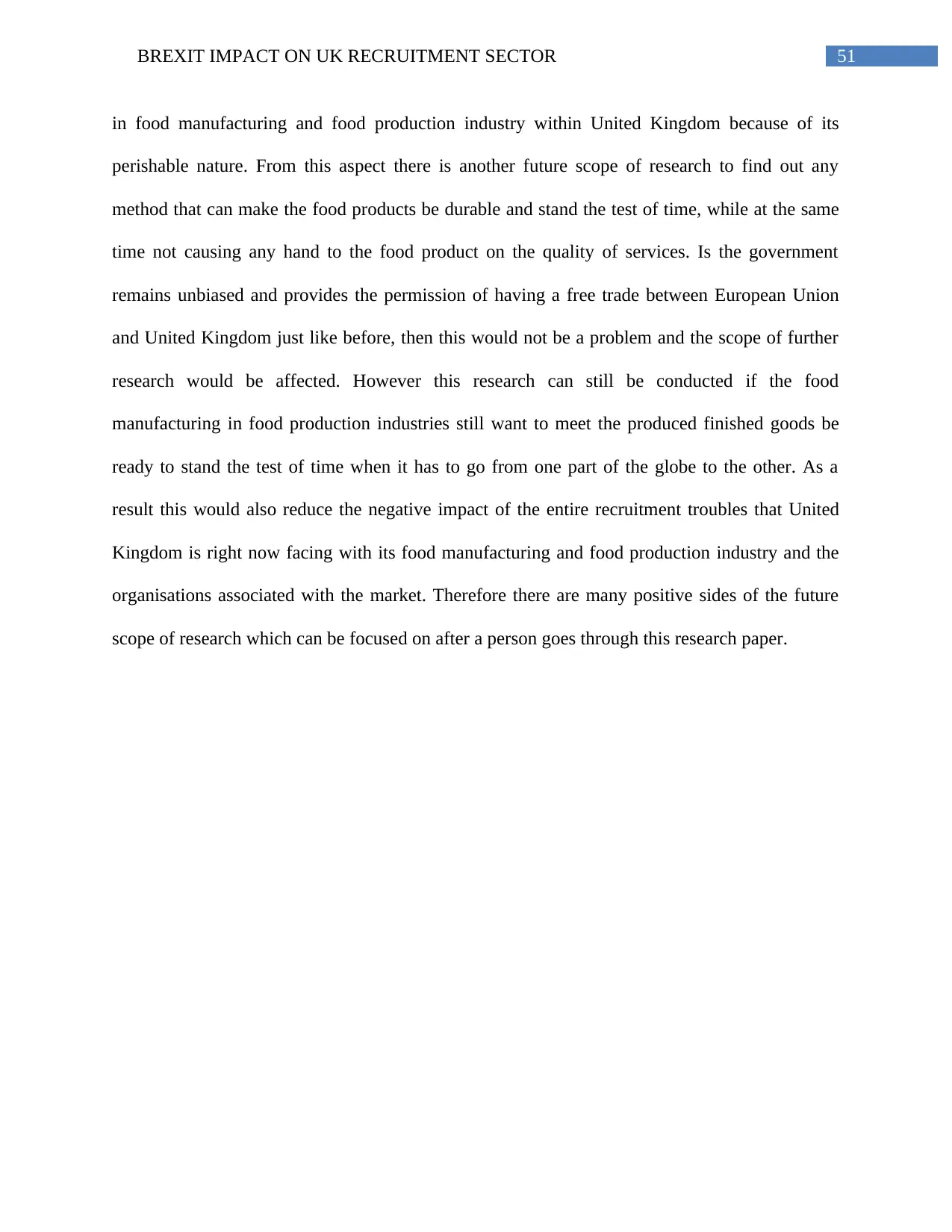
51BREXIT IMPACT ON UK RECRUITMENT SECTOR
in food manufacturing and food production industry within United Kingdom because of its
perishable nature. From this aspect there is another future scope of research to find out any
method that can make the food products be durable and stand the test of time, while at the same
time not causing any hand to the food product on the quality of services. Is the government
remains unbiased and provides the permission of having a free trade between European Union
and United Kingdom just like before, then this would not be a problem and the scope of further
research would be affected. However this research can still be conducted if the food
manufacturing in food production industries still want to meet the produced finished goods be
ready to stand the test of time when it has to go from one part of the globe to the other. As a
result this would also reduce the negative impact of the entire recruitment troubles that United
Kingdom is right now facing with its food manufacturing and food production industry and the
organisations associated with the market. Therefore there are many positive sides of the future
scope of research which can be focused on after a person goes through this research paper.
in food manufacturing and food production industry within United Kingdom because of its
perishable nature. From this aspect there is another future scope of research to find out any
method that can make the food products be durable and stand the test of time, while at the same
time not causing any hand to the food product on the quality of services. Is the government
remains unbiased and provides the permission of having a free trade between European Union
and United Kingdom just like before, then this would not be a problem and the scope of further
research would be affected. However this research can still be conducted if the food
manufacturing in food production industries still want to meet the produced finished goods be
ready to stand the test of time when it has to go from one part of the globe to the other. As a
result this would also reduce the negative impact of the entire recruitment troubles that United
Kingdom is right now facing with its food manufacturing and food production industry and the
organisations associated with the market. Therefore there are many positive sides of the future
scope of research which can be focused on after a person goes through this research paper.
Secure Best Marks with AI Grader
Need help grading? Try our AI Grader for instant feedback on your assignments.
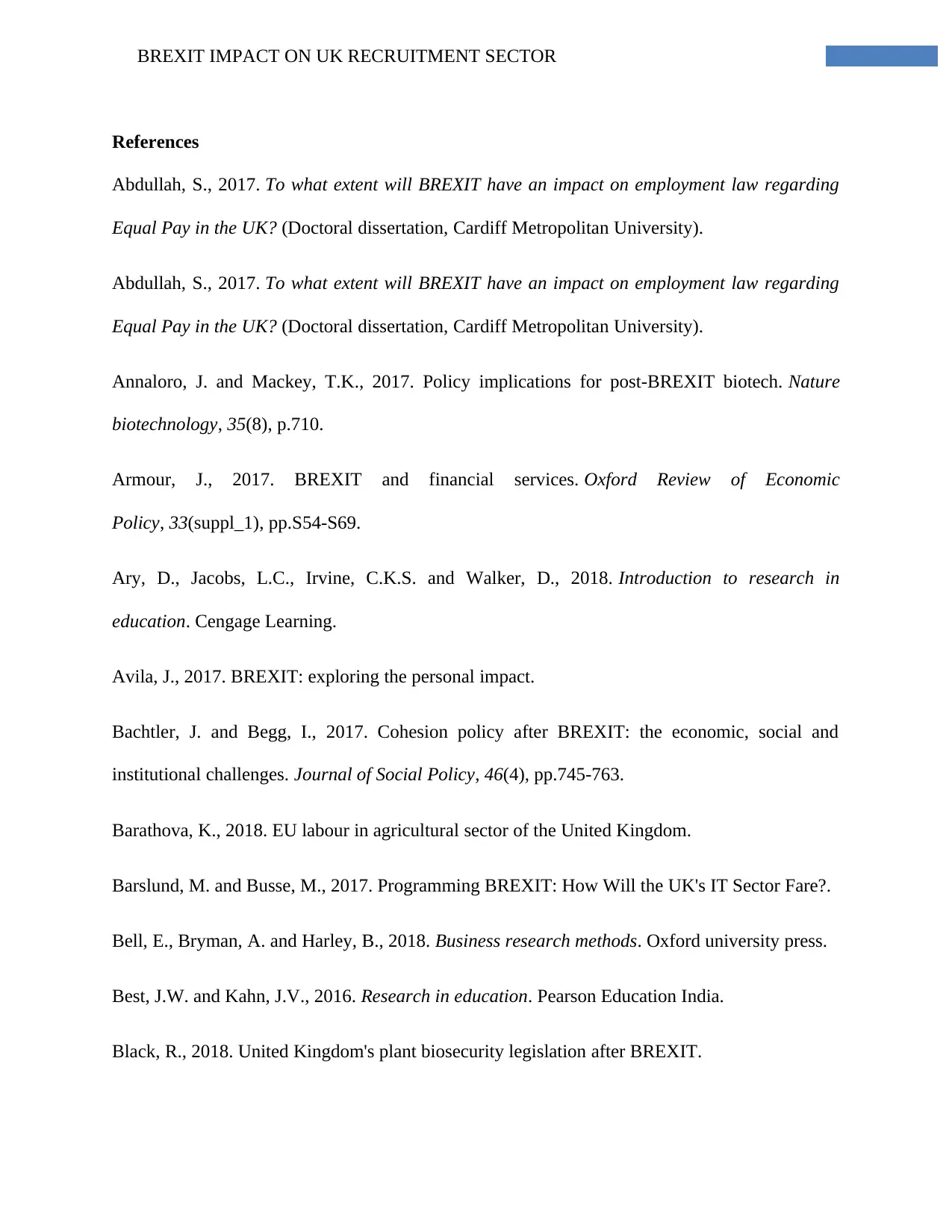
BREXIT IMPACT ON UK RECRUITMENT SECTOR
References
Abdullah, S., 2017. To what extent will BREXIT have an impact on employment law regarding
Equal Pay in the UK? (Doctoral dissertation, Cardiff Metropolitan University).
Abdullah, S., 2017. To what extent will BREXIT have an impact on employment law regarding
Equal Pay in the UK? (Doctoral dissertation, Cardiff Metropolitan University).
Annaloro, J. and Mackey, T.K., 2017. Policy implications for post-BREXIT biotech. Nature
biotechnology, 35(8), p.710.
Armour, J., 2017. BREXIT and financial services. Oxford Review of Economic
Policy, 33(suppl_1), pp.S54-S69.
Ary, D., Jacobs, L.C., Irvine, C.K.S. and Walker, D., 2018. Introduction to research in
education. Cengage Learning.
Avila, J., 2017. BREXIT: exploring the personal impact.
Bachtler, J. and Begg, I., 2017. Cohesion policy after BREXIT: the economic, social and
institutional challenges. Journal of Social Policy, 46(4), pp.745-763.
Barathova, K., 2018. EU labour in agricultural sector of the United Kingdom.
Barslund, M. and Busse, M., 2017. Programming BREXIT: How Will the UK's IT Sector Fare?.
Bell, E., Bryman, A. and Harley, B., 2018. Business research methods. Oxford university press.
Best, J.W. and Kahn, J.V., 2016. Research in education. Pearson Education India.
Black, R., 2018. United Kingdom's plant biosecurity legislation after BREXIT.
References
Abdullah, S., 2017. To what extent will BREXIT have an impact on employment law regarding
Equal Pay in the UK? (Doctoral dissertation, Cardiff Metropolitan University).
Abdullah, S., 2017. To what extent will BREXIT have an impact on employment law regarding
Equal Pay in the UK? (Doctoral dissertation, Cardiff Metropolitan University).
Annaloro, J. and Mackey, T.K., 2017. Policy implications for post-BREXIT biotech. Nature
biotechnology, 35(8), p.710.
Armour, J., 2017. BREXIT and financial services. Oxford Review of Economic
Policy, 33(suppl_1), pp.S54-S69.
Ary, D., Jacobs, L.C., Irvine, C.K.S. and Walker, D., 2018. Introduction to research in
education. Cengage Learning.
Avila, J., 2017. BREXIT: exploring the personal impact.
Bachtler, J. and Begg, I., 2017. Cohesion policy after BREXIT: the economic, social and
institutional challenges. Journal of Social Policy, 46(4), pp.745-763.
Barathova, K., 2018. EU labour in agricultural sector of the United Kingdom.
Barslund, M. and Busse, M., 2017. Programming BREXIT: How Will the UK's IT Sector Fare?.
Bell, E., Bryman, A. and Harley, B., 2018. Business research methods. Oxford university press.
Best, J.W. and Kahn, J.V., 2016. Research in education. Pearson Education India.
Black, R., 2018. United Kingdom's plant biosecurity legislation after BREXIT.
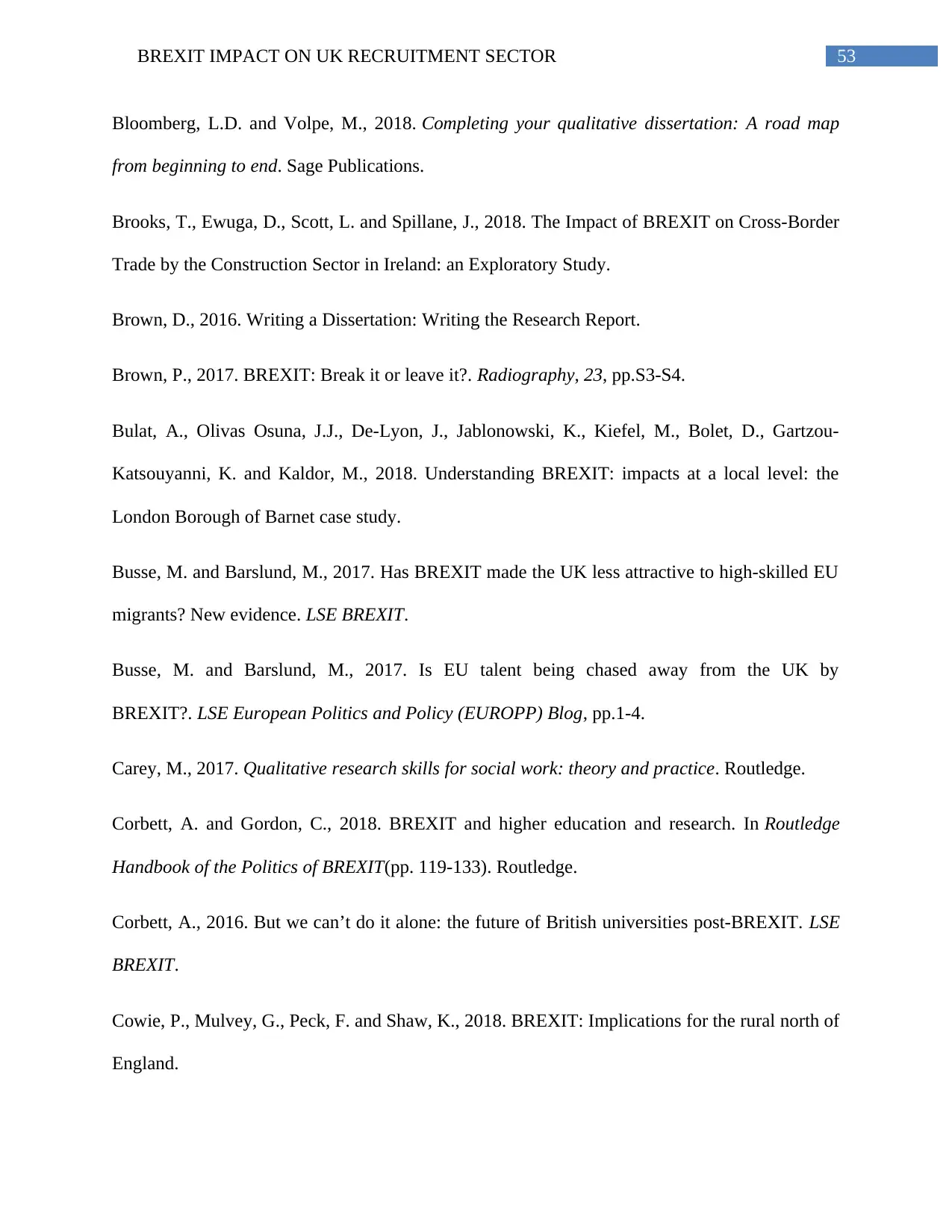
53BREXIT IMPACT ON UK RECRUITMENT SECTOR
Bloomberg, L.D. and Volpe, M., 2018. Completing your qualitative dissertation: A road map
from beginning to end. Sage Publications.
Brooks, T., Ewuga, D., Scott, L. and Spillane, J., 2018. The Impact of BREXIT on Cross-Border
Trade by the Construction Sector in Ireland: an Exploratory Study.
Brown, D., 2016. Writing a Dissertation: Writing the Research Report.
Brown, P., 2017. BREXIT: Break it or leave it?. Radiography, 23, pp.S3-S4.
Bulat, A., Olivas Osuna, J.J., De-Lyon, J., Jablonowski, K., Kiefel, M., Bolet, D., Gartzou-
Katsouyanni, K. and Kaldor, M., 2018. Understanding BREXIT: impacts at a local level: the
London Borough of Barnet case study.
Busse, M. and Barslund, M., 2017. Has BREXIT made the UK less attractive to high-skilled EU
migrants? New evidence. LSE BREXIT.
Busse, M. and Barslund, M., 2017. Is EU talent being chased away from the UK by
BREXIT?. LSE European Politics and Policy (EUROPP) Blog, pp.1-4.
Carey, M., 2017. Qualitative research skills for social work: theory and practice. Routledge.
Corbett, A. and Gordon, C., 2018. BREXIT and higher education and research. In Routledge
Handbook of the Politics of BREXIT(pp. 119-133). Routledge.
Corbett, A., 2016. But we can’t do it alone: the future of British universities post-BREXIT. LSE
BREXIT.
Cowie, P., Mulvey, G., Peck, F. and Shaw, K., 2018. BREXIT: Implications for the rural north of
England.
Bloomberg, L.D. and Volpe, M., 2018. Completing your qualitative dissertation: A road map
from beginning to end. Sage Publications.
Brooks, T., Ewuga, D., Scott, L. and Spillane, J., 2018. The Impact of BREXIT on Cross-Border
Trade by the Construction Sector in Ireland: an Exploratory Study.
Brown, D., 2016. Writing a Dissertation: Writing the Research Report.
Brown, P., 2017. BREXIT: Break it or leave it?. Radiography, 23, pp.S3-S4.
Bulat, A., Olivas Osuna, J.J., De-Lyon, J., Jablonowski, K., Kiefel, M., Bolet, D., Gartzou-
Katsouyanni, K. and Kaldor, M., 2018. Understanding BREXIT: impacts at a local level: the
London Borough of Barnet case study.
Busse, M. and Barslund, M., 2017. Has BREXIT made the UK less attractive to high-skilled EU
migrants? New evidence. LSE BREXIT.
Busse, M. and Barslund, M., 2017. Is EU talent being chased away from the UK by
BREXIT?. LSE European Politics and Policy (EUROPP) Blog, pp.1-4.
Carey, M., 2017. Qualitative research skills for social work: theory and practice. Routledge.
Corbett, A. and Gordon, C., 2018. BREXIT and higher education and research. In Routledge
Handbook of the Politics of BREXIT(pp. 119-133). Routledge.
Corbett, A., 2016. But we can’t do it alone: the future of British universities post-BREXIT. LSE
BREXIT.
Cowie, P., Mulvey, G., Peck, F. and Shaw, K., 2018. BREXIT: Implications for the rural north of
England.
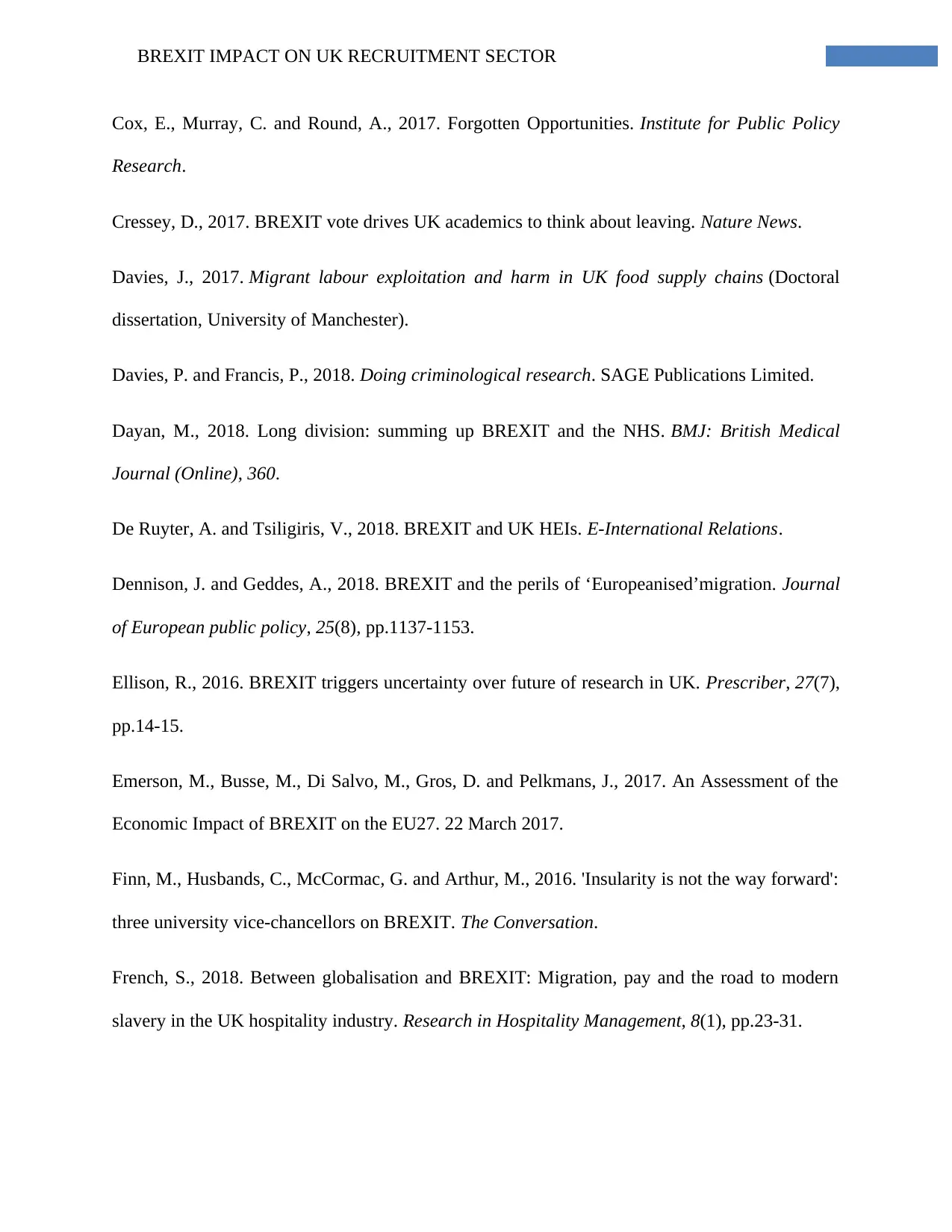
BREXIT IMPACT ON UK RECRUITMENT SECTOR
Cox, E., Murray, C. and Round, A., 2017. Forgotten Opportunities. Institute for Public Policy
Research.
Cressey, D., 2017. BREXIT vote drives UK academics to think about leaving. Nature News.
Davies, J., 2017. Migrant labour exploitation and harm in UK food supply chains (Doctoral
dissertation, University of Manchester).
Davies, P. and Francis, P., 2018. Doing criminological research. SAGE Publications Limited.
Dayan, M., 2018. Long division: summing up BREXIT and the NHS. BMJ: British Medical
Journal (Online), 360.
De Ruyter, A. and Tsiligiris, V., 2018. BREXIT and UK HEIs. E-International Relations.
Dennison, J. and Geddes, A., 2018. BREXIT and the perils of ‘Europeanised’migration. Journal
of European public policy, 25(8), pp.1137-1153.
Ellison, R., 2016. BREXIT triggers uncertainty over future of research in UK. Prescriber, 27(7),
pp.14-15.
Emerson, M., Busse, M., Di Salvo, M., Gros, D. and Pelkmans, J., 2017. An Assessment of the
Economic Impact of BREXIT on the EU27. 22 March 2017.
Finn, M., Husbands, C., McCormac, G. and Arthur, M., 2016. 'Insularity is not the way forward':
three university vice-chancellors on BREXIT. The Conversation.
French, S., 2018. Between globalisation and BREXIT: Migration, pay and the road to modern
slavery in the UK hospitality industry. Research in Hospitality Management, 8(1), pp.23-31.
Cox, E., Murray, C. and Round, A., 2017. Forgotten Opportunities. Institute for Public Policy
Research.
Cressey, D., 2017. BREXIT vote drives UK academics to think about leaving. Nature News.
Davies, J., 2017. Migrant labour exploitation and harm in UK food supply chains (Doctoral
dissertation, University of Manchester).
Davies, P. and Francis, P., 2018. Doing criminological research. SAGE Publications Limited.
Dayan, M., 2018. Long division: summing up BREXIT and the NHS. BMJ: British Medical
Journal (Online), 360.
De Ruyter, A. and Tsiligiris, V., 2018. BREXIT and UK HEIs. E-International Relations.
Dennison, J. and Geddes, A., 2018. BREXIT and the perils of ‘Europeanised’migration. Journal
of European public policy, 25(8), pp.1137-1153.
Ellison, R., 2016. BREXIT triggers uncertainty over future of research in UK. Prescriber, 27(7),
pp.14-15.
Emerson, M., Busse, M., Di Salvo, M., Gros, D. and Pelkmans, J., 2017. An Assessment of the
Economic Impact of BREXIT on the EU27. 22 March 2017.
Finn, M., Husbands, C., McCormac, G. and Arthur, M., 2016. 'Insularity is not the way forward':
three university vice-chancellors on BREXIT. The Conversation.
French, S., 2018. Between globalisation and BREXIT: Migration, pay and the road to modern
slavery in the UK hospitality industry. Research in Hospitality Management, 8(1), pp.23-31.
Paraphrase This Document
Need a fresh take? Get an instant paraphrase of this document with our AI Paraphraser
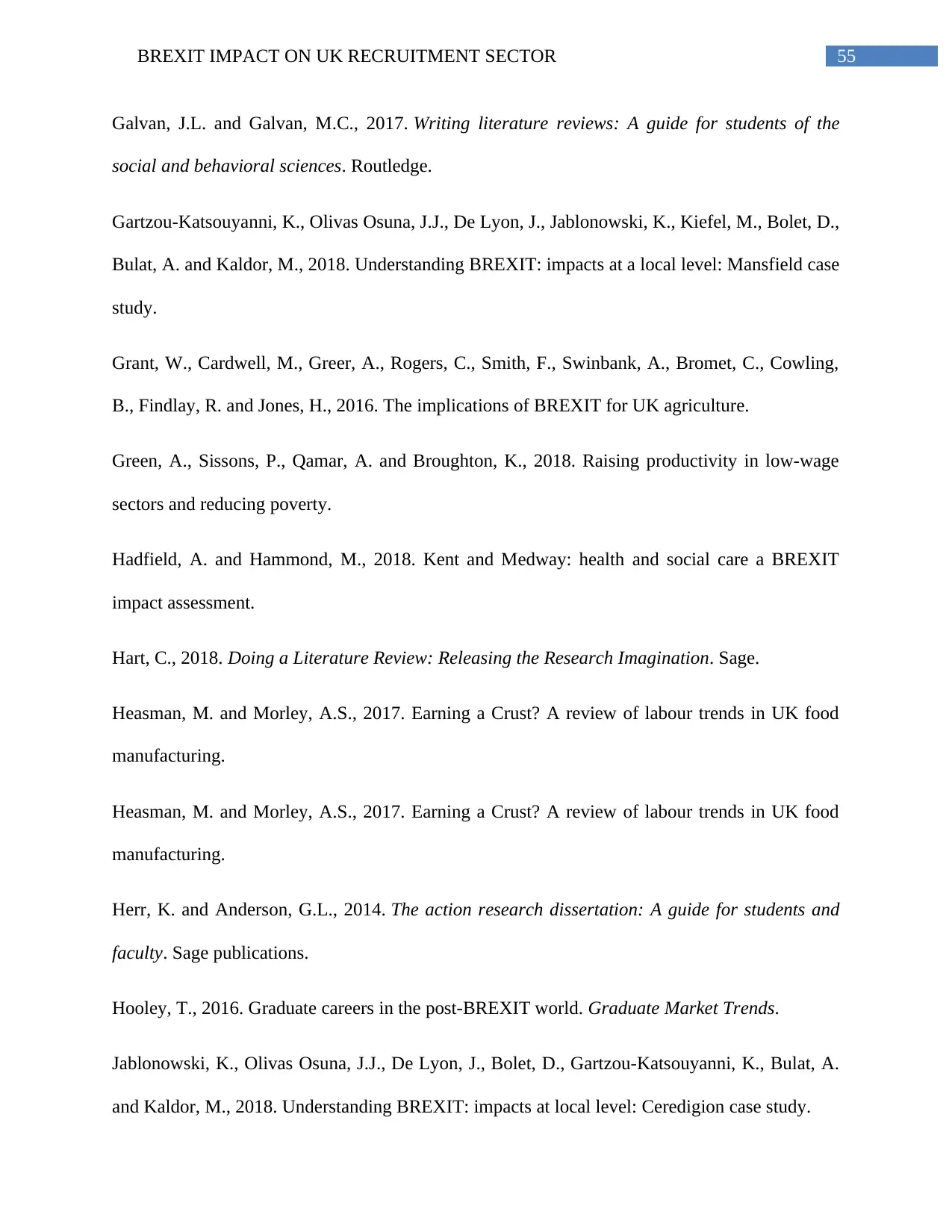
55BREXIT IMPACT ON UK RECRUITMENT SECTOR
Galvan, J.L. and Galvan, M.C., 2017. Writing literature reviews: A guide for students of the
social and behavioral sciences. Routledge.
Gartzou-Katsouyanni, K., Olivas Osuna, J.J., De Lyon, J., Jablonowski, K., Kiefel, M., Bolet, D.,
Bulat, A. and Kaldor, M., 2018. Understanding BREXIT: impacts at a local level: Mansfield case
study.
Grant, W., Cardwell, M., Greer, A., Rogers, C., Smith, F., Swinbank, A., Bromet, C., Cowling,
B., Findlay, R. and Jones, H., 2016. The implications of BREXIT for UK agriculture.
Green, A., Sissons, P., Qamar, A. and Broughton, K., 2018. Raising productivity in low-wage
sectors and reducing poverty.
Hadfield, A. and Hammond, M., 2018. Kent and Medway: health and social care a BREXIT
impact assessment.
Hart, C., 2018. Doing a Literature Review: Releasing the Research Imagination. Sage.
Heasman, M. and Morley, A.S., 2017. Earning a Crust? A review of labour trends in UK food
manufacturing.
Heasman, M. and Morley, A.S., 2017. Earning a Crust? A review of labour trends in UK food
manufacturing.
Herr, K. and Anderson, G.L., 2014. The action research dissertation: A guide for students and
faculty. Sage publications.
Hooley, T., 2016. Graduate careers in the post-BREXIT world. Graduate Market Trends.
Jablonowski, K., Olivas Osuna, J.J., De Lyon, J., Bolet, D., Gartzou-Katsouyanni, K., Bulat, A.
and Kaldor, M., 2018. Understanding BREXIT: impacts at local level: Ceredigion case study.
Galvan, J.L. and Galvan, M.C., 2017. Writing literature reviews: A guide for students of the
social and behavioral sciences. Routledge.
Gartzou-Katsouyanni, K., Olivas Osuna, J.J., De Lyon, J., Jablonowski, K., Kiefel, M., Bolet, D.,
Bulat, A. and Kaldor, M., 2018. Understanding BREXIT: impacts at a local level: Mansfield case
study.
Grant, W., Cardwell, M., Greer, A., Rogers, C., Smith, F., Swinbank, A., Bromet, C., Cowling,
B., Findlay, R. and Jones, H., 2016. The implications of BREXIT for UK agriculture.
Green, A., Sissons, P., Qamar, A. and Broughton, K., 2018. Raising productivity in low-wage
sectors and reducing poverty.
Hadfield, A. and Hammond, M., 2018. Kent and Medway: health and social care a BREXIT
impact assessment.
Hart, C., 2018. Doing a Literature Review: Releasing the Research Imagination. Sage.
Heasman, M. and Morley, A.S., 2017. Earning a Crust? A review of labour trends in UK food
manufacturing.
Heasman, M. and Morley, A.S., 2017. Earning a Crust? A review of labour trends in UK food
manufacturing.
Herr, K. and Anderson, G.L., 2014. The action research dissertation: A guide for students and
faculty. Sage publications.
Hooley, T., 2016. Graduate careers in the post-BREXIT world. Graduate Market Trends.
Jablonowski, K., Olivas Osuna, J.J., De Lyon, J., Bolet, D., Gartzou-Katsouyanni, K., Bulat, A.
and Kaldor, M., 2018. Understanding BREXIT: impacts at local level: Ceredigion case study.
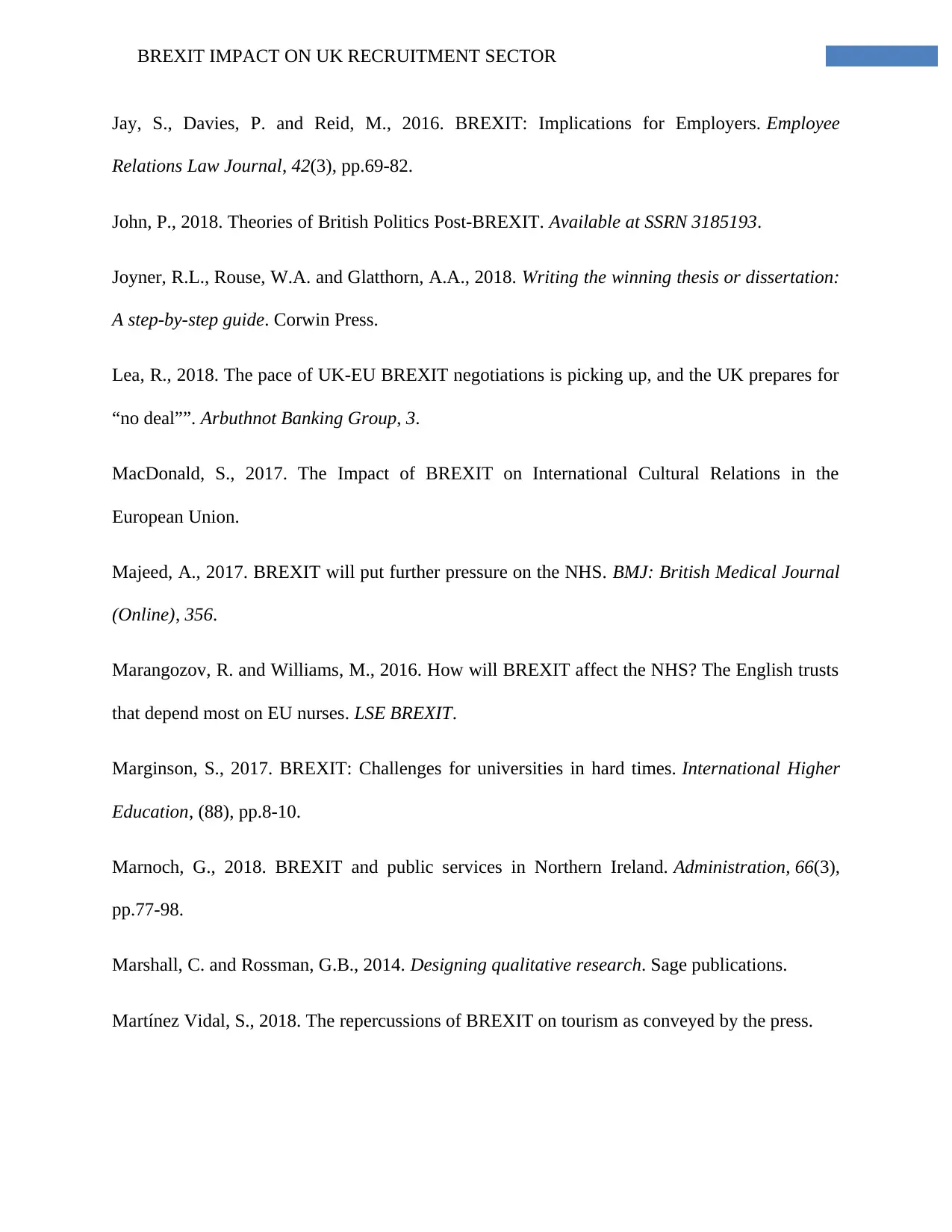
BREXIT IMPACT ON UK RECRUITMENT SECTOR
Jay, S., Davies, P. and Reid, M., 2016. BREXIT: Implications for Employers. Employee
Relations Law Journal, 42(3), pp.69-82.
John, P., 2018. Theories of British Politics Post-BREXIT. Available at SSRN 3185193.
Joyner, R.L., Rouse, W.A. and Glatthorn, A.A., 2018. Writing the winning thesis or dissertation:
A step-by-step guide. Corwin Press.
Lea, R., 2018. The pace of UK-EU BREXIT negotiations is picking up, and the UK prepares for
“no deal””. Arbuthnot Banking Group, 3.
MacDonald, S., 2017. The Impact of BREXIT on International Cultural Relations in the
European Union.
Majeed, A., 2017. BREXIT will put further pressure on the NHS. BMJ: British Medical Journal
(Online), 356.
Marangozov, R. and Williams, M., 2016. How will BREXIT affect the NHS? The English trusts
that depend most on EU nurses. LSE BREXIT.
Marginson, S., 2017. BREXIT: Challenges for universities in hard times. International Higher
Education, (88), pp.8-10.
Marnoch, G., 2018. BREXIT and public services in Northern Ireland. Administration, 66(3),
pp.77-98.
Marshall, C. and Rossman, G.B., 2014. Designing qualitative research. Sage publications.
Martínez Vidal, S., 2018. The repercussions of BREXIT on tourism as conveyed by the press.
Jay, S., Davies, P. and Reid, M., 2016. BREXIT: Implications for Employers. Employee
Relations Law Journal, 42(3), pp.69-82.
John, P., 2018. Theories of British Politics Post-BREXIT. Available at SSRN 3185193.
Joyner, R.L., Rouse, W.A. and Glatthorn, A.A., 2018. Writing the winning thesis or dissertation:
A step-by-step guide. Corwin Press.
Lea, R., 2018. The pace of UK-EU BREXIT negotiations is picking up, and the UK prepares for
“no deal””. Arbuthnot Banking Group, 3.
MacDonald, S., 2017. The Impact of BREXIT on International Cultural Relations in the
European Union.
Majeed, A., 2017. BREXIT will put further pressure on the NHS. BMJ: British Medical Journal
(Online), 356.
Marangozov, R. and Williams, M., 2016. How will BREXIT affect the NHS? The English trusts
that depend most on EU nurses. LSE BREXIT.
Marginson, S., 2017. BREXIT: Challenges for universities in hard times. International Higher
Education, (88), pp.8-10.
Marnoch, G., 2018. BREXIT and public services in Northern Ireland. Administration, 66(3),
pp.77-98.
Marshall, C. and Rossman, G.B., 2014. Designing qualitative research. Sage publications.
Martínez Vidal, S., 2018. The repercussions of BREXIT on tourism as conveyed by the press.
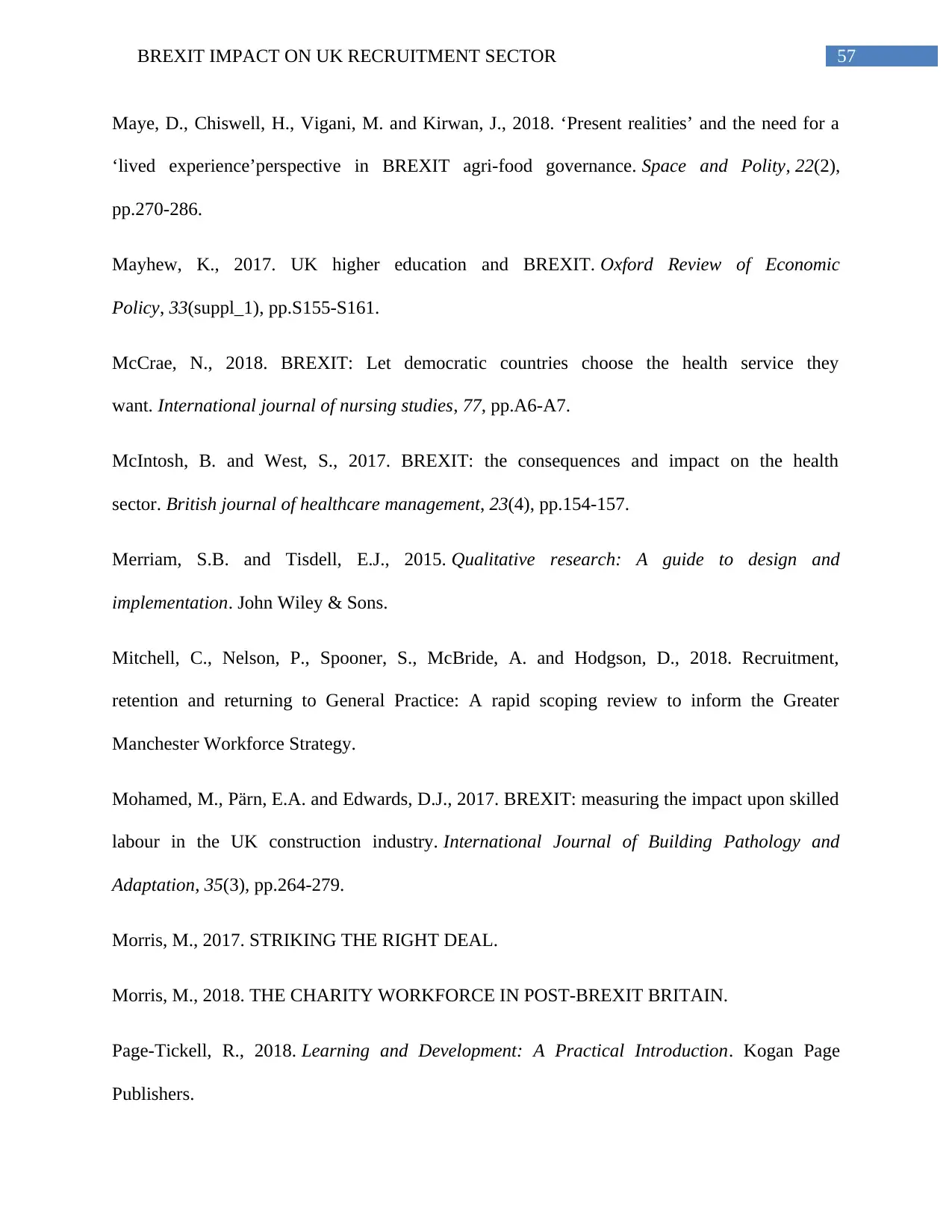
57BREXIT IMPACT ON UK RECRUITMENT SECTOR
Maye, D., Chiswell, H., Vigani, M. and Kirwan, J., 2018. ‘Present realities’ and the need for a
‘lived experience’perspective in BREXIT agri-food governance. Space and Polity, 22(2),
pp.270-286.
Mayhew, K., 2017. UK higher education and BREXIT. Oxford Review of Economic
Policy, 33(suppl_1), pp.S155-S161.
McCrae, N., 2018. BREXIT: Let democratic countries choose the health service they
want. International journal of nursing studies, 77, pp.A6-A7.
McIntosh, B. and West, S., 2017. BREXIT: the consequences and impact on the health
sector. British journal of healthcare management, 23(4), pp.154-157.
Merriam, S.B. and Tisdell, E.J., 2015. Qualitative research: A guide to design and
implementation. John Wiley & Sons.
Mitchell, C., Nelson, P., Spooner, S., McBride, A. and Hodgson, D., 2018. Recruitment,
retention and returning to General Practice: A rapid scoping review to inform the Greater
Manchester Workforce Strategy.
Mohamed, M., Pärn, E.A. and Edwards, D.J., 2017. BREXIT: measuring the impact upon skilled
labour in the UK construction industry. International Journal of Building Pathology and
Adaptation, 35(3), pp.264-279.
Morris, M., 2017. STRIKING THE RIGHT DEAL.
Morris, M., 2018. THE CHARITY WORKFORCE IN POST-BREXIT BRITAIN.
Page-Tickell, R., 2018. Learning and Development: A Practical Introduction. Kogan Page
Publishers.
Maye, D., Chiswell, H., Vigani, M. and Kirwan, J., 2018. ‘Present realities’ and the need for a
‘lived experience’perspective in BREXIT agri-food governance. Space and Polity, 22(2),
pp.270-286.
Mayhew, K., 2017. UK higher education and BREXIT. Oxford Review of Economic
Policy, 33(suppl_1), pp.S155-S161.
McCrae, N., 2018. BREXIT: Let democratic countries choose the health service they
want. International journal of nursing studies, 77, pp.A6-A7.
McIntosh, B. and West, S., 2017. BREXIT: the consequences and impact on the health
sector. British journal of healthcare management, 23(4), pp.154-157.
Merriam, S.B. and Tisdell, E.J., 2015. Qualitative research: A guide to design and
implementation. John Wiley & Sons.
Mitchell, C., Nelson, P., Spooner, S., McBride, A. and Hodgson, D., 2018. Recruitment,
retention and returning to General Practice: A rapid scoping review to inform the Greater
Manchester Workforce Strategy.
Mohamed, M., Pärn, E.A. and Edwards, D.J., 2017. BREXIT: measuring the impact upon skilled
labour in the UK construction industry. International Journal of Building Pathology and
Adaptation, 35(3), pp.264-279.
Morris, M., 2017. STRIKING THE RIGHT DEAL.
Morris, M., 2018. THE CHARITY WORKFORCE IN POST-BREXIT BRITAIN.
Page-Tickell, R., 2018. Learning and Development: A Practical Introduction. Kogan Page
Publishers.
Secure Best Marks with AI Grader
Need help grading? Try our AI Grader for instant feedback on your assignments.

BREXIT IMPACT ON UK RECRUITMENT SECTOR
Park, J.J., McKee, M. and Atun, R., 2017. BREXIT: Severe Risks to Britain’s National Health
Service.
Patten, M.L., 2016. Proposing empirical research: A guide to the fundamentals. Routledge.
Peat, J. and Kelly, O., 2016. BREXIT and the Scottish Financial Services Sector.
Phillipson, J. and Symes, D., 2018. 'A sea of troubles': BREXIT and the fisheries
question. Marine Policy, 90, pp.168-173.
Pigden, L. and Jegede, F., 2018. UNDERSTANDING THE EDUCATIONAL NEEDS OF
JOINT HONOURS DEGREE STUDENTS IN A POST BREXIT UNITED KINGDOM
HIGHER EDUCATION SECTOR. PEOPLE: International Journal of Social Sciences, 4(1).
Prazeres, L. and Findlay, A., 2017. An audit of international student mobility to the UK.
Pyrczak, F., 2016. Writing empirical research reports: A basic guide for students of the social
and behavioral sciences. Routledge.
Rădulescu, C.V., Bodislav, D.A. and Popescu, M.L., 2017. THE BREXIT-DILUTING THE
BRITISH FINANCIAL HUB OR INFORCING THE EU AS FINANCIAL
MONOLITH?. Quality-Access to Success, 18.
Ram, M., Edwards, P., Meardi, G., Jones, T., Doldor, S., Kispeter, E. and Villares-Varela, M.,
2017, April. Non-compliance and the National Living Wage: Case Study Evidence from Ethnic
Minority and Migrant-Owned Businesses. In Presentation to the Low Pay Commission Research
Workshop, April.
Park, J.J., McKee, M. and Atun, R., 2017. BREXIT: Severe Risks to Britain’s National Health
Service.
Patten, M.L., 2016. Proposing empirical research: A guide to the fundamentals. Routledge.
Peat, J. and Kelly, O., 2016. BREXIT and the Scottish Financial Services Sector.
Phillipson, J. and Symes, D., 2018. 'A sea of troubles': BREXIT and the fisheries
question. Marine Policy, 90, pp.168-173.
Pigden, L. and Jegede, F., 2018. UNDERSTANDING THE EDUCATIONAL NEEDS OF
JOINT HONOURS DEGREE STUDENTS IN A POST BREXIT UNITED KINGDOM
HIGHER EDUCATION SECTOR. PEOPLE: International Journal of Social Sciences, 4(1).
Prazeres, L. and Findlay, A., 2017. An audit of international student mobility to the UK.
Pyrczak, F., 2016. Writing empirical research reports: A basic guide for students of the social
and behavioral sciences. Routledge.
Rădulescu, C.V., Bodislav, D.A. and Popescu, M.L., 2017. THE BREXIT-DILUTING THE
BRITISH FINANCIAL HUB OR INFORCING THE EU AS FINANCIAL
MONOLITH?. Quality-Access to Success, 18.
Ram, M., Edwards, P., Meardi, G., Jones, T., Doldor, S., Kispeter, E. and Villares-Varela, M.,
2017, April. Non-compliance and the National Living Wage: Case Study Evidence from Ethnic
Minority and Migrant-Owned Businesses. In Presentation to the Low Pay Commission Research
Workshop, April.
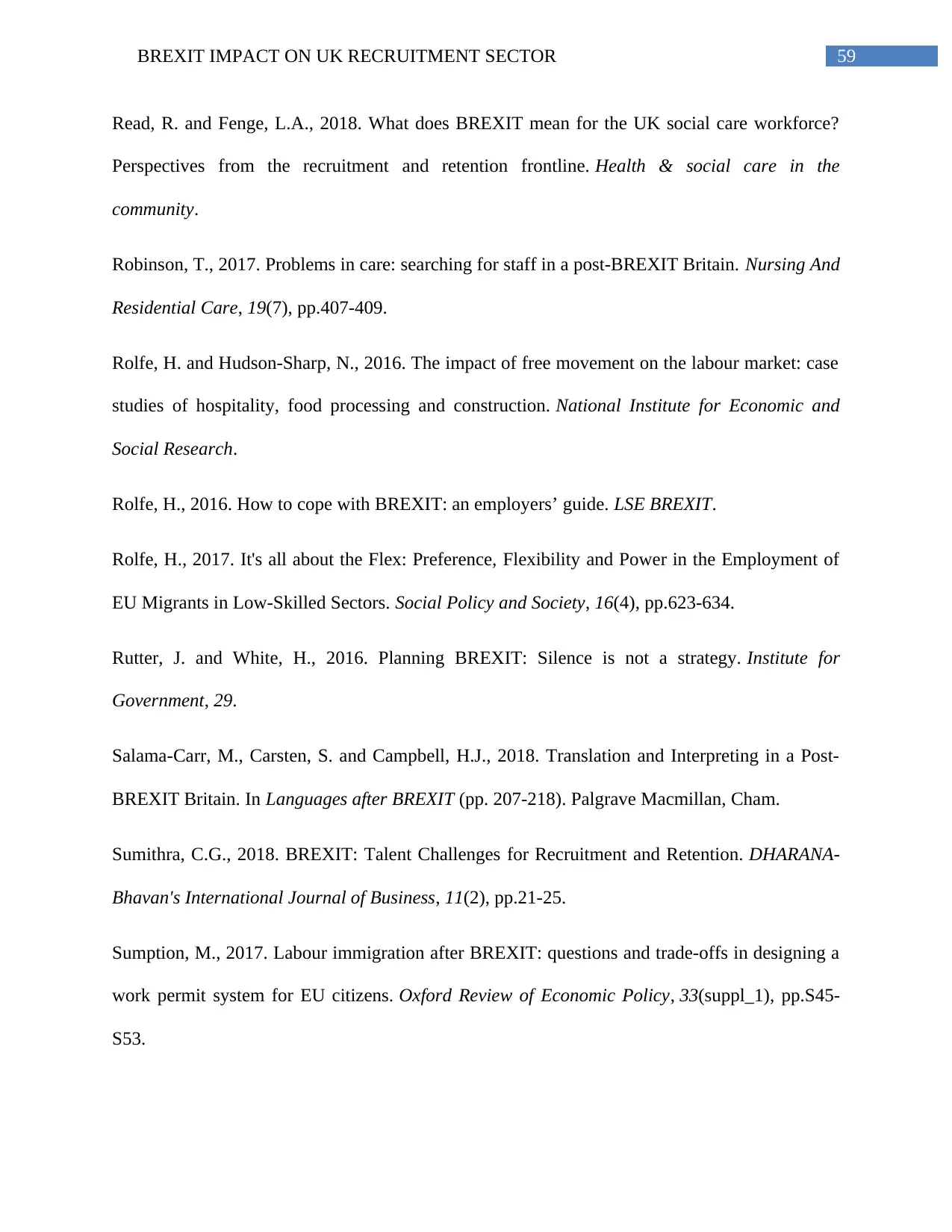
59BREXIT IMPACT ON UK RECRUITMENT SECTOR
Read, R. and Fenge, L.A., 2018. What does BREXIT mean for the UK social care workforce?
Perspectives from the recruitment and retention frontline. Health & social care in the
community.
Robinson, T., 2017. Problems in care: searching for staff in a post-BREXIT Britain. Nursing And
Residential Care, 19(7), pp.407-409.
Rolfe, H. and Hudson-Sharp, N., 2016. The impact of free movement on the labour market: case
studies of hospitality, food processing and construction. National Institute for Economic and
Social Research.
Rolfe, H., 2016. How to cope with BREXIT: an employers’ guide. LSE BREXIT.
Rolfe, H., 2017. It's all about the Flex: Preference, Flexibility and Power in the Employment of
EU Migrants in Low-Skilled Sectors. Social Policy and Society, 16(4), pp.623-634.
Rutter, J. and White, H., 2016. Planning BREXIT: Silence is not a strategy. Institute for
Government, 29.
Salama-Carr, M., Carsten, S. and Campbell, H.J., 2018. Translation and Interpreting in a Post-
BREXIT Britain. In Languages after BREXIT (pp. 207-218). Palgrave Macmillan, Cham.
Sumithra, C.G., 2018. BREXIT: Talent Challenges for Recruitment and Retention. DHARANA-
Bhavan's International Journal of Business, 11(2), pp.21-25.
Sumption, M., 2017. Labour immigration after BREXIT: questions and trade-offs in designing a
work permit system for EU citizens. Oxford Review of Economic Policy, 33(suppl_1), pp.S45-
S53.
Read, R. and Fenge, L.A., 2018. What does BREXIT mean for the UK social care workforce?
Perspectives from the recruitment and retention frontline. Health & social care in the
community.
Robinson, T., 2017. Problems in care: searching for staff in a post-BREXIT Britain. Nursing And
Residential Care, 19(7), pp.407-409.
Rolfe, H. and Hudson-Sharp, N., 2016. The impact of free movement on the labour market: case
studies of hospitality, food processing and construction. National Institute for Economic and
Social Research.
Rolfe, H., 2016. How to cope with BREXIT: an employers’ guide. LSE BREXIT.
Rolfe, H., 2017. It's all about the Flex: Preference, Flexibility and Power in the Employment of
EU Migrants in Low-Skilled Sectors. Social Policy and Society, 16(4), pp.623-634.
Rutter, J. and White, H., 2016. Planning BREXIT: Silence is not a strategy. Institute for
Government, 29.
Salama-Carr, M., Carsten, S. and Campbell, H.J., 2018. Translation and Interpreting in a Post-
BREXIT Britain. In Languages after BREXIT (pp. 207-218). Palgrave Macmillan, Cham.
Sumithra, C.G., 2018. BREXIT: Talent Challenges for Recruitment and Retention. DHARANA-
Bhavan's International Journal of Business, 11(2), pp.21-25.
Sumption, M., 2017. Labour immigration after BREXIT: questions and trade-offs in designing a
work permit system for EU citizens. Oxford Review of Economic Policy, 33(suppl_1), pp.S45-
S53.
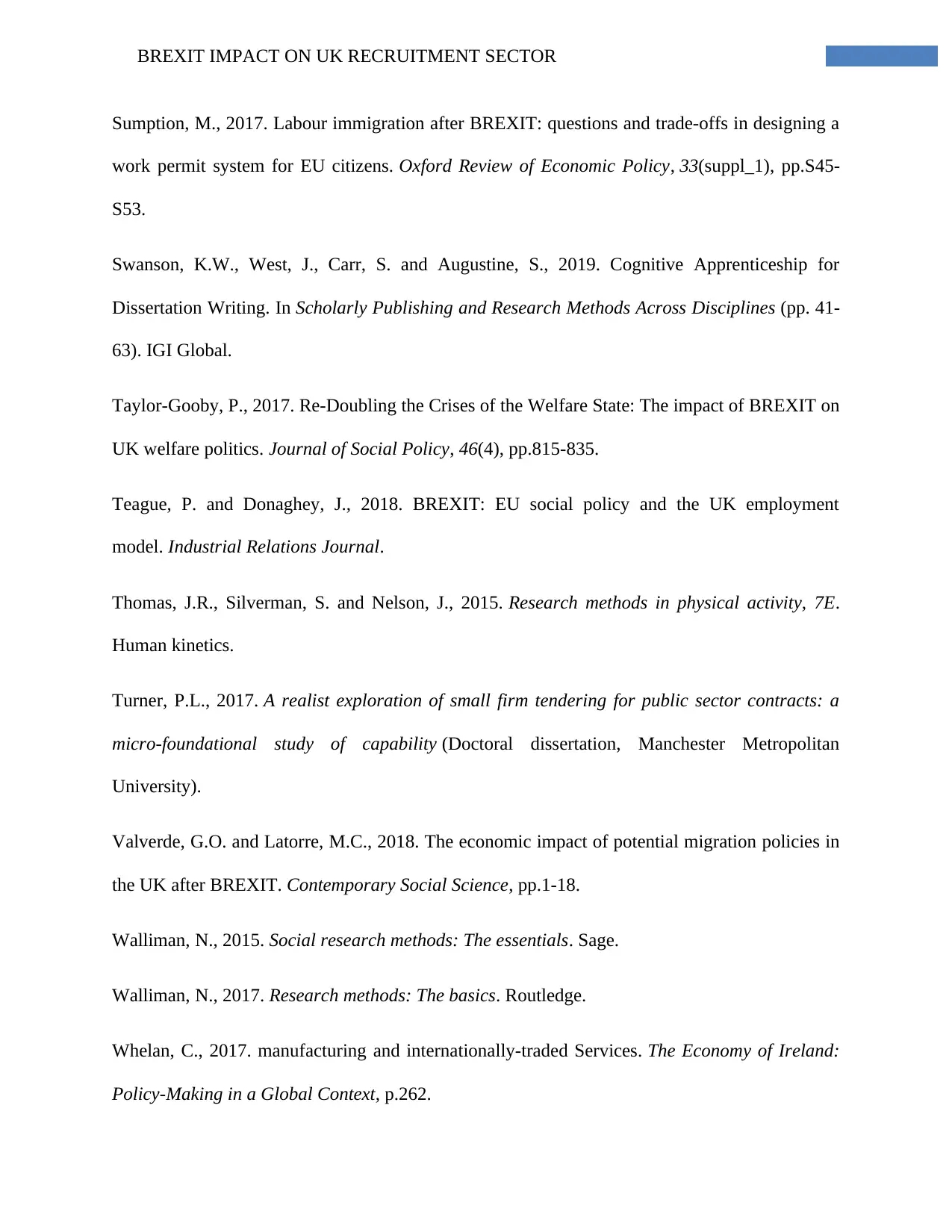
BREXIT IMPACT ON UK RECRUITMENT SECTOR
Sumption, M., 2017. Labour immigration after BREXIT: questions and trade-offs in designing a
work permit system for EU citizens. Oxford Review of Economic Policy, 33(suppl_1), pp.S45-
S53.
Swanson, K.W., West, J., Carr, S. and Augustine, S., 2019. Cognitive Apprenticeship for
Dissertation Writing. In Scholarly Publishing and Research Methods Across Disciplines (pp. 41-
63). IGI Global.
Taylor-Gooby, P., 2017. Re-Doubling the Crises of the Welfare State: The impact of BREXIT on
UK welfare politics. Journal of Social Policy, 46(4), pp.815-835.
Teague, P. and Donaghey, J., 2018. BREXIT: EU social policy and the UK employment
model. Industrial Relations Journal.
Thomas, J.R., Silverman, S. and Nelson, J., 2015. Research methods in physical activity, 7E.
Human kinetics.
Turner, P.L., 2017. A realist exploration of small firm tendering for public sector contracts: a
micro-foundational study of capability (Doctoral dissertation, Manchester Metropolitan
University).
Valverde, G.O. and Latorre, M.C., 2018. The economic impact of potential migration policies in
the UK after BREXIT. Contemporary Social Science, pp.1-18.
Walliman, N., 2015. Social research methods: The essentials. Sage.
Walliman, N., 2017. Research methods: The basics. Routledge.
Whelan, C., 2017. manufacturing and internationally-traded Services. The Economy of Ireland:
Policy-Making in a Global Context, p.262.
Sumption, M., 2017. Labour immigration after BREXIT: questions and trade-offs in designing a
work permit system for EU citizens. Oxford Review of Economic Policy, 33(suppl_1), pp.S45-
S53.
Swanson, K.W., West, J., Carr, S. and Augustine, S., 2019. Cognitive Apprenticeship for
Dissertation Writing. In Scholarly Publishing and Research Methods Across Disciplines (pp. 41-
63). IGI Global.
Taylor-Gooby, P., 2017. Re-Doubling the Crises of the Welfare State: The impact of BREXIT on
UK welfare politics. Journal of Social Policy, 46(4), pp.815-835.
Teague, P. and Donaghey, J., 2018. BREXIT: EU social policy and the UK employment
model. Industrial Relations Journal.
Thomas, J.R., Silverman, S. and Nelson, J., 2015. Research methods in physical activity, 7E.
Human kinetics.
Turner, P.L., 2017. A realist exploration of small firm tendering for public sector contracts: a
micro-foundational study of capability (Doctoral dissertation, Manchester Metropolitan
University).
Valverde, G.O. and Latorre, M.C., 2018. The economic impact of potential migration policies in
the UK after BREXIT. Contemporary Social Science, pp.1-18.
Walliman, N., 2015. Social research methods: The essentials. Sage.
Walliman, N., 2017. Research methods: The basics. Routledge.
Whelan, C., 2017. manufacturing and internationally-traded Services. The Economy of Ireland:
Policy-Making in a Global Context, p.262.
Paraphrase This Document
Need a fresh take? Get an instant paraphrase of this document with our AI Paraphraser

61BREXIT IMPACT ON UK RECRUITMENT SECTOR
Wright, M., Wilson, N., Gilligan, J., Bacon, N. and Amess, K., 2016. BREXIT, private equity
and management. British Journal of Management, 27(4), pp.682-686.
Yin, R. K. 2013. Case study research: Design and methods. Sage publications.
Wright, M., Wilson, N., Gilligan, J., Bacon, N. and Amess, K., 2016. BREXIT, private equity
and management. British Journal of Management, 27(4), pp.682-686.
Yin, R. K. 2013. Case study research: Design and methods. Sage publications.

BREXIT IMPACT ON UK RECRUITMENT SECTOR
Appendix
1.1 Research Questionnaire
1. Do you think the food and manufacturing industry in United Kingdom will be affected as
a result of BREXIT?
a. Strongly Agree
b. Agree
c. Neutral
d. Disagree
e. Strongly Disagree
2. Do you think a new free trade agreement with the European Union can protect the
processed food and drink industry competitiveness in the country?
a. Strongly Agree
b. Agree
c. Neutral
d. Strongly Disagree
e. Disagree
3. The mutual benefit of the European Union and the United Kingdom in trade cannot be
denied. Do you think a hard BREXIT policy will have a negative impact on this mutual
cooperation?
a. Agree
b. Strongly Agree
c. Neutral
d. Disagree
Appendix
1.1 Research Questionnaire
1. Do you think the food and manufacturing industry in United Kingdom will be affected as
a result of BREXIT?
a. Strongly Agree
b. Agree
c. Neutral
d. Disagree
e. Strongly Disagree
2. Do you think a new free trade agreement with the European Union can protect the
processed food and drink industry competitiveness in the country?
a. Strongly Agree
b. Agree
c. Neutral
d. Strongly Disagree
e. Disagree
3. The mutual benefit of the European Union and the United Kingdom in trade cannot be
denied. Do you think a hard BREXIT policy will have a negative impact on this mutual
cooperation?
a. Agree
b. Strongly Agree
c. Neutral
d. Disagree

63BREXIT IMPACT ON UK RECRUITMENT SECTOR
e. Strongly Disagree
4. Will taxation bill like tariffs and autonomous tariff suspensions give the British
Government an edge in free trade agreements with European Union?
a. Strongly Agree
b. Agree
c. Neutral
d. Disagree
e. Strongly Disagree
5. Do you think the devaluation of Pound after the implementation of BREXIT will affect
the food and the manufacturing industry of United Kingdom?
a. Strongly Agree
b. Agree
c. Neutral
d. Disagree
e. Strongly Disagree
6. Do you believe that the BREXIT has taken time away from the other business priorities
of the manufacturing firms?
a. Strongly Agree
b. Agree
c. Neutral
d. Disagree
e. Strongly Disagree
e. Strongly Disagree
4. Will taxation bill like tariffs and autonomous tariff suspensions give the British
Government an edge in free trade agreements with European Union?
a. Strongly Agree
b. Agree
c. Neutral
d. Disagree
e. Strongly Disagree
5. Do you think the devaluation of Pound after the implementation of BREXIT will affect
the food and the manufacturing industry of United Kingdom?
a. Strongly Agree
b. Agree
c. Neutral
d. Disagree
e. Strongly Disagree
6. Do you believe that the BREXIT has taken time away from the other business priorities
of the manufacturing firms?
a. Strongly Agree
b. Agree
c. Neutral
d. Disagree
e. Strongly Disagree
Secure Best Marks with AI Grader
Need help grading? Try our AI Grader for instant feedback on your assignments.
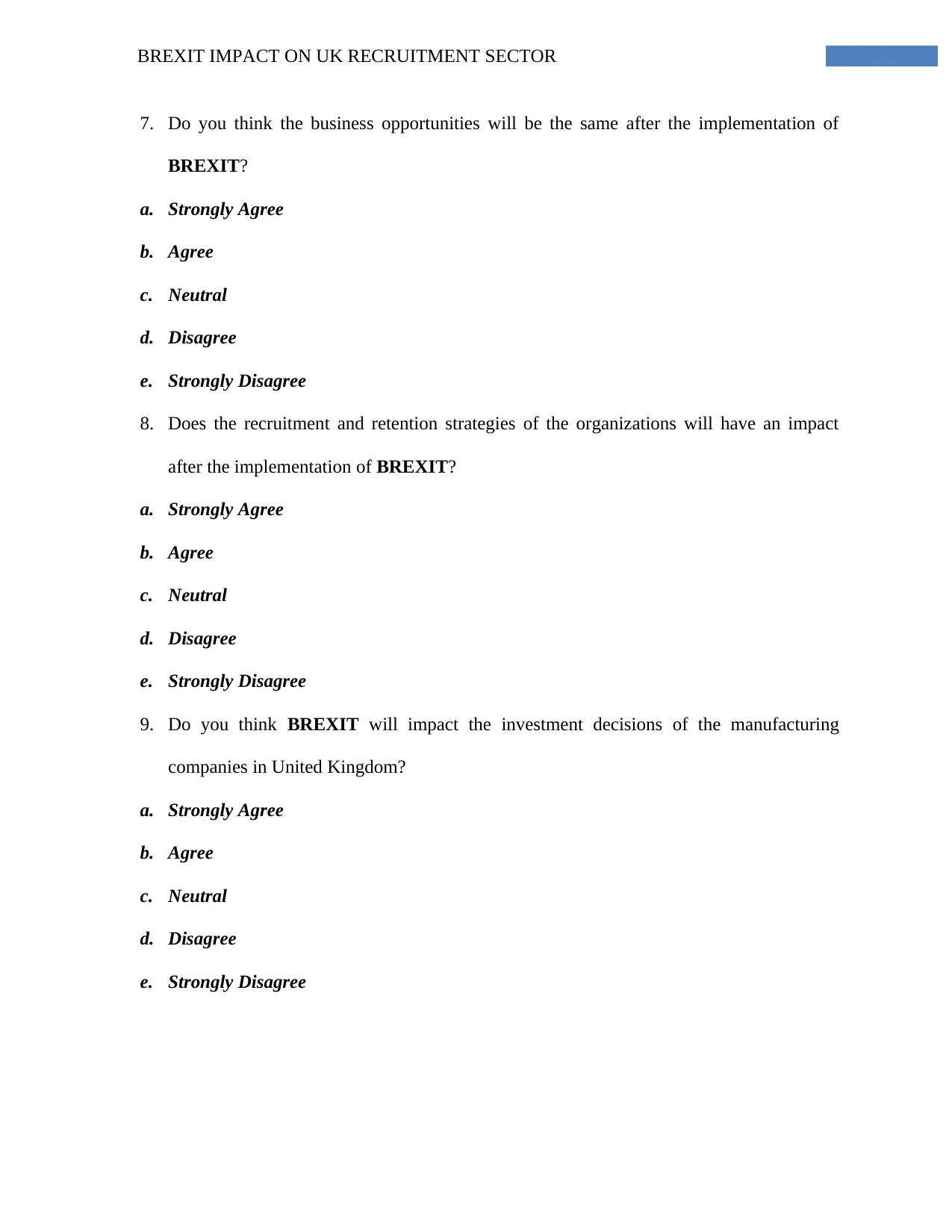
BREXIT IMPACT ON UK RECRUITMENT SECTOR
7. Do you think the business opportunities will be the same after the implementation of
BREXIT?
a. Strongly Agree
b. Agree
c. Neutral
d. Disagree
e. Strongly Disagree
8. Does the recruitment and retention strategies of the organizations will have an impact
after the implementation of BREXIT?
a. Strongly Agree
b. Agree
c. Neutral
d. Disagree
e. Strongly Disagree
9. Do you think BREXIT will impact the investment decisions of the manufacturing
companies in United Kingdom?
a. Strongly Agree
b. Agree
c. Neutral
d. Disagree
e. Strongly Disagree
7. Do you think the business opportunities will be the same after the implementation of
BREXIT?
a. Strongly Agree
b. Agree
c. Neutral
d. Disagree
e. Strongly Disagree
8. Does the recruitment and retention strategies of the organizations will have an impact
after the implementation of BREXIT?
a. Strongly Agree
b. Agree
c. Neutral
d. Disagree
e. Strongly Disagree
9. Do you think BREXIT will impact the investment decisions of the manufacturing
companies in United Kingdom?
a. Strongly Agree
b. Agree
c. Neutral
d. Disagree
e. Strongly Disagree
1 out of 65
Related Documents
Your All-in-One AI-Powered Toolkit for Academic Success.
+13062052269
info@desklib.com
Available 24*7 on WhatsApp / Email
![[object Object]](/_next/static/media/star-bottom.7253800d.svg)
Unlock your academic potential
© 2024 | Zucol Services PVT LTD | All rights reserved.





